In Nomine Game Master's Guide by Mors Rattus
| 1 | Post |
| 2 | Woooooords |
| 3 | :words: |
| 4 | Global Dynamics |
| 5 | Open Secrets |
| 6 | Split The Party |
| 7 | Thou Shalt Not |
| 8 | Jesus Fuckin' Christ |
| 9 | The Dar al-Islam |
| 10 | Ultima 8 |
| 11 | THE METATRON |
| 12 | Not Omnipotent |
| 13 | "Leer at everyone." |
| 14 | Shout at the Devil |
Post
Original SA post In Nomine Game Master's Guide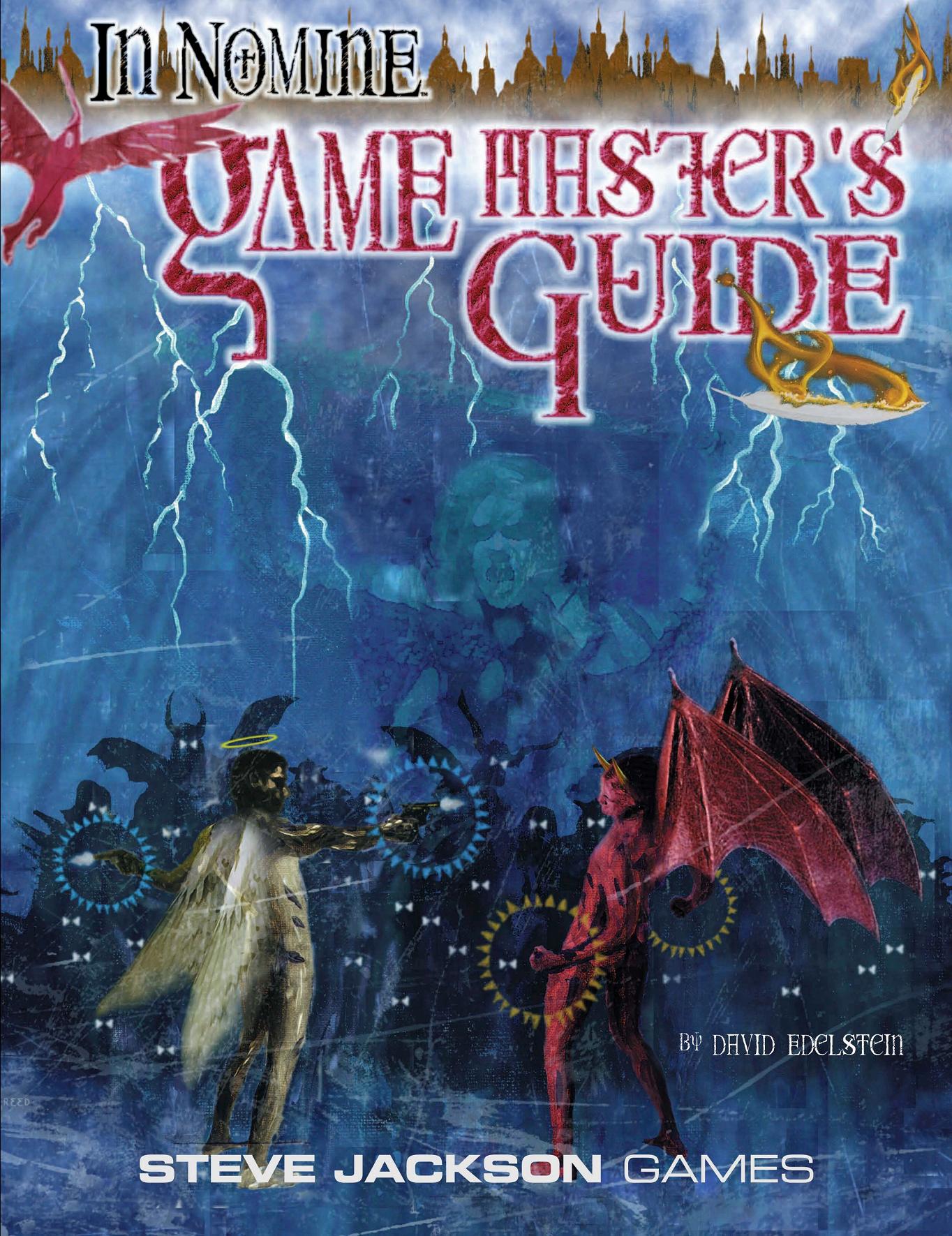
The GM's guide starts out with talking about power levels. 9 Forces is the standard starting point for celestials. Few angels exceed this in Heaven. In Hell, demons start at 7 Forces, and the ones above that are lucky and strong. 9 Forces is a powerful character, but still just starting on Earth duty. Older and more experienced celestials, like Seneschals, those with Distinctions or Wordbound, are often much more potent. A weaker starting PC might be one who was damaged or Force-stripped...or you can lower all celestias to start at 7 or fewer Forces. This will narrow the gap with humans, and Saints an undead are nearly equal to the celestials in that case. Truly potent celestials are rarer and more influential.
You can make PCs start out more powerful by just tossing some extra Forces on them - 12 Forces is basically mythic scale in every way. They can easily defeat pretty much any human, and any human PCs will be overshadowed. It is also recommended that, unless you're running a really political game or really like powergaming, don't allow PCs to start with Distinctions or Words and don't allow them to gain them quickly. You also need to decide if all celestials are more potent and godlike, or just the PCs.
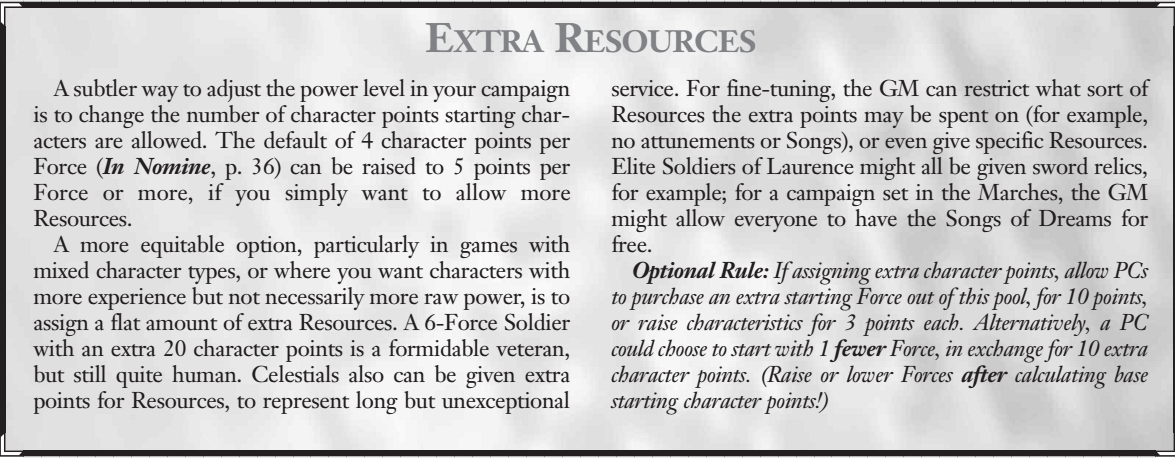
Most human PCs will be Soldiers, who get 6 Forces by default. With GM permission, however, you could play undead, sorcerers or Saints, covered in the Corporeal Player's Guide. Weaker humans are not really viable, but you might play 5-Force mundanes stumbling into the war...though be careful, as one celestial can basically wipe the floor with an entire team of mundanes. Soldiers might be a better adversary, especially if the PCs become Soldiers during play. More Forces will level the field a bit, but it makes the PCs far, far more powerful than most humans. 7-Force humans are rare, and 8+ are legendary. Undead and Saints are a bit more potent, but even so, they're rarely as powerful as a startin celestial.
The game then talks about handing XP/character points as advancement, both 'native' CP earned just by playing, and extra CP earned from successfully achieving Superior missions., as well as just having Superiors award things directly, rather than as bonus CP. They have a system for figuring out how much a Superior might hand out but let's be frank, it's super boring, as is most talk of punishment.
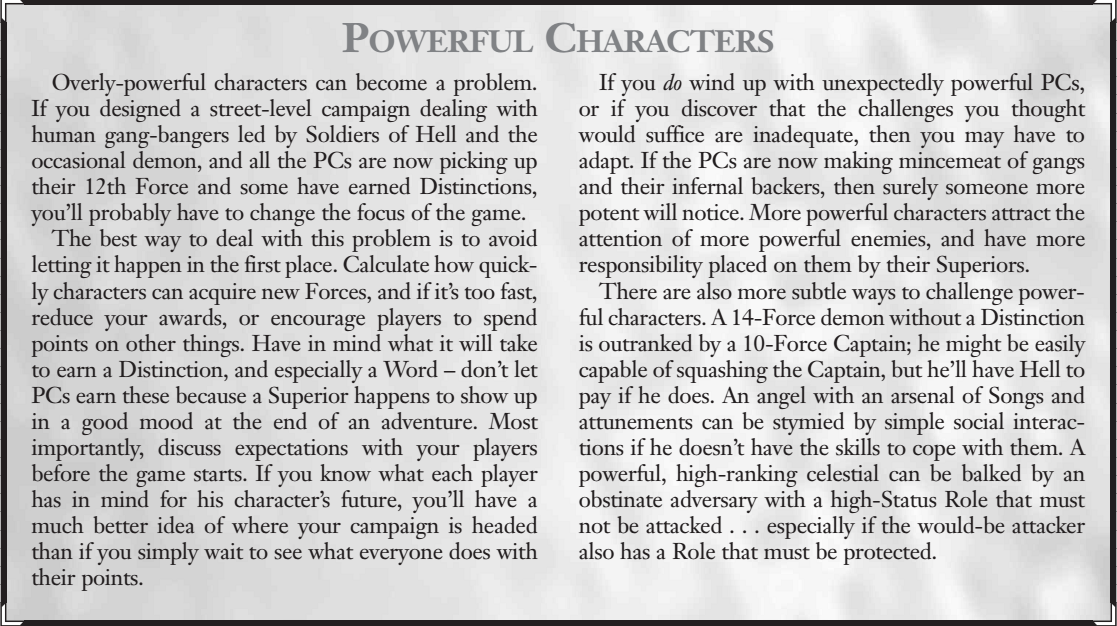
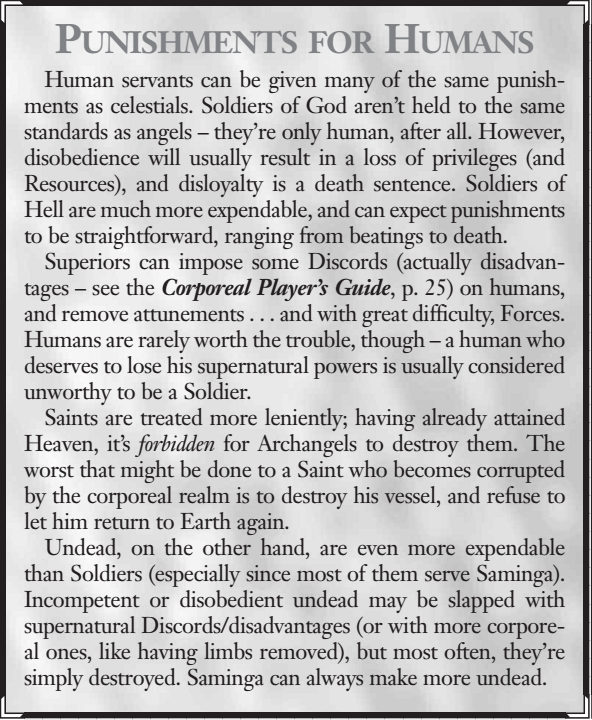
We get some talk about dissonance. Dissonance hurts . It comes from behaving in a way that is unnatural and unpleasant. Your dissonance conditions aren't tripwires - they're things you're supposed to dislike doing. Seraphim are truthful because they hate lies, not because it's inconvenient. Demons usually suffer dissonance from being reminded that the universe is greater than their own reality, in the form of trying to impose their symphony on others via resonance and failing. Likewise, Word-dissonance isn't because your Superior is constantly watching you. Rather, their Word is part of your nature, and acting against it is as unpleasant and painful as going against the nature of your Choir. Lesser Words don't technically have extra dissonance conditions, but anything the GM deems to be acting against your Word is potentially dissonant.
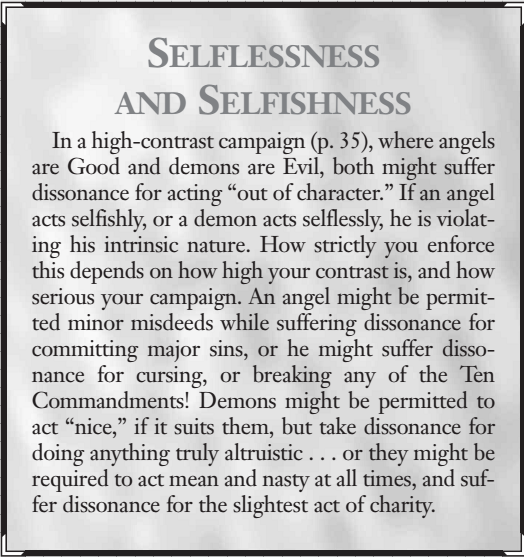
Any action out of tune with your nature is potentially dissonant - it's spirit, not letter. Celestials who skirt the edge of their dissonance conditions are messing with bad mojo. Seraphim that 'bend the truth' but don't technically lie, Elohim who rationalize too much, Impudites that walk off when they know a human was going to die but avoid being present for it...well, you get a sense in your gut that tells you you're doing wrong. It's up the GM if that's actually dissonance, but it doesn't feel good.
It's said that only Superiors can create a vessel, but that's not quite so. Anyone can learn to do it, as long as they have enough Essence and corporeal matter to animate. The trick is, you can't use any old clay, and it takes a lot of Essence. 15 points per level, multiplied by the total Forces of the prospective inhabitant - so it's 405 Essence to make a level 3 vessel for a 9-Force angel. The really hard part, though, is to breath life into the vessel. That's what turns it from a clay construct into a living vessel, and only Superiors know how to do that. It's rumored to be a secret Song of some kind, and only a Superior can attach a vessel to a celestial.
However, there are ways around this. Ethereals can create vessels via a sort of 'Essence cache' which isn't fully described in this book. Celestials in Limbo can also do this, described in another book. It even costs slightly less Essence - 15 points per level, multipled by the typical Forces that type of being would have, so a rat vessel at level 1 costs 15, and a human at 2 costs 120. Liber Reliquarum also has a substance, Primordial Clay, which is said to be able to make vessels. This is kind of the 'buy other books' part of this book.
Normally, a vessel does not age or get sick or tired, and it needs no food or water. Vessels are infertile and, unless you eat or drink, they don't have to excrete. They do, however, need to breathe. All vessels are assumed to be able to pass for whatever they seem to be even under thorough medical examination, despite the fact that in reality, advanced medical technology could probably detect their special traits. Vessels also don't need to be human - they can be whatever shape the Superior that makes them wants, even inanimate objects. Animal vessels get all the natural abilities of that animal, but not its instincts and skills. However, the GM might assign a bonus to certain activities, like tracking in a wolf vessel. All vessels can talk, but otherwise suffer all limitations of their form. You can also get vessels made with unusual or monstrous features, but they're rare.
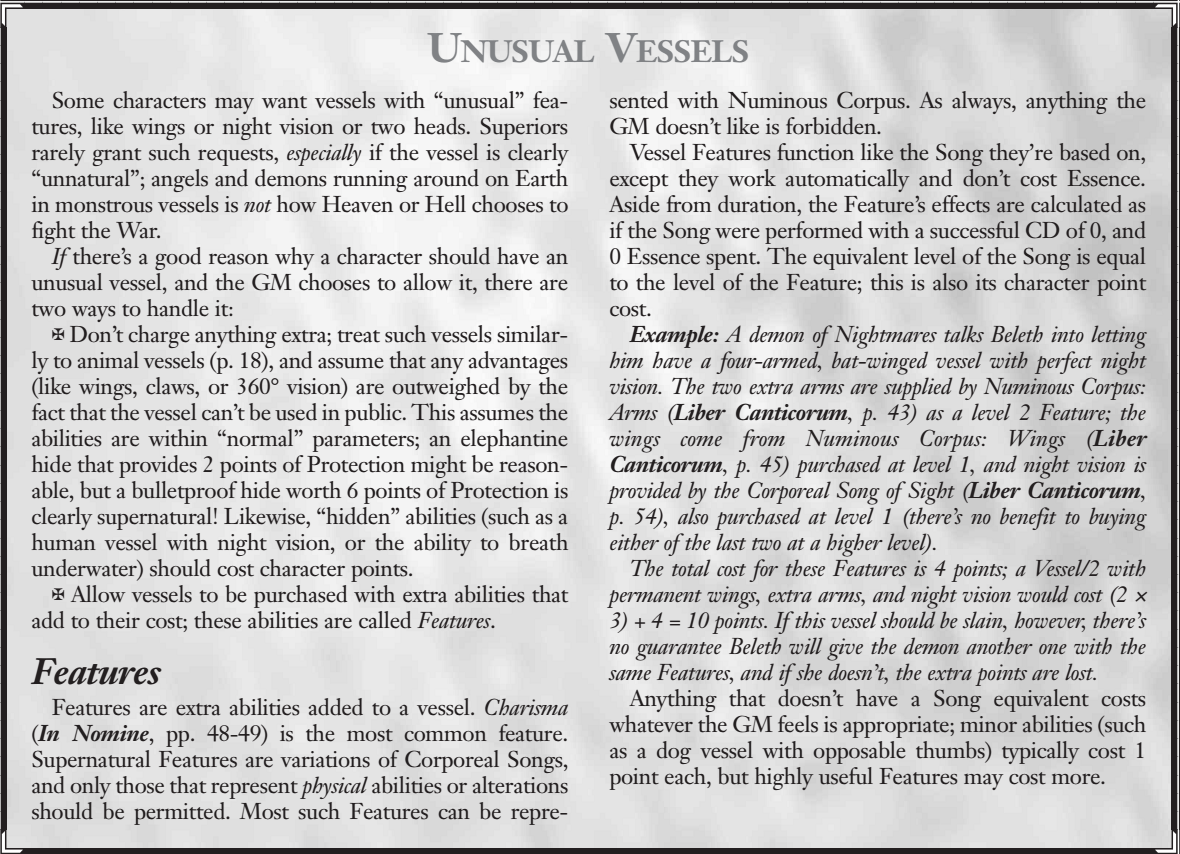
If you lose your vessel in the course of ensuring a mission succeeds, your boss will almost certainly replace it free...but if you just fucked up, you probably have to pay for it. Unless youre a Malakite. Malakim get a lot more leeway about dying, as long as they don't die for no good reason. If your boss thinks the loss of a vessel was avoidable, they might charge CP but not that total cost of replacement, or they might just shove a Corporeal Discord on you as a punishment.
Now, Words. A Word isn't a literal word, but a concept. It's something that exists. Human words just approximate what can only be truly expressed in celestial languages. Thus, while a word can be ambiguous, a Word is note. The Angel of Coke, a minor angel of David, oversees the petroleum byproduct of coal. He does not oversee cocaine nor Coca-Cola. Semantics do not change a Word's scope - it's an idea, not an English word. This doesn't mean Words are static, however. Semantic changes don't matter, but physical or conceptual changes do. A Word can change if it's tied to a concrete object or place - the object is the Word's manifestation, most often in the form of a Tether with a Wordbound Seneschal. If the place expands, so does the Word. If the object or location is destroyed, the Word becomes meaningless and the celestial tied to it will probably die. Words also represent concepts that humans can interpret in different ways, and humanity plays a critical role in the strength and manifestation of a Word. Novalis is literally the Archangel of blooming plant life, but also all metaphors linked to flowers. Thus, she embodies peace, beauty, joy and so on. If flowers symbolized violence, she would be a militant Archangel instead. Wordbound can sometimes expand their nature and scope by attuning to new interpreations, and sometimes they get forced to in ways they don't like.
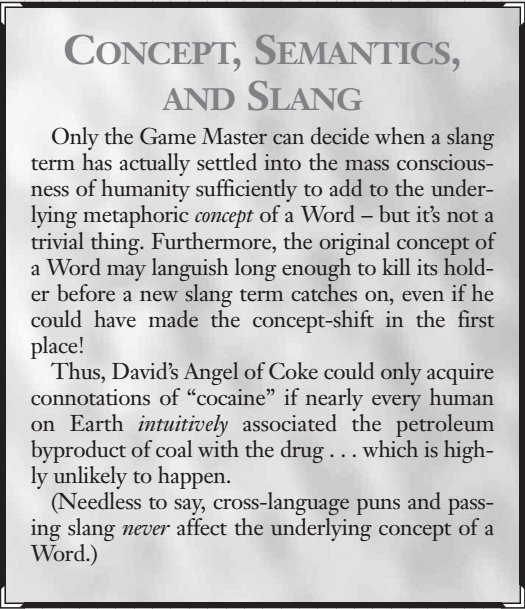
Words are...everything. Types of people, professions, ethnic groups, activities, places (generally but not always Tethers), phenomena, ideas, virtues, vices. The power of a Word is less about what type of Word it is and more its influence on the Symphony. The Deadly Sins are potent Words, and the Demon of Stiffing Waitresses is a very minor servant of Greed. Mosto f the power of a Word is also tied into how it's wielded. There's nothing that can't be represented by Words, though incredibly specific or obscure Words are rare because they're simply not need by anyone. Broad and extremely powerful Words, however, can sometimes only be handled by those with Superior potential.
A Word is a distinct chord in the Symphony, which a celestial is attuned to by either the Seraphim Council or Lucifer. Words do not define the Symphony - the Symphony defines Words. Not everything that could be a Word is assigned as one, however - Heaven and Hell prefer to only assign strategically useful Words. There's no Angel or Demon of Apple Juice, for example, as no one has sen any use in it. Even if a Word is important, though, someone suitable has to be there to represent it, someone who can be completely devoted to that Word. Celestials must be an expert on a Word before they get considered for it, and there's plenty of useful Words out htere that just don't have eligible candidates. The more important the Word, the harder it is to find the right celestial, which is why abandoned Superior Words usually remain unclaimed. Words can exist and even thrive without a Wordbound - Gluttony, for example, long predates Haagenti, and wile Oannes is dead, water still exists. If a Word grows or shrinks, any celestial bound to it will, also, but the reverse is not so - a Word does not weaken if the celestial holding it dies, nor does gaining a celestial make the Word stronger. It can seem to, because it's the job of a Wordbound to increase the presence and influence of their Word. Without Andrealphus, Lust will still exist, but it's questionable as to whether Western society would be so sex-obsessed as it currently is. Raphael's death did not end Knowledge, but many angels credit her for beginning the trends that led to the Renaissance and Enlightenment, and believe that humanity's increasing materialism is because there is no Archangel promoting the higher ideals of Knowledge. Most Words can be taken as either Heavenly or Hellish, and important Words are rarely left to one side - any Word with major impact will be countered, though not always with a shared Word. Instead, a related Word might be assigned to oppose the neemy. Many believe that the reason the media's so terrible is that Heaven has yet to effectively find a counter to Nybbas.
Next time: Big Words
Woooooords
Original SA post In Nomine Game Master's Guide: Woooooords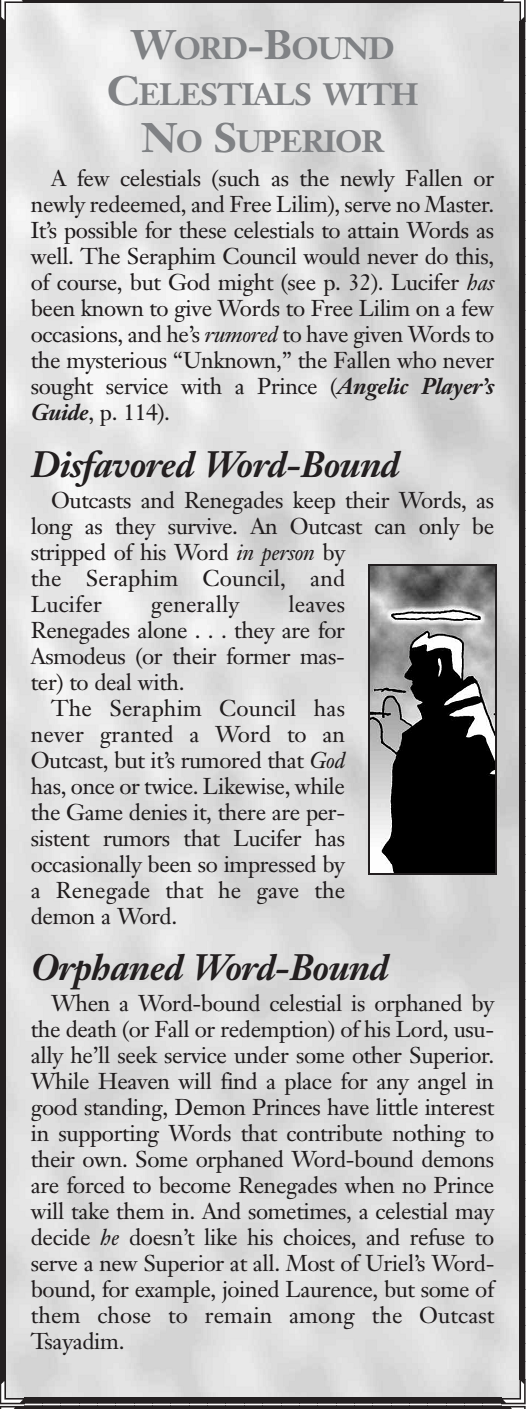
M<ost Words are subsets of larger Words - Choking on Chicken Bones, ofr example, is a subset of Choking, which falls under Death. The most potent Words encompass broad themes, as with the Superiors. Because they have such a broad scope, many Words could theoretically serve multiple Superiors. The Demon of Choking on Chicken Bones could as easily serve Kobal as Saminga, and your Superior is going to determine how you interpret your Word. As Dark Humor, the Demon of Choking on Chicken Bones is going to focus on causing humorous choking incidentas. As Death, they're goign to just be trying to choke as many humans to death on chicken bones as possible. There is often competition over powerful Words...and in Hell, for unimportant ones. Saminga may never have actually wanted the Word of Choking on Chicken Bones, for example, until he learned that one of Kobal's demons was seeking it. How these conflicts are resolved depends on the Superiors' relationships. Sometimes they'll make a deal or play politics, and often there will be a contest to prove worthiness for the Word. It is forbidden for Superiors to intefere in these contests and it's considered bad form to destroy a celestial just to free up their Word - but even so, it can be hazardous to hold a Word that a Demon Prince wants. They'veb een known to cheat, or engineer the downfall of rival Wordbound. Wise celestials ensure their Superior fully backs them or else try to make deals with rival Superiors before going for a contested Word. In extreme cases, a Wordbound might even switch masters, before or after getting the Word. (Usually before.)
Wordbound are each unique, and no two Words provide the same benefits, but their power can be quantified as Word-Forces. These are an abstraction of the power the Word brings. For game purposes, a Word has a certain number of Forces based on its strength, and as the Word grows or shrinks, the holder can gain or lose Word-Forces. Word-Forces are added to your total Forces, but only for the amount of Essence you can store and the amount of Disturbance you make when entering or leaving Earth or changing vessels. However, in celestial combat, you may choose to lose a Word-Force rather than one of your own Forces, representing weakening connection to your Word. Word-Forces do not grant any additional stats or CP or add to any rolls.
The number of Word-Forces indicates the strength of the Word, but celestials can only estimate it. Only the Word-holder knows exactly the number of Word-Forces they have. It's rare for a Word's Forces to vary outside certain ranges, however, unelss the Word suddenly surges or drops in power. The GM is the one that assigns a Word's strength, of course. New Wordbound start, normally, with the lowest number of Word-Forces for a Word of their strength - if that. Even with a thriving Word, it takes time to align yourself with its potential and interpretations.
Trivial Words have 1-3 Word-Forces. They're nearly superfluous, and unless they're assigned for special reasons or to indulge an obsessed servant, they're rarely seen. Hell has more than Heaven, as per its quantity-over-quality strategy. Examples include Choking on Chicken Bones, Goth Wannabes, Hot Sauce, Nightmares About Rabid Dogs, Stale Bong Water, Unexpectedly Short Fuses and very small and weak Tethers.
A minor Word grants 4-6 Forces, and it's usualyl something that most people have heard of but which is unlikely to impact their lives very much. Often these Words are stepping stones to higher and more responsible Words. Examples include Barbie Dolls, Falcons, Lies Told To Spouses, Nannies, Outdoor Sex, Pipe Bombs, Writers' Block and small Tethers.
Significant Words, with 7-10 Word-Forces, are those that are widespread, though still probably not with daily impact on most people. If the Word disappeared form the world, there would be quite noticeable effects, and under the right condition they can be very powerful. Examples include Air Disasters, Birds of Prey, Bombs, Highways, Police, Serial Killers, Ships and the average Tether.
Important Words have 11-15 Word-Forces. They are common throughout the world. Not everyone encounters them all the time, but almost every human will be touched by them at least indirectly, and many lives can be devoted or destroyed by them. Examples include Artists, Birds, Haggling, Kings, Nuclear Warheads, Poison, Repentance, Suicide and strong Tethers.
Major Words are those with 16-20 Word-Forces. They're always present on Earth, either part of nature or part of humanity. A world without one of these Words would be drastically different, and celestials bound to them could approach Superiors just in raw power, and might theoretically become Superiors, though most will not. Examples include Blame, Cities, Courage, Earthquakes, Enlightenemnt, Final Judgment, Music, Wisdom and the most powerful Tethers.
Superior-grade Words are those with over 20 Word-Forces. However, getting that many doesn't make you a Superior - that's a leap in power that requires the aid of Lucifer or the Seraphim Council. However, a Word of this power must be critical in the War, intrinsic to the Symphony or inseparable from humanity. Angels of this level of power will be considered for Archangel status, while demons will either be made Princes or destroyed.
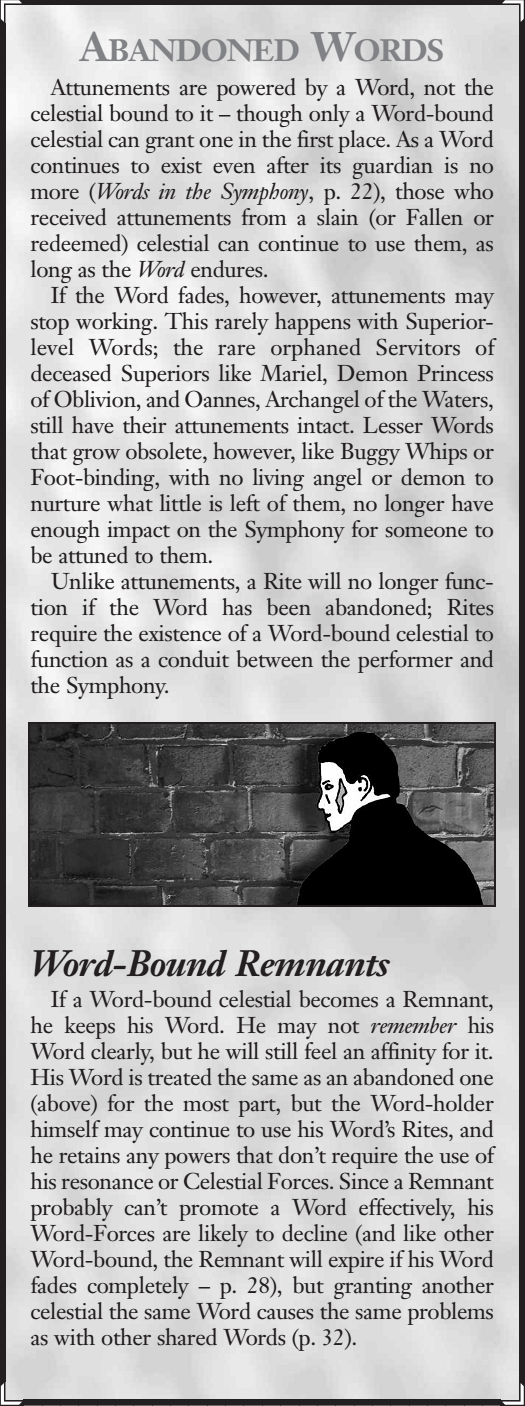
Words also grant powers to their holders, which should be personalized for each Wordbound but will fall into several general categories, which the game uses as suggestions fo the GM and players. Every Wordbound should gain at least one special ability related to their Word, with power proportionate to it. For example, the Demon of Hot Sauce might be able to increase the spiciness of any hot sauce they see at will, while an important Word would give more useful powers, on the level of a servitor attunement. For example, the Angel of Courage might be able to let anyone ignore fear at a touch. As a general rule, you should have around one ability per 5 Word-Forces or fraction thereof, with stronger Words getting more potent abilities.
Some of the more powerful Wordbound can grant actual attunements to others - the Demon of Sorcery, for example, can give her Infernal Pact attunement to other demons, allowing them to gift Sorcery to humans. This sort of ability requires at least 10 Word-Forces. The Essence cost of giving an attunement is equal to the target's total Forces. A Wordbound can retract any granted attunement with a touch and the same cost in Essence as granting it. Every time an attunement is used, ti draws on the power of the Word. Uses that support the Word have neutral effect, but those that diminish the Word can weaken the Word substantially. For example, Dominic's Incarnate Law attunement, used to find loopholes and break the law, will weaken Judgment and anger Dominic. It would take many such abuses to have any notable impact on a Superior's Word, but minor Wordbound are under more severe threat. Someone who uses Infernal Pact to create 'white sorcerers,' who use their powers to achieve destinies instead of fates, could cause loss of Word-Forces to the Demon of Secrets with each such sorcerer. Thus, Wordbound are rarely generous with their attunements.
Every Wordbound also receives at least one Rite they can use to gain Essence from their Word. Powerful Words may have several ways. In general, one Rite per 5 Word-Forces or fraction thereof is appropriate, but the Wordbound must learn how to do them - they don't come automatically just because the Word gains Forces. Likewise, a clever celestial might find many ways to milk Essence even from a minor Word. The GM may allow multiple Rites, if the characters spends time researching them. It's recommended that for PCs, each should cost 3 CP after exploration and study. A Word never has more Rites than it has Word-Forces, and rarely has Rites that give more than 1 Essence. These would count as multiple Rites. Wordbound can gift their Rites to others, but again, every performance of the Rite generates power to strengthen, weaken or alter the Word. Normally, a Wordbound's Rites draw on their Superior's Essence, but those who have lost favor and been Cast Out will instead fuel Rites with their own personal Essence pool.
As the strength of a Word grows and shrinks, so does the wielder's power. This applies to every Word. If a Word no longer exists, its holder almost always dies. Some Words are strong enough to maintain themselves with little maintenance, but few Wordbound will ignore their Words, even if the Word is stable. Heaven and Hell are always trying to degrade each others' Words, after all. IT's one of the most common tools of the War. A Wordbound who doesn't pay attention might be suddenly weakened or twisted. The Demon of Pipe Bombs, for example, spends a lot of time of the internet, posting instructions on the care and handling of explosives, to ensure he notices when divine agents bring down the sites and email lists where this information can be found. Outside the Internet, others might attack his Word by making pipe bombs seem less cool to angry teenagers or tightening legislation to make them harder to make. The more potent a Word is, the more it takes to strengthen or weaken it. A trivial Word can gain a Force with one highly public event - when a really famous person dies choking on a chicken bone, for example. More potent Words take more - the Demon of Suicide gets a small boost when a celebrity kills themselves, but rarely a full Force, even temporarily. Highly publicized mass suicides like Jonestown or Heaven's Gate might give a temporary Word-Force, but only a steady increase in the occurence and acceptance of suicide will give a reliable increase in power. Superior Words never change noticeably from any single incident, and rarely fluctuate over the course of less than a year.
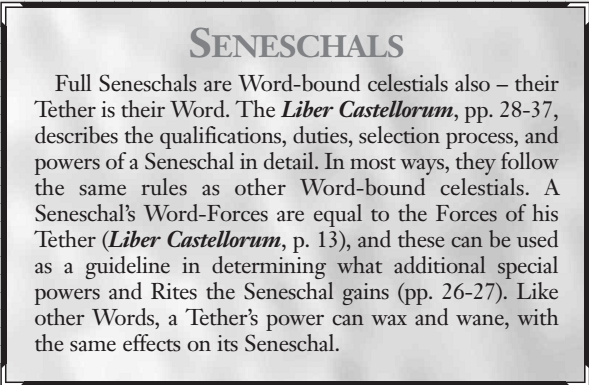
The GM decides when a Word gains Forces. Word-Forces can't be gained by CP expenditure - they're rewards for good roleplaying at the end of adventures that significantly advance your Word, or long periods of diligent Word-promotion. The more potent a Word gets, the higher the GM's standards should be. Gaining enough Word-Forces to move to the next category only happens if the Word's importance in the War reaches that level. Minor Words need relentless promotion and increased presence to become significant, and to become important would require some sort of social, technological or ideological revolution.
When a Word loses Forces, it is either by becoming less influential or by being twisted from the holder's interpretation. Belial seeks to weaken Gabriel by making Fire a symbol of only destruction, obliterating its inspirational aspects, that he might gain power from the Word and deny it to Gabriel. Likewise, both the angel and the demon of Cities gained Word-Forces as cities became more common and larger, and would lose Word-Forces if they were abandoned in alrge numbers. However, the Angel of Cities can gain Forces while weakening her rival if cities become cleaner, more civilized and did more to promote divine lifestyles, while the demon would gain more at her expense if cities got more polluted, crime-ridden and corrupt. It's up to the GM to decide when this happens, but any celestial that doesn't promote their Word will suffer a decline at some point, especially if the opposition is trying to weaken the Word. A disastrous failure can also cause lasting decline, though only a truly serious decline in influence can permanently drop a Word to a lower level of strength. Losing Word-Forces can rmeove your special powers and even your Rites, so many celestials struggling to preserve a Word will sacrifice themselves to save the Word. Just as you can choose to lose Word-Forces in celestial combat, you can also choose, when you would lose Word-Forces, to give up one of your Forces randomly instead. You cannot gain personal Forces instead of Word-Forces, however. And yes, any loss of personal Forces to prevent a temporary loss of Word-Forces is still permanent.
Loss of Word-Forces in celestial combat can result in loss of Word-based powers, but doesn't diminish the Word itself - just your connection to it. It's slightly easier to recover from such a loss, as Word-Force gains that would be temporary become permanent until you return to your normal Word-Force level. However, any loss of Word-Forces threatens to strip your Forces. Whenver a Wordbound would lose Word-Forces, except by voluntarily losing them in celestial combat, they must make a roll at TN of their total normal Forces. Essence can be spent, but the maximum TN is 12 - no automatic success here. Failure means you lose a personal Force and a Word-Force. If your Word-Forces exceed your normal Forces, then even on a success, your CD must exceed the difference between them after the loss of the Word-Force, or you still lose a normal Force. If a Word falls to 1 Word-Force, every subsequent loss of Word-Forces automatically strips a personal Force instead.
Usually, you can only lose a Word by dying. You can't give it up even if you want to, save by Falling or Redeeming, and a Superior can't remove a Word even from their own servant. The Seraphim Council can strip a Word from an angel in their presence, and Lucifer can do the same to a demon, though it's unknown if either could strip a Superior's Word. Neither do it often. OCcasionally, a Superior will beg them to remove a dying Word, especially a destroyed Tether, and will keep the Wordbound alive with donated Forces to replace the ones being lost until the Word can be stripped. Even so, these unfortunates are never the same. They were once intimately tied to the Symphony, and now they feel a profound sense of lost and failure. Often, it would be more merciful to let them die...which is why some Princes don't.
Next time: Small Words
:words:
Original SA post In Nomine Game Master's Guide:
On top of their normal Word and Choir dissonance conditions, Wordbound can become dissonant by acting against their own personal Word. This is at the GM's discretion - lesser Words do not have specific conditions like Superior Words. However, the GM can also rule that acting against the Word causes loss of a Word-Force, instead. Servants of the Wordbound are not, however, constrained by this. Only Superiors impose dissonance conditions on their servants.
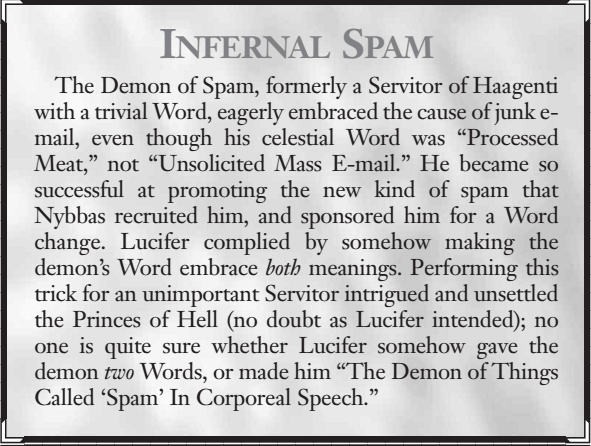
For most Wordbound, changing their Word is unthinkable - it's what you are, after all. It's all you can think about it. Theoretically, a Wordbound could be stripped of one Word and granted another, but neither the Seraphim Council nor Lucifer would be likely to grant such a request, and few Wordbound would ever ask. Lucifer is known to have changed Words occasionally for his own reasons, however. There are, however, two common situations in which a Word can be changed, and a third less common and less positive one.
The first situation is Word-promotion. Most Words are part of a hierarchy - Falcons serves Birds of Prey serves Birds serves Animals, for example. Getting a greater Word that contains your old one is not changing your Word, just broadening it, and that's often how important Words gt filled. The Demon of Hot Sauce, were he not such a terrible demon, might eventually have become the Demon of Sauces and aspired to be the Demon of Condiments, for example. The Seraphim Council or Lucifer are both still required to promote a Word, but this is more routine than granting a Word - if a Superior says that the Word shoudl be upgraded, they usually get it. The exception is if the candidate is controversial or there's someone else who might want the same new Word - the Demon of Air Disasters might seek to become the Demon of Vehicular Accidents, but Vapula might contest Saminga for the Word.
The second situation is reinterpretation. Sure, semantics can't alter a Word, but perception can. If the Demon of Buggy Whips had been more creative before his death, he might have shifted from Technology to try and push the word towards Lust by focusing on sexual uses of buggy whips. Reinterpretation of a Word is not easy, and it depends a lot on your being clever and a adaptable. Demons tend to be better at it, especially Balseraphs. For example, the Demon of Forged Signatures once only encompassed handwriting, but is now growing in power due to his taking an interest in applications of digital media and encryption, and is considering if he might be better off under Vapula than Valefor. If he were less forward thinking or computer literate, he'd never have been able to take advantage.
The third situation is Word-shift. Angels and demons regularly try to undermine each other, but it's subtler to attack a Word by changing how the human race interprets it - it's basically an involuntary form of reinterpretation. Theoretically you could also change how a Word physically manifests, but turning every flower on Earth poisonous, while it would alter Novalis in major ways, would be highly impractical. If a demon were to launch a campaign to make Flowers a metaphor for apathy and anti-illectualism and succeeded , Novalis would be forced to either embrace these new aspects or lose power by rejecting them and contracting her Word. Corrupting a Superior Word this way is quite difficult thanks to conceptual inertia and their many servants to help counteract that sort of thing, but lesser Words are much easier to target, which is why even a very strong Word needs maintenance against the enemy.
Only God (rarely) or the Seraphim Council (more often) can give angels Words, and only Lucifer can give them to demons. Not every possible or desired Word will be given - a Superior might not sponsor you, or Lucifer or the Council might not grant the Word. Besides, few celestials are competent and trustworthy enough to become Wordbound. Every Superior has more Words they'd like than servants worthy of them. Frivolous Words are a waste of a celestial. Jordi, thus, does not assign every species as a Word, even if extinctions din't promise a regular loss of them. However, Mammals, Birds, Reptiles and other families are huge portions of his Word, and he'd rather leave them vacant then have them held by angels that will weaken them. Assuming a Superior will sponsor you, though, there's still some requirements.
Angelic Words strengthen the Symphony and Heaven's cause. Usually they are benevolent, if not necessarily fitting human ideas of morality. (Abortion, Vengeance and Teenage Death are all angelic Words.) The process of seeking a divine Word is covered in more detail in the Angelic Player's Guide, but essentially: you get chosen by your Archangel, then defend yourself before the Seraphim Council against anyone that would challenge your candidacy or compete with you, and then probably go on a quest to prove yourself. Succeed, you get the Word. Before you can be considere,d though, you probably need to meet some qualifications. Every Archangel has their own requirements, which can be more or less rigid, but there are certain standards. You need to be strong enough t support your Word, and angels are expected to have as many Forces as their Word's Word-Forces at the least, and few angels under 12 Forces ever get Words. Further, you will need to be absolutely loyal and devoted to your Archangel, and most of the time, you'll need a Distinction. You must not have any dissonance or Discord.
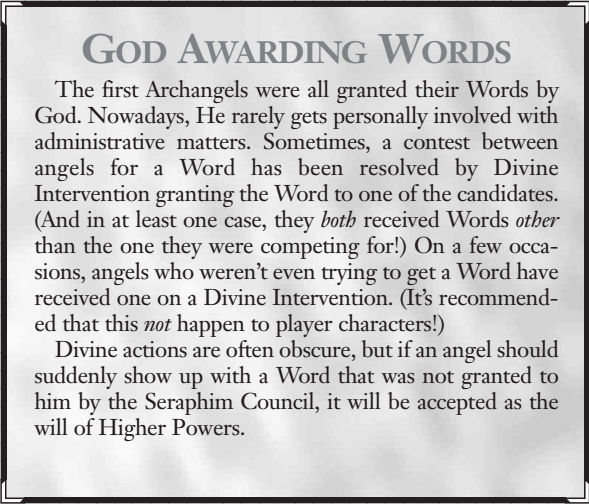
Infernal words are selfish. They may not be evil, and some can even be interpreted benevolently, but they must in some way serve Hell's cause, even if only in an obscure manner. Most Words are sponsored by a Prince, and a prospective Wordbound must first campaign to get their support. Princes only sponsor loyal demons, but as demons are more expendable than angels, weaker Words can often be granted to weaker demons, though significant ones are rarely given to any demon under 12 Forces. If you survive and grow, all to the good. If not, you can be replaced. Princes rarely sponsor demons for Words they don't want - it's a really bad punishment, as Wordbound can cause problems far out of proportion to their actual power. Likewise, Lucifer doesn't grant Words to demons not fit for them.
When you hold a Word, you become that Word, and so sharing it is like sharing the same identity. There's two ways to share a Word, and both have problems. First, diametric opposites. Angels and demons are diametric opposites, and so they can hold the same Word in subtly different directions. The Angel of Cities can 'feel' the presence of the Demon of Cities as a warped manifestation of her Word, and vice versa. It is possible for them to coexist and even cooperate at times to promite the Word, but each owuld be happier and more powerful if the other didn't exist. The clearest case of this Word-friction is between Gabriel and Belial. Gabriel has gone mad in part by the constant usurpation of Fire, while Belial can never forget that Gabriel embodies everything he is and more. Thus, Heaven and Hell are very careful about assignign Words that hte other side already has. It's a great burden, especially for someone outmatched by the other side, and certainly neither side will ever pit a mere servant against a Superior - the Word-friction would drive them mad in short order.
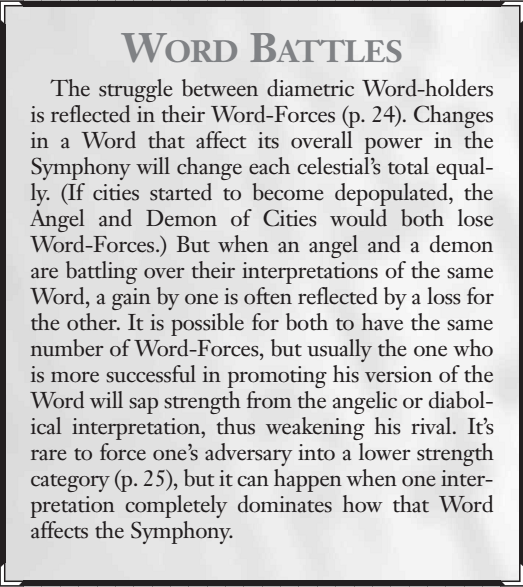
The other situation has happened exactly once: a Word being shared by two celestials of the same side. Daniel and Hutriel, the Angels of Final Judgment that stand at the gates of Hell, are nearly as potent as an Archangel when combining their strength, and their Word-Forces are a common pool both can draw on and use. This requires complete and total trust and reliance on each other. Lucifer could probably do the same thing, if he could find two demons able to selflessly share a Word, but also serve it well. This is exceptionally unlikely.
The next section is about campaigns and the various knobs you can fiddle with. First up: Mood. People bring assumptions to a game, and the mood you set will determne what kind of game you get. The three major factors in mood are Contrast, Brightness and Humor. Contrast is about good vs evil. Heaven paints the War that way, while Hell says it's about individuality vs tyranny. Usually, angels are the forces of light and demons are darkness, but neither side has to be monochrome. Angels can be vicious assholes, demons can by sympathetic. Both sides can question if they're right. Contrast is about the real or apparent differences between Heaven and Hell. At one extreme, it's black and white, the line of good and evil clearly drawn, and angels or demons never cross it but to switch sides...though that need not mean Heaven's the good guys. They might, in fact, be the ruthless authoritarian regime crushing free will and thought. Either way, angels are always angelic, demons always demonic, whatever that means for your game. The other extreme is solid gray - an angel or demon could be nice or nasty, with no bias either way. Heaven and Hell are just two different points of view, possibly differing only in scenery. It's more of a political party deal than a moral one, and both sides span good and evil widely. Sympathies with the other side are much more likely. The sharper the contrast, the harder it is to play a mixed game. The blurrier the lines, the more angels and demons have in common and the more often they'll get along.
Brightness is probabl the most important mood setting, since it determines how optimistic the world is. Bright need not mean angelic - that depends on contrast and your portrayal of Heaven and Hell. If demons are freedom fighters against angelic automata, then a bright setting has demons confounding Heaven and liberating humanity from slavish obedience, and a dark one is one in which angels ruthlessly purge free will and independent thought. Brightness is a measure of if humanity is winning or losing, not either side. In a very dark setting, the world is miserable. Either the 'good' side is losing badly, or all Superiors are cruel tyrants and there's few good options. A very dark campaign features the worst aspects of Earthly life, and are likely to be very depressing. At the other extreme is a very bright setting. Humanity is either benefiting or not affected by the War. If angels are good, they're kicking ass. If they're bad, they're ineffectual idiots. If the contrast is low, celestials on both sides conspire to keep the extremists from taking over.
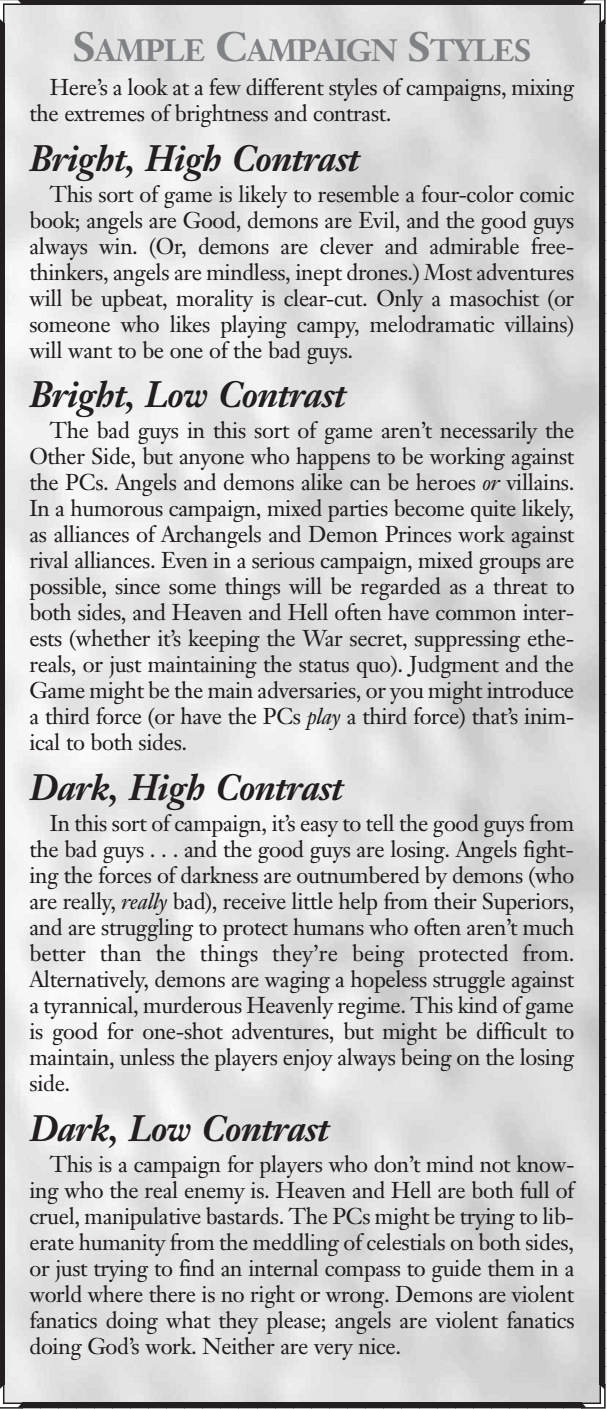
The final knob is Humor. In Nomine can be serious, campy or satirical, regardless of brightness or contrast. If you want angels and demons taken seriously, you have to treat them that way. For deep exploration of theological issues and mythic archetypes, you ahve to work hard to keep parody out, which can be hard - In Nomine is by its nature not totally serious. You'll probably want to alter some of the more jokey Songs and attunements, and change or eliminate some Superiors. A serious campaign need not mean characters have no sense of humor, though - just that the War must be played straight. Putting humor in is easy - just leave it all as is and play it with a straight face. The subtlest humor is just acceptance of the utterly absurd premises some Superiors operate on. The characters take themselves seriously, but the situations are insane. For satire or campy parody, take the gags to the extreme. The Superiors take themselves deadly seriously, but the street level angels and demons know it's all absurd. You might introduce even jokier powers or Superiors.
Once mood is determined, you have to figure out setting. Most commonly, this will be local - a city or even a single country. The smaller the locale, the easier it is to fill in details. Most angels and demons are assigned to a small area they're expected to get familiar with and strengthen their Superior's Word in. Some get missions, others just left to do it as they see fit. The most important part of a local setting is Tethers. They are the decisive factor in whic Superiors are most locally influential and how many celestials are around. A city with many Tethers is a hotbed of activity, but one with few or none is either a backwater or a battleground for claiming territory. If you have a friendly Tether in the area, the PCs have direct support of many kinds, even the ability to work off dissonance. Same if the enemy has them. Small cities tend to average one Tether on each side, while cities with over a million people might have several. This is just averages, though - a city might have between 0 and a dozen, depending on the needs of the game. Every Tether should have a history, even if it isn't famous, though, and you should know how strong it is and what resources the Seneschal has.
You will also want to set up local personalities - prominent politicians, businessmen and celebrities, plus any other interesting characters you like. You may be able to use real people for some stuff, but you'll need to make up others for various roles anyway. The most important people are those that can affect the PCs, especially if they're involved in the War. Some might be Soldiers or celestials with a Role, but make sure the War doesn't take over the mundane setting - not every influential person works for Heaven or Hell. You will also want to decide who the local celestial powerhouses are besides the PCs, especially if they have Words or Distinctions.
Celestial politics may not play a large part in your game, but they'll often shape corporeal settings. Few areas are evenly balanced by Heaven and Hell, and usually one side has advantage to varying degrees. Likewise, most Superiors are not balanced in even the largest cities. You need to pick which Words are most active in an area, and how strong their positions are, to determine how much help the PCs have available and what enemies they'll run into. The overall politics can also be altered on small scale. Austin, for example, has a sorto f truce between Heaven and Hell, while in demon-run LA, angels are more cooperative out of necessity. Who the local powerhouses befriend can also alter politics - if the local Baron of Fate is friends with a Captain of Dark Humor, their servants probably get on better even though Kobal and Kronos hate each other.
Next time: Global games.
Global Dynamics
Original SA post In Nomine Game Master's Guide: Global DynamicsA global campaign is one of world travel, with the PCs going wherever they are needed. This provides variety, but it's hard to develop the setting for each adventure. In a global game, local personalities aren't as important - your recurring NPCs are likely to be powerful, globally influential people or other traveling field agent allies or nemeses. The former are almost certain to include those with Words or Distinctions, and to give direction, perhaps the PCs work for a ranking Wordbound as well as their own Archangels - some kind of joint task force. You'll also bneed to work up profiles for the most important NPCs anywhere your PCs go - plot-related folks, plus less detailed local Seneschals and Wordbound.
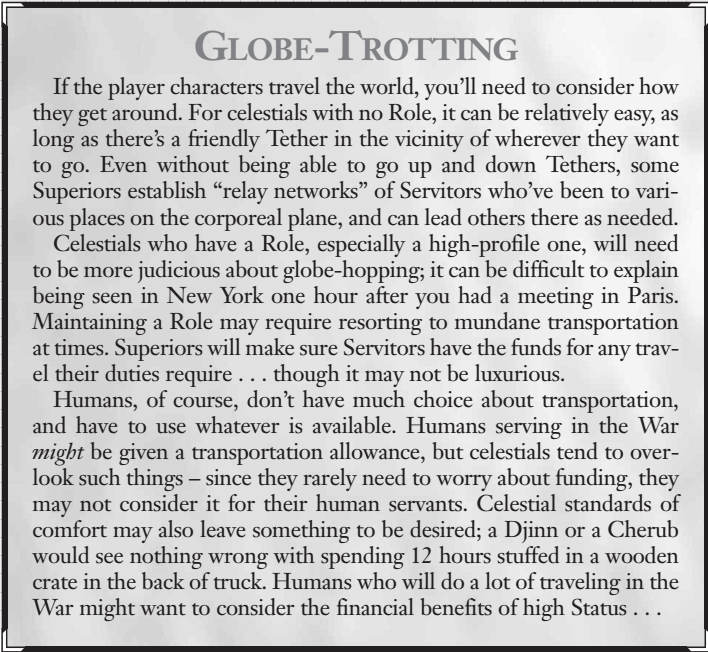
Global politics matter more in a global campaign than local situations. You care about the ig picture here, and often will have trouble dealing with local political wrinkles. The GM must decide how the War is going overall and which Superiors are on the rise or decline. Angels of different Words will react to each other primarily based on standard Superior relations unless given reason to act otherwise. Hostile groups may work together briefly, but not for very long.
For a global game, you do not need to map out the world's Tethers, but you should know where the most important ones are. Make a list of one or two dozen famous places to be Tethers, then add one more Tether for each superior - not necessarily famous, just important to the Superior that owns them. This gives you an idea where the major strongholds are. Next, you probably want to decide about the important cities the PCs will likely visit. In some, the War may be a stalemate, and in others, one side will be dominant due to more Tethers. You need not decide exactly how many are in each city, but you want to know who has the advantage anywhere you might go a lot. National capitals are often particularly influential, as they tend to dominate in that country's politics, economics, media and pop culture. Cosmopolitan cities also often have a disproportionate number of Tethers due to being home to important events. Lastly, you want to know roughly how common Tethers are in general. They provide a table which gives suggested ratios of humans to Tethers, based on worldwide averages. Canon In Nomine is between Rare and Uncommon.
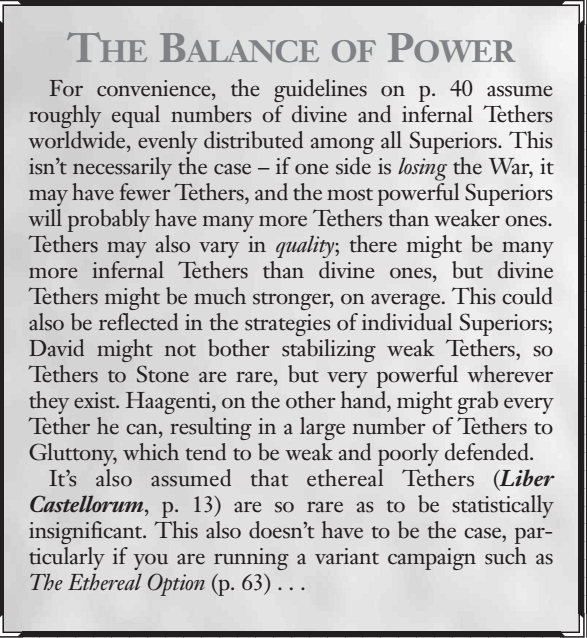
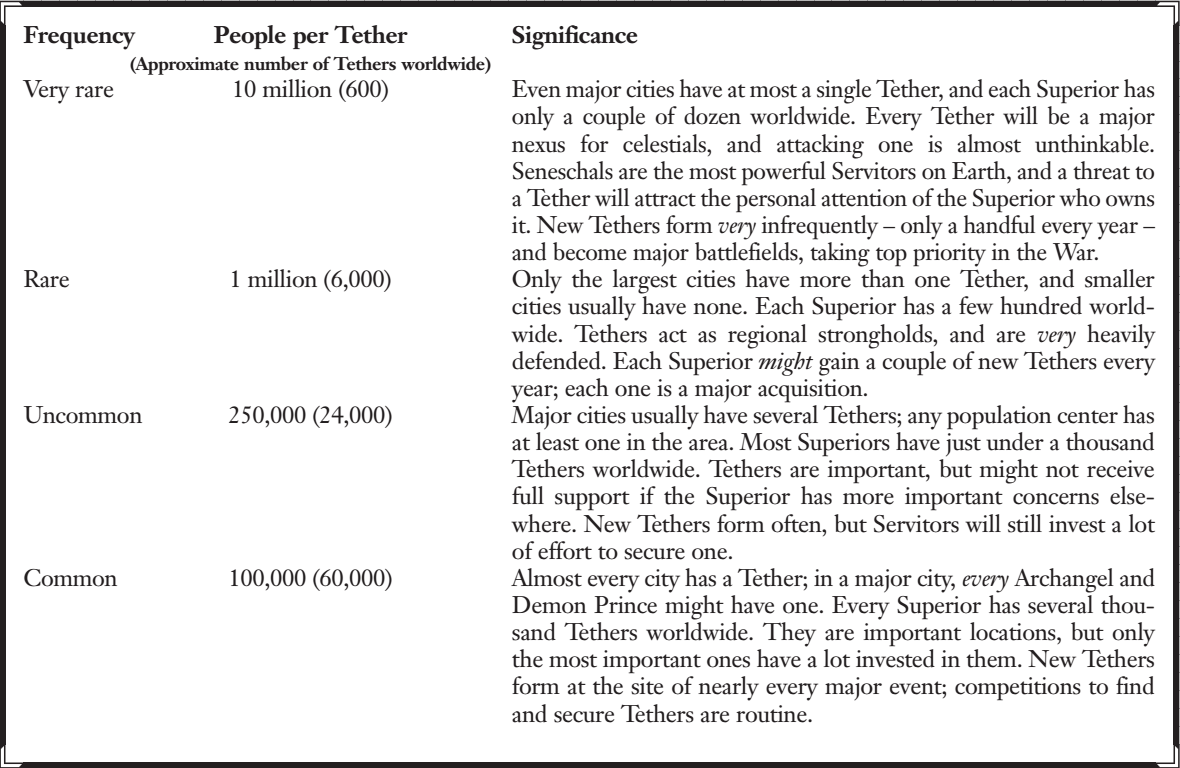
The game then talks about historical campaigns. The War has been going on for all of human history, really, so any period is playable. The game suggests using GURPS worldbooks to learn more about the world in the past, with GURPS In Nomine to provide conversion notes if needed. Superiors were different in the past, however - both sides have suffered losses and new Superiors have risen. There's a timeline later to help you determine who's aloive when, but some decisions about politics are all yours, and you have to stat them up yourself. Note that in the Old Testament era, Michael is the Commander, with Uriel as a potent ally, and Laurence, Haagenti, Kronos, Nybbas, Valefor and Vapula all don't exist. Saminga isn't a Superior yet, but Mariel, MEserach and Genubath are all prominent princes.
It should also be noted that while it can be tempting to put celestials behind everything in history, to fill Crusader ranks with angels of the Sword and so on, this turns humans into mere pawns. It doesn't say anything very good about human importance. Sure, celestials were involved in somne events, and even caused a few, and maybe some famous people actually were Soldiers, Saints, undead or celestials. But it's recommended you make these the exceptions to the rule, unless you want a game about celestials controlling everything behind the scenes.
You can also do alt settings, but they're mostly discussd later. (The French game had a space opera setting, apparently.) Anyway, once you get mood and setting down, it's time to think about theme. What's your game about? You don't have to have a theme in mind, and it's not set in stone - often, themes develop after a game's been going long enough for players to find their niches. There's infinite possible themes, from as general as 'defeat evil' to as specific as 'foil Baal's attempt to start Armageddon.' A theme, to IN, is a longterm plot resulting in a series of adventures. However, most fall into one of a few categories, we are told.
A Mythic campaign is about acting on the Symphony itself, waging the War at a broad level. Supernatural solutions are more important than mundane ones, and individual mortals are rarely important. Heaven and Hell, on this level, aren't going to fight over one random guy's soul. Superiors and Wordbound are more likely to be directly involved, and the PCs are favored servants, movers and shakers in the War.
A Realistic campaign is the opposite - it's the front lines, ground level. It might have epic scope, like saving refugees in a war-torn country or bringing donw a government, though. Grittiness is more about its mood. Realistic games focus on the personal. Individual souls matter more, and the PCs tend to matter less in the big picture. It's a huge focus on character development rather than frequently changing the world.
A high concept game is based on a single, easily summarized premise. The Quest, for example: the PCs are looking for something. Finding it might be the climax of the game, or might move the game to a new phase. For example, the Holy Grail, Eli, the Tsayadim, the truth of Jesus, whatever. The Crusade is a broader quest, a long term plan with a specific goal. Take over a city, destroy a Wordbound, get a Word, help a Wordbound become a Superior. Create a Tether. Destroy a Tether. The Prmeise is a general concept, where you take the setting and alter it with a major event. Eli has Fallen. Dominic is a secret Balseraph. Kobal and Haagenti are trying to Redeem. Two Princes go to war with each other. Jesus has returned. Armageddon is beginning. A Malakite has Fallen. One of the religions is actually true in every respect.
Superiors are important in a campaign, but can vary from active NPCs to unseen and remote presences. Relations between them affect many scenarios, and their angels and demons are expected to be loyal and follow those views. This can complicate party politics, which can be interesting or frustrating. You have to decide how much you want Superior politics to matter to your game. A game with high politicking means celestials must always keep political considerations in mind when working with others even temporarily, or when refusing to do so. Every relationship is nuanced by this web of politics. A low politicking game, on the other hand, keeps in mind that politics exist, but on the PC level they are less important. Yeah, you help your boss's allies and hinder their foes, but most Superiors don't pay attention to the day to day, just major operations. A game with no politicking just pretends Superior relations don't exist, when it comes to lower level celestials. Angels are all on the same side, demons are all out for #1, and as long as you serve the Word, your boss doesn't care what you do.
Just in the core book, you get 13 Archanges and 14 Princes, and there's plenty more in supplements. That's a lot of Superiors - possibly too many if you want to have Tethers, important servants and hooks for all of them. It's important to remember you don't have to use them all - you can prune down to the ones that fit your game and treat the rest as unimportant. The ones the PCs pick are obviously important, but the rest can appear or not as you like and as fits your game. Even if you don't want to limit the roster, though, you can still ignore the ones that don't interest you comapred to the ones that do - a city with no Tethers to Animals won't have much in the way of Jordi being important, say.

If you don't mind deviating from canon, you can even alter Superiors. David as a Cherub, say, Nybbas as the most powerful Prince, Dominic as the Archangel of Justice, Novalis as a Malakite, anything you like. Remember, however, that no ARchangel or Prince exsits in a vacuum, and they should fit into the relationships of the others. Dominic of Justice is probably less hostile about his investigations and not as cooperative with Asmodeus, say. New Superiors can also radically change your game, or hardly change it at all, depending on how important they are. Superiors are only chosen when there's a gape in the power structure - no one wants redundant Superiors. So any new Archangels or Princes should cover something not already being handled directly.
You should also consider how frequent celestials are compared to humans on Earth. Canon assumes each Superior has a fair number of servants, but that humans outnumber them all by a large margin. This, as with Tethers, is easiest to determine by an average ratio - though, sicne Tethers are bases, you may want to base the numbers a Superior has on the number of Tethers they have. That doesn't mean that celestial population density is proportional to human density, though - as with Tethers, celestials arem ost common in places of strategic interest.
A game with Very Rare celestials has about one per million humans, or 6000 celestials total, worldwide. Celestials are as common as billionaires or serial killers - you'll probably never meet one. They are lonely souls and rarely encounter each other. Each Superior has perhaps a few hundred servants on Eath, and the PCs are the elite. Each angel or demon might have a large territory to themselves. It's hard to run a standard game this way, and teams like the average party will be very unusual. It could work for a human0-centered game, however. Rare celestials, on the other hand, are about one per hundred thousand humans, or 60,000 celestials worldwide. They're as common as movie stars, with each Superior having about one to two thousand servants on Earth. In large cities, there might be a few dozen celestials, but rarely more than one or two of the same Word unless it's the most influential Word in the area. Celestials rarely encounter each other by accident, and most have only loose support networks.
Uncommon celestials are about 1 per 10,000 humans, or around 600,000 total. They're as common as politicians. Each Superior has thousands on Earth, and small cities will have over a dozen celestials, while large ones might have hundreds. There are few places with no celestials at all. Each Superior is well-represented in amjor centers, and angels or demons might have extended networks and organizations with their own subcultures. Common celestials are about 1 per thousand humans, or 6 million worldwide. They're as common as doctors. Even small communities have a few, and major cities might have thousands. Every Superior has over a hundred thousand Earthbound servants, and very few operate alone. Hierarches are everywhere, with large and complex interconnecitons. Hardly any major event happens without a celestial participating in some way. Very Common celestials are about 1 per 250 humans, or 24 million worldwide. Each Superior has almost a million servants. Celestials are everywhere, infiltrating every organization. Almost everyone personally knows someone that's a secret angel or demon, and they may populate entire neighborhoods in large cities. This can border on farce.
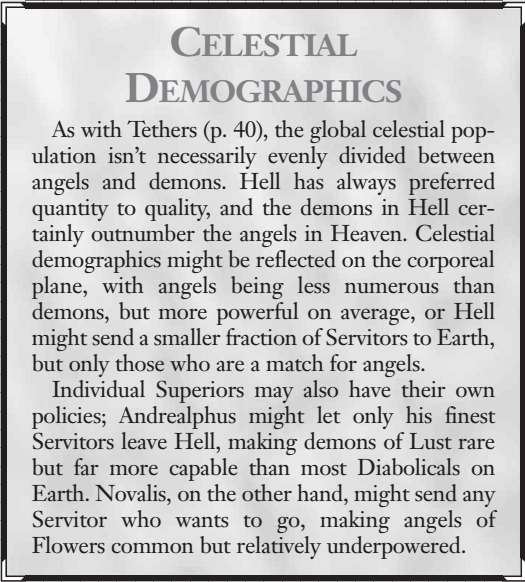
Next time: Intervention
Open Secrets
Original SA post In Nomine Game Master's Guide: Open SecretsNow that we know how many celestials are around in your game, you have to decide how actively they intervene. The standard game assumes that Heaven and Hell agree that the War shouldn't be public. In an open intervention campaign...well, they don't. Angels and demons fight openly, recruit openly, everyon on Earth knows the War is going on. They may or may not believe it's really between angels and demons. This is probably only going to happen during Armageddon, assuming standard IN stuff.
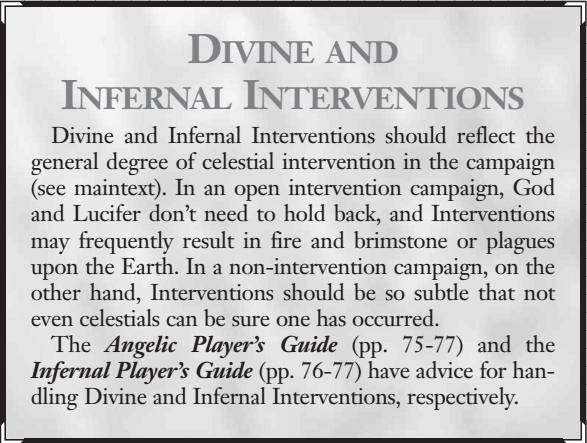
High intervention means that while you aren't supposed to be open, you don't have to try too hard to hide your nature. Your boss won't be very upset for public use of supernatural powers, as long as you don't stick around to answer questions. However, in a modern setting sooner or later it'll get caught on camera, and unless celestials are quite rare, repeated public intervention won't be possible to keep out of the media. Still, in an unrealistic and cinematic campaign, you can act like a superhero or active movie character. Before the rise in communications and recording technology, celestials did act more openly, but even in history, they weren't totally open.
Moderate intervention means you're supposed to keep your powers out of sight, but occasional witnesses are inevitable and expected. If they cause problems, they can be persuaded, discredited or killed. Carelessness will piss off your boss, as will public display of your nature, unless you can justify it, cover it up or both. Roles are valuable, and celestials attempt to act with subtlety, but usually more out of fear of alerting other celestials.
Low intervention means you're expected to do whatever you can to avoid revealing your presence to any human but Soldiers. Any public use of power, even without witnesses, is cause for discipline and investigation. Songs are used only very rarely, and assumign celestial form on Earth is forbidden except in extreme circumstances, due to the chance of a lucky or perceptive mortal spotting it. Combat is relatively rare, in all likelihood, and Roles are practically required.
Non-intervention means celestials aren't supposed to go to earth. This does contradict canon, but is an interesting variant. PCs might be Soldiers, Outcasts, Renegades, the pursuers of Outcasts or Renegades, or the rare celestials sent for very specific missions, requiring extreme subtlety.
So, how do celestials deal with the details of mortal existence? Celestials without a Role have no legal identity, which the GM can cause problems with as they like. Maybe you have a fake driver's license and stolen credit cards. Maybe you don't and need to carry cash and avoid cops. Wealth and equipment generally don't matter much, however. Celestials that need money can usually get it from their boss, and Superiors are assumed to provide basic needs for their servants - nothing cushy, but adequate housing, a small allowance, maybe a vehicle and any tools needed to do their job. As a general rule, anything a Pc wants that is reasonable is available. Expensive or unusual equipment might need special permission from your Superior or negotiation with someone who can provide it, but Baal, for example, will probably be able to get you any man-portable weapon you ask for. Mundane maintenance isn't a problem - no battery or ammmo-cunting unless the GM wants failure or ammo shortage to fit the scenario. You still need to reload, sure, but you don't have to track how many bullets you have on hand. You also don't have to buy your important possessions as artifacts - doing so just ensures that the stuff will be available and trackable in all situations.
So, let's tlak humans. Most humans have 5 Forces, and are known as mundanes. The exceptional, with 6 or more Forces, are the people who become Soldiers and sorcerers. It is up to the GM to decide how common they are. In canon, about 1% of humans have 6 Forces, but it is unknown how many have the unrealized potential for a 6th Force. If the proportion is low, Soldiers must be discovered, not made, but if it's higher, you might be able to set up training programs to create Soldiers. However, not every 6-Force human is a Soldier or even Symphonically aware. That's a decision the GM has to make - of the potential Soldiers, how many are active? If that's low, then many potnetial Soldiers exist and may awaken by nearby celestial actions, while if it's high, most exceptional humans are already involved. In general, the more exceptional humans there are, the more cautious celestials have to be. If they are more rare, they're more valuable, but also won't interfere so often. If they're common, they're less valuable but oyu can never assume that you won't run into them.
Most active exceptional humans in the War are Soldiers of God or Soldiers of Hell. The GM should decide how many are on each side, approximately, for the setting. There's a big difference between a small network of Soldiers and a small army, after all. Not all Soldiers serve Heaven or Hell, though. There are also pagan Soldiers of the ethereal gods or even rogue Soldiers, working only for themselves, cabals or human agencies. They can be quite dangerous if they're common enough that ever organization has Symphonically aware agents. Besides Soldiers, there's also sorcerers, who may be isolated madmen or founders of potent cabals and agencies. Plus you have the undead, who msotly work for Saminga, the Saints, who serve the Archangels, and prophets, ghosts and dream-shades, all of whom can have impact on the War.
The Corporeal Player's Guide talks more about human agencies and their involvement in the War, but the book does talk about ways that major human organizations can affect the game, dividing them into Inept, Average and Competent. The government is a great way to shape society, though it is often more effective to recruit or subvert politicians than to masquerade as them via Roles. The higher profile, the more danger of exposure, after all. But hey, Presidents and Prime Ministers need friends. An Inept government cannot cope with celestials and will ignore or laugh at any reports of the supernatural. They are easy to infiltgrate, but hard to push around, as politicians are quite willful. An Average government is slow to react to new things due to bureaucracy, but a few members could understand the War and its threats or opportunities. They might be willing allies or determined foes. A Competent government reacts quickly to supernatural threats. If they don't understand them, they recruit experts and investigators. Because they command the military, law and other agencies, they can mobilize vast resources, and most Superiors will want to leave them alone for fear of exposure.
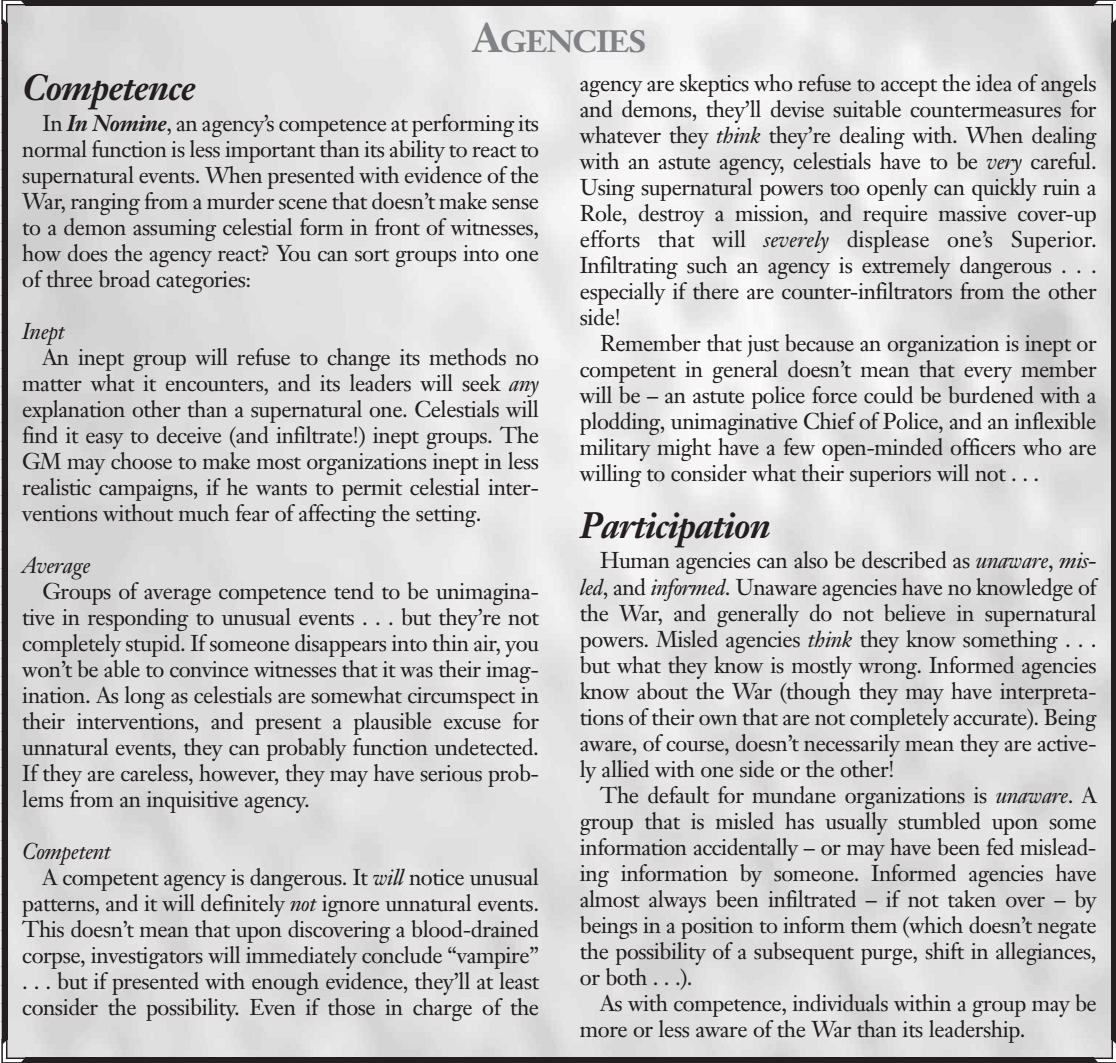
The Law includes everything from local police to federal agencies or civilian regulatory agencies. Inept law enforcement will blame just about everything on drug addicts, terrorists or whatever else is a convenient excuse. They rarely perform autopsies or forensic investigations and will rationalize away any discrepancies. Quite handy for a violent celestial! Average law enforcment notices bizarre deaths and strings of strange deaths will lead to theories about serial killers. They'll find 'rational' explanations for weirdness, but will notice if weirdness happens over and over. Competent law enforcment will compile databases to track unusual incidents and send complete forensics teams every time. They'll be willing to draw correlations and entertain unorthodox theories, too.
The military has a lot of firepower and often a lot of political power. An Inept military classifies anything it can't explain and sends the witnesses in for psych evals. The reports will usually be buried forever, as well. They're easy to deceive and manipulate. An Average military still classifies everything it can't explain...but someone might actually read the reports, and if they encounter something often enough, they'll start to study it. Obvious evidence of the supernatural will get in mysterious men in black, and these guys are harder to steal from - they notice when things go missing. Competent militaries have vast resources, and if they think they're dealing with the supernatural, they'll be developing weapons and procedures to counter them, as well as increasing security to prevent infiltration.
Intelligence agencies are mostly made of desk analysts, with lots of information but boring jobs. An Inept intelligence agency is too hidebound to accept evidence that doesn't fit their models and will filter out anything supernatural and rationalize it away. They will have no real information on celestials or supernatural events. They're less dangerous, but less useful to infiltrate. An Average agency is not a direct threat - they still interpret unnatural events as phenomena worth filing, but rarely worth investigating. the files can be useful, however. Competent agencies are exceptionalyl dangerous - they have the means to collect very valuable information and inform others aobut it. They might have an entire department dedicated to the supernatural, or even sponsor a specialized agency against it. Superiors try to keep track of them, but infiltration is difficult.
Business can be put to many uses. Inept businesses care only about cost and profit an will not look into anything that doesn't relate to those. They are easy to subvert. Average businesses don't care about hte supernatural but will notice oddities that affect business. The ambitious may try to take advantage, while others will worry about what they're getting into. Competent businesses collect information on the supernatural to track opportunity and danger. They might have R&D analyzing artifacts, sysadmins hunting for signs of supernatural subcultures and security-focused corporaitons looking for infiltrators. While they can be greedy, few businesses will knowingly form pacts with Hell.
The media doesn't belong solely ot Nybbas, though he certainly has the most influence. It can keep the War out of sight or blow it wide open. Inept media outlets ignore stories that don't make sense or mosreport them as something else...or else htey credulously accept everything and report on supernatural events next to Elvis sightings. Average media organizations have some judgment - just enough danger to be worth avoiding. They rarely believe in the supernatural but investigate anything thatl ooks interesting, and someone might consider more unorthodox explanations. Competent media organizations are a threat, to be avoided, subverted or eliminated. They can assign a lot of investogators to something, and are likely to turn on anyone that tries to use them.
Academia covers universities and often brilliant teachers. Inept schools do not believe in the supernatural and insist on hard facts. They won't expose the War to students, but are harder to direct to useful research. Average schools are open-minded enough to consider the unconventional, and divinity schools and paranormal researchers may believe in the supernatural or even Heaven and Hell. Academics might be able to translate ancient languages or teach sorcerous rituals at times. Competent schools seriously investigate the supernatural even if they don't believe, as they will examine the evidence. They can get a lot of information that is very valuable, but very dangerous, and make good recruiting grounds for Soldiers.
Religions get covered more later, but they often have their own perspectives, which may or may not resemble reality. An inept religion knows nothing about the War regardless of what they think they know. Those in authority don't really believe what they preach, or their woldview is so narrow they can't accept any contradictions. Demons find them useful tools, and angels tend to despair of helping them in their ignorance. Average religions will probably accept evidence of the supernatural, but via their own interpretation. Almost none owuld knowingly ally with demons, but also find it hard to trust angels that don't meet their expectations. Competent religions believe but are flexible enough to not make snap judgments. They can be great allies or terrible foes. Many individuals are this open-minded, but few organizations are. The Host would love to get the full support of world religions, but it's not that easy. A church with full knowledge of some parto f the War will certainyl choose a side - but may not pick the side they think they're picking.
Organized crime is a favored tool by some demons. Inept criminal organizations have no idea what to do with the supernatural and tend to ignore it or flee depending on if it seems dangerous. They're easily infiltrated. Average criminals notice celestial activity and may try to benefit from the supernatural powers or try to neutralize the threat. Competet criminals treat supernatural power the way they do any threat - avoid, destroy or coopt. If they know supernatural beings exist, they're hard to infiltrate or intimidate. They can be dealt with, but are dangerous and often as good at double-crossing as demons.
Next time: Party cohesion
Split The Party
Original SA post In Nomine Game Master's Guide: Split The PartyGetting the party to work together is often the hardest part of IN, as each Superior has different goals, and people usually won't want to all serve the same Word. These conflicts can be managed, and the GM's job is to keep track of the potential conflicts and try to keep them from being irreconcilable. It's especially hard for angel/demon mixed parties, especially when Malakim are involved or enemy Words. These conflicts can be interesting, but they can also lead to interplayer conflict rather than just intercharacter, and that's to be avoided at all costs. Mangeable conflicts should be undertaken carefully, to avoid pissing off players.
The problem of rival Archangels is less of a big deal, outside a very political game, because all angels are in theory on the same side, and even the most intense animosity between Words will be set aside to stop Hell, and even when there isn't, Archangels do not openly fight each other. If there is a hostility between two PCs' Archangels, you do need a way to cooperate, but a mutual enemy will work well for that. You can also establish a personal relationship that supersedes politics - Dominic may not like Eli, but a Creationer can convince Dominic they're loyal, whatever Eli's up to, and so that angel is reliable. Likewise, a rare angel of Flowers might earn the respect of local Warriors, or vice versa.
The rivalry between Princes is deeper and more violent, and can be harder to manage. Demons, after all, can be punished for aiding enemy Princes. Sure, demons all have to further the cause of Hell, but only direct orders from Asmodeus, Baal or Lucifer are likely to make hostile Princes cooperate. A common threat cna bring them together temporarily, however, but the only thing that would keep them together after that is a personal reason strong enough to risk punishment or a chance of longterm gain that outweighs the risk. Of course, demons can lie about who they serve, hiding their true allegiance to their allies.
Some players will want to mix angels and dmeons in one party, and this can work in a game with low contrast or a humorous one. It's harder if Malakim, Judgment or the Sowrd are involve, and few angel will tolerate Calabim or Shedim, though. Adversarial campaigns are possible, but the GM has to be real careful. Even the slightest hint of bias will get all the players resentful, and even if things go smoothly, one side or the other will be foiled, sent to Trauma or even destroyed at some point. Unless it's a short-term game or the players are comfortable with this, it can be hard to keep everyone enjoying the game. One way might be to allow each player two PCs, one on each side, as long as players can keep the two characters' desires and angers separate.
A mutual threat can get both Heaven and Hell to work together - a Superior that is enemies to everyone in the party, a third party of some kind like mortals, ethereals or the Grigori, or so on. These alliances last only until the threat is resolved. Continuing threats might not be plausible, but they can develop relationships that make the normal hostility less emotonal, and make the two sides focus on outwitting or recruiting each other rather than murder.
Sometimes, Superiors will cooperate across the board in secret, due to mutual intersts. Judmnet sometimes works with the Game to hunt out Outcasts or Renegades, Lust and Flowers sometimes work otgether to prevent Armageddon, War and the War to cause Armageddon, Freedom and Trade when business must be done on neutral ground. Likewise, PCs might have orders to maintain the peace as a sort of cold war or armistice, perhaps due to a local zone of truce (such as Austin) or an agreement not to kill each other or cross certain lines but still allowing conflict.
Despite the War, personal relationships can also cross the lines. Some angels stay friends with their Fallen comrades, some demons stay in touch with the Redeemed. Others are thrown together by circumstance and make friends. This can be really dangerous if your boss finds out...but they might see it as a chance to feed disinformation to the enemy or lure them into traps.
The final option is for either or both sides to be out of favor. Outcasts and Renegades sometimes team up. Renegades willing to Redeem may seek sanctuary with angels, Outcastsm ight hide with demons trying to make them Fall. Or they might team up together for protection against their mutual pursuers. It can be useful to have both angelic and demonic powers on the same team, after all. This sort of group might also accept humans or othereals.
Human characters of any kind (mundanes, Soldiers, sorcerers, Saints, undead) can participate in the War, but they tend to be a bit underpowered compared to cleestials. GMs might give them extra CP for resources or impose restrictions on celestials. It is important, either way, that human PCs not be dominated by the celestials or confined to unimportant jobs. The Corporeal Player's Guide has more advice there. Ethereals also don't mingle easily - the Host destroys them on Earth, and demons tend to dislike them as well, as competition, though they are more willing to bargain. The Marches can see more coexistence, but even then it's uneasy. However, Beleth is known for making deals with ethereals, and Nybbas has pacts with the Japanese kami. Not all Archangels are hostile, either - a tolerant one might work with ethereals that don't ally with Hell, like the loas of the Afro-Caribbean religions, who have an unspoken agreement with Heaven, and the unofficially tolerated Aboriginal spirits of the Dreamtime.
Obviously, of course, you can alter canon as you please. Canon's just a reference tool, not a rule you have to follow. A canon campaign follows canon as much as it can, with the adaptations needed to make your game yours. These changes require little explanation - 'I'm not usuing Furfur' or 'I am using a variant rule' or 'I added a minor Superior'. Stuff will happen in your game to make it evolve from canon, of course, and do not feel the need to conform to metaplot - changes are just fine and the game assures us that's not a big deal. Most of canon is intended to be easy to alter and work around.
A non-canonical game iwll diverse isgnificantly from the rules, or use an alternate setting, and the changes will probably require more explanation to players and more planning, but that's fine, too. Just think about the changes you make and how they'll affect your game! Note, however, that no matter what, canon will never answer certain questions. They are full of doubt ICly, and while many people have opinions, no book will ever reveal an official truth to them. The book then starts listing and explaining these big mysteries.
In canon, God is offstage, and all direct divine intervention, even rolls of 111, are ineffable. No one, even the Archangels, can definitely state what God is, or if He is. Most angels and some demons believe that God is...well, God. The supreme being, the Creator, the first and last. As such, He is beyond speculation and judgment. Morals and motives don't apply - everything is part of God and His will is ineffable. It is impossible to know what God thinks or wants, or even if He cares about the War. These questions are irrelevant. For demons, it can be depressing that God might be omnipotent, but on the other hand, how can you be sure he's on the side of the angels? Most angels believe that God is Good - He is active, aware and is on the side of Heaven. Few demons believe this. And sure, just because God has an opinion doesn't mean everyone agrees. To those that believe God loves humans, a demon might point out that He doesn't show it much, or that His love is a form of suffocation. Demons often take the position that God's 'good' isn't good for everyone else. Angels are happy with moral absolutes, but demons don't like to accept the idea that an all-powerful foe has made them, by definition, wrong.
Some demons hold that God is Evil. He is selfish and has His own agenda, and He can't stand not getting his way. He has no claim to higher morality, just more power. He might be portrayed as malicious and cruel or just petty and intolerant, but He isn't nice. It may not be more optimistic for demons to believe God's a bastad, but it makes them feel better about the cause. Some ethereals also believe this. Lucifer, it is claimed, holds that God does not exist. He may have one, but now He has withdrawn, or perhaps He was always a delusion of the Archangels. In any event, there is no God now. No one is in the Higher Heavens, and all Divine Interventions are random, or possibly generated by Archangels or the subconscious will of the Host. Ethereals like this idea, and many demons claim to believe it, but few can say they're certain. Angels tend to deny it vehemently, but some can't honestly say they do not doubt.
Especially popular among ethereals is that God was once an ethereal spirit, Yahweh, who became very potent due to his tribal worshippers. As the Israelites conquered their neighbors, Yahweh consumed their gods, and then discovered a secret source of power, allowing him to vastly outstrip other deities and rewrite reality itself. He reshaped the entire world, creating Heaven and Hell as a Domain he had somehow made off-limits to anyone but his own followers. To this day, God is just a vastly potent ethereal and angels and demons are just ethereals with some of His power. If God could be cut off, or someone else could get at his power source, the War would change. Most celestials don't buy this theory - it's heretical in Heaven and Hell sees it as insane. Angels refuse to accept that their memories are all lies embedded in their minds at creation, and demons will never accept that they're just Yahweh-fortified ethereals.
In Nomine canon conforms to no particular religion, and states that no religion is exactly correct. However, that doesn't mean some or all religions don't have an element of truth, or that one religion can't be essentially correct, if not in every detail. IN does take positions on some specific religious beliefs, but will not take one on the ultimate validity of any of them. Jesus, Mary, Muhammad and Buddha will never appear personally in any supplement. Their ties to the Divine are ineffable, and while there are many theories about them, their explicit nature will never be stated.
The Corporeal Player's Guide discusses the possible destinations of mortal souls, but you get to each is left to the GM. Achieving destiny gets you to Heaven and fate gets you to Hell, but those that do both or neither could reincarnate, disband or become dream-shades. Not even Superiros can be sure where a given soul goes after death, if it doesn;t arrive in Heaven or Hell. You ghet to decide that on your own.
The Higher Heavens are inaccessible to PCs. Human souls that go there never return. Even the Archangels haven't been there since before the Fall. They are said to be as far from Heaven as Heaven is from Earth, inhabited by beings even greater than Archangels, yet minuscule before God. That's all rumor - the Archangels can't describe the Higher Heavens in terms that make any sense, even if they wanted to, and some Princes claim they don't even exist. They will never be described in canon. Likewise, the Lower Hells will not be detailed. They are accessible, but if the PCs go there or are taken there by Lucifer, it's up to the GM to make them suitably horrific.
So, variants! An all-human game is possible. PCs could be mundanes, at first unaware of the War, and may become Soldiers of some kind, or not. They might be cops or FBI agents, or investigators into the supernatural. Their foes are likely undead, sorcerers or spirits with mundane servants, and celestials may not even appear at all. The existence of the War being revealed to them might be the climax of the game. Humans can also become Symphonically aware without picking a side, and some even learn Songs or other powers before learning about the War. These are known as rogue Soldiers. They rarely remain independent long, though, as both sides try to recruit or kill them, but some manage to survive and stay one step ahead. They might get recruited by a third party to keep celestials out of human affairs, too - the government, maybe, or a secret agency that sees celestials as a threat...or has less benevolent reasons. Or maybe they're not actually a neutral force, in truth.
Because this is an SJ Games book, we also get a section talking about how the world might also be run by the Illuminati, and you can run a game about the Illuminati and who secretly controls them, or if there are competing Illiminati conspiracies, each controlled by a different group, or not controlled at all. So yeah! Illuminati! You can also run IN Backwards. Backwards means the angels are evil and the demons are good. This works best for a dark or funny game. Demons do see themselves as the heroes, fighting for freedom and individuality against an oppressive and tyrannical Host. In Backwards, they're correct. You can have demons still be mean and nasty and Heaven is just worse - but then again, maybe they're sympathetic, and angels are single-minded fanatics, robots made of Choir and Word.
Lastly, you could run an Ethereal game. They have diverse motives and abilities, and they can be allied to Heaven or Hell or working on their own side, looking for the freedom to go to Earth and do as they will. Most regard angels and demons mostly as potential foes, as well as dealing with rival spirits. The old gods might have regained much of their old power and now bide their time to strike against the celestials, or maybe the PCs want to find Yahweh's power and remove or share in it. You will, obviously, need at least the Marches book for ethereal games, and probably the Ethereal Player's Guide.
Next time: Religion
Thou Shalt Not
Original SA post In Nomine Game Master's Guide: Thou Shalt Not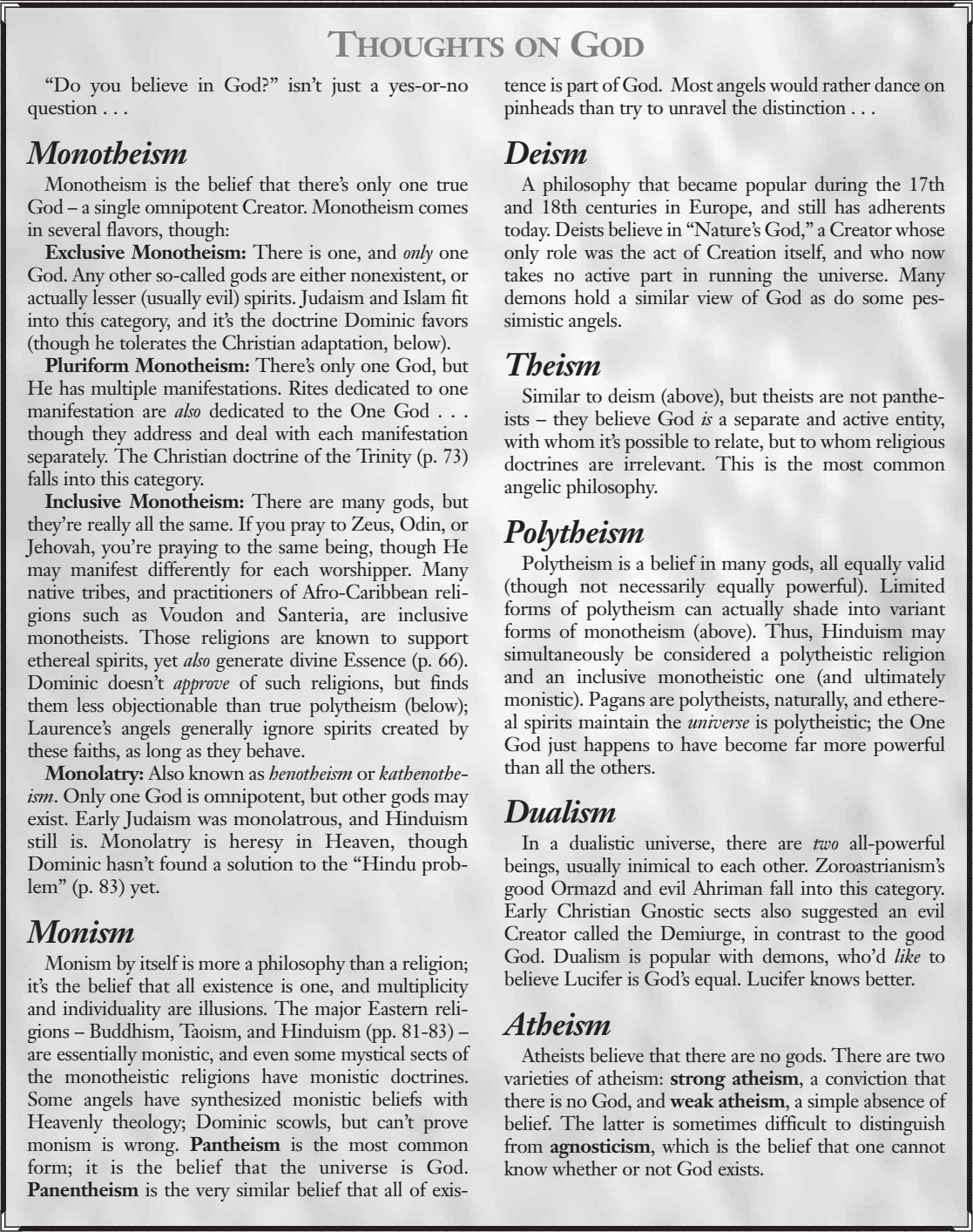
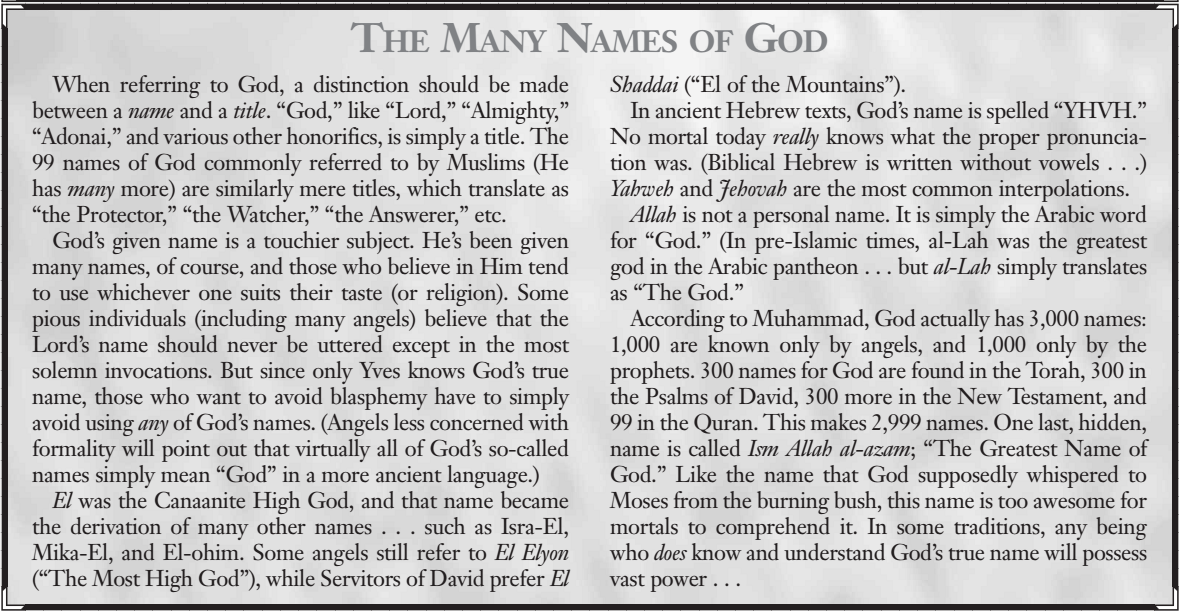
Humans generate Essence via faith - it's what makes them special and what angels believe sets them apart. Humans who worship God, particularly via monotheism, generate Essence for Heaven. Some flows into divine Tethers, some feeds an Archangel's Word. Belief in pagan spirits feeds and can create ethereals. Thus, Heaven defines religions as either divine or pagan in a different way than humans: pagan religions are those faiths that feed ethereals. Monotheism never creates ethereals, even if the adherents pray more to certain icons than directly to God. There are no ethereal versions of Jesus, Mary or Muhammad, though a spirit can pretend to be them - they just won't be sustained by prayer. Further, some pagan deities have been 'killed' by losing their worshippers to a monotheistic faith. Brigid, for example, was a potent Celtic goddess, but when she was made a saint, her Essence flow dried up as it went to Heaven instead, and the pagan spirit of Brigid faded to nothing, with no ethereal Saint Brigid replacing her. Dominic sees this as proof of the divinity of Abrahamic faiths, and it's why many pagan gods hate monotheists.
However, the Essence from worship is diffuse, hard to track. Even Superiors can only estimate what beliefs and actions feed them with Essence via fluctuations in Earhtly supply based on events. They can't connect any one human's prayers to any being with an identifiable bit of Essence going anywhere - though Rites are a whole different matter. Thus, not all religions are easily defined as divine or pagan. For example: Taoism and Buddhism. They have huge followings, and some sects believe in entire pantheons, yet none of these sects have ever created Ethereals and there's definitely no ethereal Buddhas. Some angels believe it is because Eastern monism is divine - it may not recognize God, but these religions teach Heavenly values, and certainly Taoists and Buddhists can and do go to Heaven or Hell. Of course, so do atheists and pagans. Dominic and Laurence believe the Essence from Buddhism and similar religions goes somewhere, perhaps not to any pagan god that they can detect, but it's also not going to Heaven, they're fairly sure. Some Archanels are pretty sure they get Essence from non-monotheists, but not everyone is convinced.
Hinduism and certain other polytheistic religions, like those of the Australian aborigines or some Native American tribes, complicate things. Hindus and some polytheists simultaneously believe in an all-powerful Creator and a pantheon of lesser deities. these believers have created divine Tethers, strengthened Words and served as Soldiers of God...but they've also created ethereal Tethers, strengthened pagan gods and served as pagan Soldiers. Thus, the only unambiguous religions are pure monotheism and polytheism - and even then, of the latter, it's believed they can generate divine or infernal Essence under the right conditions, on top of ethereal Essence.
Dominic, for his part, hates this blurry line. Non-monotheistic beliefs are heretical in Heaven, and collaborating with ethereals ias a crime, but some angels do try to syncretize monotheism with Buddhism or Taoism or other faiths. Dominic does not appreciate this but he can't actually ban it. There's Buddhists and Hindus in Heaven, after all. Most angels do not follow any particular religion and indeed find their trappings superfluous. What matters is belief in God - language of prayer or following scripture or ritual clothes are all cosmetic. Some angels do have a specific faith, however. Most Angels of the Sword are Christian, and of those, most are Catholic. Angels of Faith tend to be Muslim. Even they do not care about the extraneous doctrines and rituals, however - they know what's important and what isn't. Angels tend to be much more tolerant of other religions than humans, though they do still get into debates, even heated ones.
Most demons believe God exists and is an asshole. Beyond that, religion is just a way to control humans. Still, some uniquely diabolical beliefs have developed i Hell, ranging from predictable maltheists to strange Habbalite cults or creative twists on human religions. Most Princes don't care what you believe as long as you do your job, but too much religion does draw Game attention. Hell's Princes would lvoe to get in on religious Essence flow, and they love to corrupt divine religions and gain infernal Tethers from the misdeeds of the religious. However, no religion has ever reliably fueled Hell, as most human religions are either based on selfless principles or directly worship pagan gods. Essence can be diverted, but it's hard to keep humans totally focused on intentional selfishness. Not many religions explicitly endorse evil, and the few that do rarely attract stable followings. Baal and Belial, among others, were worshipped as gods in ancient times, but none of them have managed it in the modern era. Andrealphus and Nybbas are known to be collaborating on a postmodern media-driven religion of carnal self-indulgence. The rest of Hell is both interested and fearful. If it succeeds, it'll prove that faith can be turned to pure selfishness...but it might also make Andrealphus and Nybbas the most potent of Hell's Princes.
So, specific religions! First up, Judaism . Jews have much in common with Christians and Muslims, and Jewish scripture influenced both. However, modern Judaism is as much culture as religion, and many who identify as Jews do not practice the Jewish faith. You can be an atheist Jew. Anti-semitism has often been a problem with relations with non-Jews. From the Jewish perspective, Christianity is an odd, Greek-influenced pagan offshoot of Judaism - a view that several angels agree with, and even those that now favor Christianity respect the Jews as the first mortals to serve God.
By 2000 BC, many pagan gods were benefiting from human religion, and some even rivaled Archangels in sheer Forces. It was feared that some might even be able to contest for Words. Yves proposed monotheism as a solution. So it was that the tribal chieftain Abram was led from Mesopotamia to Canaan in the 19th century BC. I nexchange for serving God, the newly named Abraham was promised prosperity for his people. Abraham's grandson, Jacob, sired the Twelve Patriarchs, and the tribes of Israel conquered their neighbors with the aid of David and Michael. Worship of Yahweh became much stronger than worship of the Canaanite gods, and Heaven was pleased. The Israelites were not at that point true monotheists - they believed there were other gods, of which Yahweh was supreme and the only one worthy of worship. Ethereals mark this as the point of first hostility with heaven, and also claim that Yahweh was simply a war god who got lucky and that all celestial memories predating this were implanted by Yahweh.
The evolution to true monotheism took over a thousand years, in which the Israelites repeatedly fell back into pagan worship despite warnings by their prophets, so Michael and David stood by while they were enslaved by Egypt, conquered by Babylon, then Assyria, then Persia, then Greece, then Rome. But when the Jews were loyal, David often sent his servants to help, as in the Maccabean revolt of 167 BC or the siege of Masada in 73 AD, which turned the Zealots' fortress into a Tether to Stone. By the 5th century AD, Rabbinical scholars compiled the Talmurd, a book of commentaries on the Hebrew Bible. More than anything, this unified the Jews as monotheists. Over the next few centuries, the Diaspora continued, spreading Jews from China to sub-Saharan Africa or England. Often, they were insular communities within larger socities. In Europe they were persecuted both for their beleifs and as moneylenders, as usury was forbidden to Christians. They were unpopular with the nobles, who often found pogroms or exile of Jews as a way to avoid paying loans. However, their role in European trade earned Marc's favor. Until quite recently, they also found more hospitality in Muslim lands, where they were hated less and often received high positions in government, especially as doctors or scholars.
The Hebrews were not scattered in almost invisible enclaves in the west, and no single Archangel took special interest in them, as the Christians and Muslims spread monotheism more now than the Jews did. The Holocaust took everyone by surprise and created immense guilt in Heaven. It seemed like it must have been a diabolical plot to wipe out God's chosen people, but even after it became clear that any demonic involvement was just opportunistic, and the attempted genocide of both the Jews and many others was a human evil, the angels felt deep shame that no patron had been watching out for the Jews. So far, no Archangel has stepped forward to be the patron of Judaism as Laurence is for Christianity or Khalid for Islam. (Half a century is not a very long time for an Archangel to think about that kind of thing, after all.) Michael and David are both known to support modern Israel...but Valefor and Malphas both championed its creation as well. Dominic has recruited increasingly from Orthodox Rabbis, both for Saints and Soldiers, Eli has been spotted in many Reform synagogues, and Janus is believed to have some interest in the Reconstructionist movement. Certainly, Heaven is no longer forgetting about the Jews.
Ethnically, modern Jews divide primarily into the Ashkenazi and Sephardic groups, with a few other offshots like the Yemeni Jews, Ethiopian Jews and Asian Jews. The Ashkenazi descend from Eastern Europe, and speak Yiddish, a creole of Hebrew, German and Russian. Sephardic Jews descend from Spain, Portugal and the Middle East, and their language, Ladino, was msotly destroyed in the Holocaust. Both branches now speak Hebrew, but with different accents. The Sephardics did more to integrate into local culture than the Ashkenazi, and the Ashkenazi spawned more movements, but in practice there is little modern difference between the two groups.
Early Jewish history has several sects - the Samaritans, the Pharisees, the Essenes, the Sadducees and the Zealots, among others. All but the Pharisees were destroyed under Rome, and the Jews became almost homogeneous until medieval times. Almost all modern Jews trace their history back to the Rabbinical Talmudic tradition, and modern sects, like the Hasidim and Mitnaggedim, developed in the 1700s in Eastern Europe. Theologically, the main movements among the Jews today are the Orthodox, Conservative and Reform. A newer movement, the Reconstructionists, are small but vocal in the US. Orthodox Jews believe the Torah is the literal and inerrant word of God. The Reform believe the Torah was written by humans, and thus may be flawed in places and not need to be interpreted literally. Conservatives are in between, seeing the Torah as divinely inspired by human-authored.
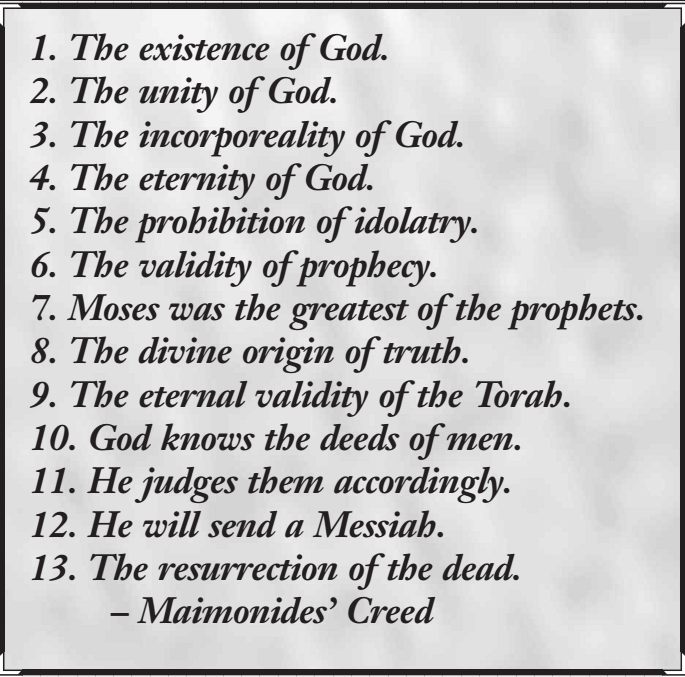
The most basic tenet of Jewish faith is that there's one God, and only one God. All Orthodox Jews also believe the Torah is the literal word of God, from which not one word could be added or taken away. Reform and Conservative Jews consider the Torah sacred but not necessarily perfect. Jews await the coming of the Messiah, whom they believe will someday come to rebuild the Temple in Jerusalem and transfigure the world. In the meantime, they honor Saturday as their Sabbath, a holy day. The Torah is a lawbook, and the Orthodox try to obey all 613 laws, but since no two Rabbis can even agree on what each means, even the Orthodox don't all follow in the same way. Most of modern Jewish orthodoxy was developed by Rabbi Moses ben Maimon, aka Maimonides, a 12-century Spanish physicaian who emigrated to Egypt and served Saladin. His book, A Guide for the Perplexed , was meant to make Judaism accessible to the common man. He argued against anthropomorphizing God and codified the Jewish creed into 13 articles. Dominic regards the Creed of Maimonides as one of the best and most succinct statements of orthodoxy ever made by a mortal, and he reccommends it for angels as well. Jews hold that prayer, penitence and charity (including good works) are needed to gain entry to Heaven, and many hold that good deeds alone are sufficient, as God will forgive a lack of prayer. Thus, anyone can get into Heaven, not just Jews.
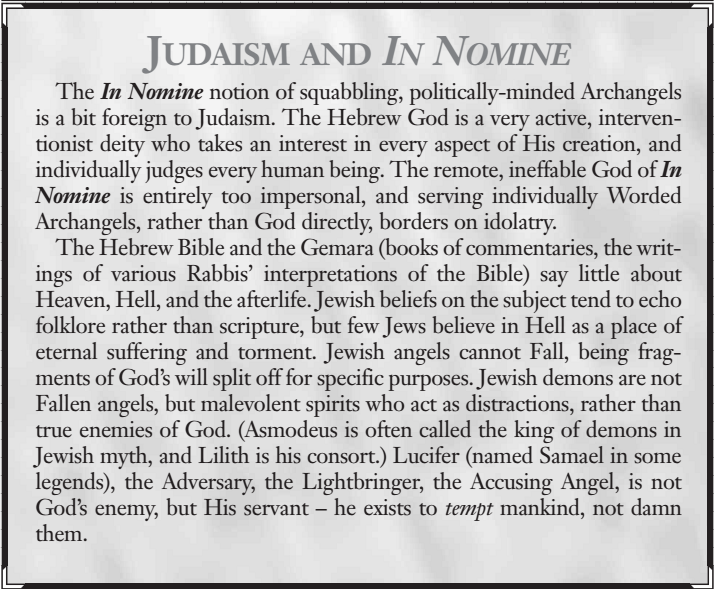
The Hebrews have identified themselves as God's chosen people since the earliest...but it isn't an exalted state. It doesn't make them superior. It just means they have a special covenant with God, and must honor the terms of that agreement or suffer God's wrath. Non-Jews are not held to the same standard, but are not supposed to be seen as inferior. Meanwhile, there's Zionism. It's a political movement started in the 1800s by Jews seeking a Jewish homeland. The early Zionists believed Jews would never be truly free or united until they had a nation of their own, and they selected Palestine out of ancient ties to the land and in the belief that they could coexist with the Arabs already living there. While Zionism had religious overtones, it was primarily a secular movement, and was originally opposed by the Orthodox. Today, as with the state of Israel, Zionism remains divisive among both Jews and non-Jews. Some believe Malphas was responsible for Zionism, but David supported them, and Baal opposed them out of a desire to keep his ancient foes disunited and unarmed.
Next time: Christianity
Jesus Fuckin' Christ
Original SA post In Nomine Game Master's Guide: Jesus Fuckin' ChristChristianity is the dominant religion of the West. Some credit it with widespread social reform and the evolution of Western intellectualism, but others hold it responsible for terrible wars and intolerance. Early Christian history is Jewish history, and Christians revere the patriarchs and prophets, but believe the laws given to the Hebrews are supplanted by a new covenant established by Jesus. Gabriel personally announced the birth of Jesus, and the other angels assumed he'd be some important new prophet, but Gabriel has to this day never explained or said Jesus was the Messiah - or contradicted it. Jesus did perfomr miracles - nothing the Old Testament prophets had never done, but impressive. By the time he became important enough for Dominic to pay attention, however, he was gone. Yves said that Jesus was important and encouraged other Archangels to support Christianity, and is also rumored to have obscured much of its early history, such that crucial events remain ineffable and unknown even to the resonance of the Seraph Archangels.
Michael, who had long patronized the Jews on Yves' recommendation, was put off by the sudden shift. He eventually decided Christianity was also worth supporting, but his suspicion of Yves grew into open hostility in this perod. Christianity spread and mutated rapdily. It is unclear at this point how much it was helped by Yves, Raphael and Gabriel, but they were early patrons. Pauline doctrines that contradicted Jewish law entirely and the Diaspora after the fall of the Temple in 70 AD ensured Christianity broke away from Judaism. Christian thought evolved in all directions, with many movements, but in 312 AD, Emperor Constantine converted and promoted it as the state religion of Rome. This led to the first Council of Nicea in 325, where the Nicene Creed was established. At this point, Dominic and Uriel both endorsed the religion. Dominic saw the Roman Church now as a better vehicle than Judaism to spread monotheism, and Uriel accepted the Nicene Creed on faith. His conversion may have led to 715 AD's Purity Crusade, to eliminate paganism, and some believe his next target would have been Islam.
After Uriel's recall in 745, Laurence was appointed in his place. Laurence was also a Roman Catholic, but where Uriel wanted to purify, Laurence wanted to unify. His patronage of Charlemagne and the Holy Roman Empire led to a renaissance of chivalry and the Christianization of western Europe. The split with the Byzantine east, however, in 1054 destroyed his hopes for a truly unified church. The next few centuries were bloody, and certainly not what Laurence intended. The Crusades had both active demons and angels as participants, and Dominic declared that angels were meddling too much in religious affairs, allowing pagans and demons to get away with too much. His angels adapted some of the methods used by the Divine Inquisition and taught them to agents of the Church...at which point they were shocked and dismayed to see the mundane Inquisition used for political purposes and spreading vastly out of control.
Malphas engineered the Great Schism of 1378, with the rise of two enemy Popes and Colleges of Cardinals denouncing each other...but it was the Protestant Reformation that sundered Christendom thoroughly, in 1617, and Martin Luther had been groomed by Laurence, not Malphas. As Christianity spread to the Americas, it warped into new forms, ranging from now mainstream beliefs with few real differences to radical fringe cults. Most Christian beliefs today would be shocking to early Christians, but in Heaven, where the angels can ignore dogma to get at Truth, Jesus is still himself something of a problem for osme angels.
There are today three main branches of Christianity, within which is immense diversity. The Roman Catholics are the largest denomination - nearly a billion members. 'Catholic' means universal, and they claim authority over all Christendom, saying that those who reject them are in error. There are many orders and movements within the Church, but all recognize Papal authority, and the Pope is said to follow an unbroken line of succession from the Apostle Peter himself. The Pope leads from the Vatican in Rome. For much of its history, it was effectively a world government, and while it remains a world power today, it tries not to overtly get involved in politics. It remains a highly formal religion.
The Orthodox Catholic Church, or Eastern Orthodox, is made of a number of autocephalous churches - essentially national branches, like hte Greek Orthodox or Russian Orthodox. Each church appoints its own leaders and bishops but accepts norminal order of precedence led by the patriarchate of Constantinople, based out of Istanbul. The Roman and Orthodox split was in 1054 AD, and Orthodox Catholicism is based on the first seven ecumenical councils of the original Church. They reject Papal authority, though in recent years there have been gestures of reconciliation - the Pope and the Patriarch no longer excommunicate each other, for example. Laurence still holds out hope for reunification.
The Protestants are third, and there have been many sects since the Reformation. Some, like the Anglicans or Episcopalians, are quite similar to the Catholics. Others are not, like the Baptists, Lutherans, Methodists and Presbyterians. There are also many non-denominational Protestant churches, who may each differ only slightly from the mainstream or radically. All reject Papal authority and the veneration of saints, however. Three major Protestant movements have cross denominational lines in the last century. The Pentecostals emrged in 1901, and its followers, called Charismatics, are notable for their practice glossolalia and their belief that surrender to the Holy Spirit allows them to miracles, such as porphecy or healing. They are also the origin of the practice of being 'born again.' Fundamentalism came from 1895, a reaction to modernization in mainstream Christianity. They eventually spawned the Evangelicals, who tend to be somewhat more moderate and focused on study of Scripture, and also emphasize 'witnessing,' or missionary work. Some Protestant churchs are also so different mainstream that many Christians do not see them as Christian. Some are deeply mystical, others almost personaltiy cults. Only a few - the Christian Scientists, Mormons and Jehovah's Witnesses, mainly - have remained stable in the long term. Angels usually find these to be odd branches of Christianity, but their iconoclasm and tendency to inspire intense devotion makes them popular with both sides as recruits, particularly if they want to do so without being noticed by Laurence.
There are two fundamental creeds to Christianity: the Apostle's Creed and the Nicene Creed. The Catholics and Protestants believe in both, while the Orthodox do not include the Apostles' Creed and reject one clause in the Nicene: they omit 'and the Son' from the clause saying the Holy Spirit proceeds from the Father and the Son. The Apostle's Creed was, by tradition, composed by the 12 Apostles, but in truth was a set of baptismal creeds developed in the 1st and 2nd century. By the 7th, it had reached its final form and was an official Catholic doctrine, testifying that God is the Creator, Jesus was the Son of God, Jesus died, was resurrected and will return to judge humaniuty, as well as affirming the existence of hte Holy Spirit, saints, forgiveness of sins, resurrection and eternal life. The Nicene Creed, establish in 325 AD at the Council of Nicea, is more about particular. It established the Trinity, God's creation of the universe from nothing and Christ's nature as both God and man. It is now the most widespread definition of orthodox Christianity, and churches that do not follow it, such as the Mormons or Jehovah's Witnesses, are often considered non-Christian by other churches.
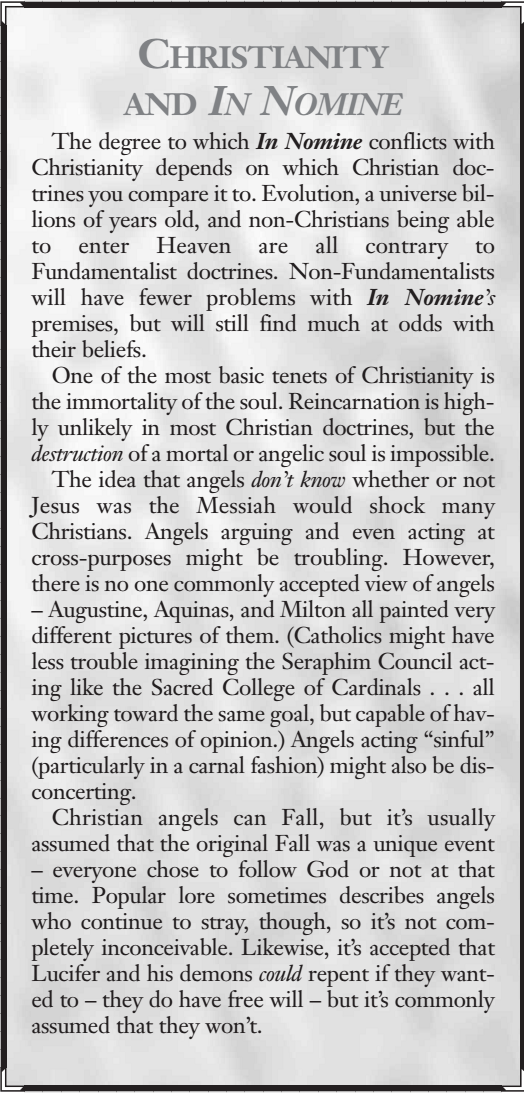
All Christians, definitionally, believe in the divinity of Christ as the Son of God. They differ a lot on what that means, but usually, Christ is seen as a pefectly created human who was born, lived and died without sin. Early Church history had vital questions bout whether Jesus was God or man, and the most vital tenet of the Nicene Creed was that he was God made flesh, of the same substance as the Father. This also estalbished the existence of the Holy Spirit as the third equal part of the trinity. Almost all Christians accept this idea today. Angels, except those who are themselves Christian, mostly see it as an attempt to rationalize the ineffable. Original sin, meanwhile, is one of the most divisive issues of Christiantiy. All agree that mankind is tainted by it, and so can no longer enter the kingdom of God, as God cannot suffer imperfection in His presence. Christ was sent to save mankind of their sin. Most Christians, including Catholics, hold that Christ's intercession will allow anyone into Heaven, even unbelievers, but following Christ offers the best means of salvation. Many Protestants, especially Fundamentalists, however, state that only by explicit acceptance of Christ as Lord and Savior allows entry to Heaven, and all others are damned. Celestials, of course, know that this is not so, so Laurence and Dominic attempt to soften this exclusionist attitude. Demons, however, find it an entertaining and useful tool.
Christian scripture was compiled into its final form around the 4th century, and the Christian Bible is the basic canon for most Chirstians. The New Testament was mostly written in the century after Christ's death, while the Old Testament is the Hebrew Bible. The most famous Protestant translation is the King James, while both Catholic Churches use a Greek version or a translation from the Greek for the Old Testament, including books most Protestants consider apocryphal. Different denominations treat Scripture differently. All give them great authority, equal to or superior to church tradition, but Fundamentalists regard the Bible as the literal and inerrant word of God.
Eschatology is a minor part of Christian doctrine, but of great interest to celestials. The eschaton is the end of world, or Armageddon. It is described in detail in the Book of Revelation, but inrepreting the visions of Saint John has been the job of many theologians for centuries. All Christians agree that Christ will someday return, an some believe it will be presaged by wars and cataclysm, while others hold that there will be a relatively shorty transformation of the world order before Christ begins his thousand year reign. Somewhere in the period, they gneerally hold that the faithfull will all be snatched to Heaven. Other works of Saint John mention the Anti-Christ leading the forces of evil and being crushed by God's forces during Armageddon. Some angels do believe a Messiah will return, but all are exasperated by humans trying to predict the time of return. Armageddon will come, they hold, only when God wills, and He will send a clear sign. Demons, likewsie, believe the apocalypse will happen...but they're going to choose how and when.
Now, Islam ! Malphas and Nybbas have been running a smear campaign for most of the last century, but Islam has actually had more Heavenly support than the other Abrahamic faiths. Technically, anyway. See, in the 7th century, some angels were getting disappointed in monotheism. Sure, it was a good idea, but implementation wasn't going well. Jews were scattered, the Christians were using theology for political gain and paganism was as strong as ever. Maybe an angel would have to show them how to actually serve God, they muttered. In 610 AD, Gabriel appeared to a merchant from Mecca, a member of the Quraysh tribe known as Muhammad, and informed him that Gabriel was the messenger of God. For 23 years, he received revelations, which he commanded his followers to memorize and record. These, once compiled into a book in 650 AD, became the Quran. Yves claims he told Gabriel exactly what to tell Muhammad, and has declined to share whether the words of the Quran are his or God's. Dominic, however, compared the Heavenly Quran with the Earthly transcription and found discrepancies. He accused Gabriel of taking liberties and tried the Archangel for heresy. Before the trial ended, Gabriel stormed from Heaven and began the self-imposed exile that is still ongoing. She also began to take female form far more, which some have taken as a deliberate attempt to distance herself from Islam. Dominic still suspects Gabriel manufactured verses for her own ends, and Uriel certainly also believed this. Others believe gabriel added material that God revealed to her, for she is a prophet. Others say Muhammad added the lines himself, as a prophet. They claim that Yves might have chosen Gabriel as messenger to spark revelations that he could not deliver himself. Michael suspects Yves of darker motives, wondering why he is so mild in his defense and will not reveal the truth once and for all.
However it arrived to him, though, the Quran was Muhammad's mandate to lead his pagan kin to God, and Islam expanded faster than any previous religion. By his deathi n 632 AD, almost all of the Arabian peninsula followed Muhammad's religion. Within a century, most of the Middle East and North AFrica was Muslim. While mostly it was pagan gods who were threatened, Hell was also alarmed. Never before had Heaven acted so directly to create a new religion, so they had to oppose it. Malphas began to try and break apart the Muslim empire, while Baal and Belial (who both had local roots and deep hatred for Gabriel) also began to work against the Muslims. Uriel assigned Khalid, angel of Faith, to test if Islam was truly divine. Khalid follow the expansion oif Islam into Europe and saw their defeat at Poitiers against Charles Martel. He was more impressed by Muslims than Christians, and he is said to have been relieved when Uriel was recalled. The beginning of the golden age of Islam coincided with his elevantion to Archangel, and in 750 AD, Islam was no longer just an Arab religion - it embraced all people of all nations, with a flowering of arts and sciences. However, with this globalism came increased demonic pressure and divisions. Gabriel and Yves had both turned their attention away from religion, and Heaven seemed to no longer care. Khalid felt that he was being ignored as he tried to defend Islam...and then came the Crusades, where most ARchangels either stayed neutral or sided, with Laurence, against Islam.
After the Crusaders and the Mongols, Islam entered a darker age, and Khalid became bitter. Centuries later, in many respect,s Islam remains strong - it's the dominant religion in the Middle East and much of southeast Asia, and there are mosques in every nation. But Islam is no longer the dynamic force of social change it once was, and often fights amongst itself. Muslims, like Khalid, often feel surrounded by enemies, misunderstood and unable to adapt. However, Islam is not a lost cause. Today, while some ARab and Iranian Muslims remain fundamentalist fanatics, a growing number favor dialogue with the West, and many live in the West, spreading the message of Islam as a religion of piece. And there's certainly many Muslim Soldiers and Saints.
No single authority but the Quran is recognized by all Muslims. Khalid himself avoids divisions, but Islam does have them. The Sunni sect is the majority of Islam today, and it is literally the 'religion of the majority', focusing on popular consensus and social unity while suppressing minority doctrine. Sunni doctrine is based primarily on the Sunnah and hadiths that make up Muslim law, which Dominic himself respects. The Shi'a sect was founded in the 7th century to protest Ummayyad rule. Shiite legitimists supported the succession of Ali, Muhammad's son-in-law, and today still commemorate the martyrdom of Ali's son, Hussein. They demanded the Caliphate be restored to the Prophet's family, and since then, they have developed a greatly differing theology from the Sunni majority. They hold that truth can come onlky from a divinely appointed Imam, a descendant of the Prophet. They believe, largely, that there were 12 Imams, the last of whom ascended in the 9th century. Shiite mujtahids claim to receive guidance from the Imam when interpreting doctrine. Shiites believe that at the end of time, the Imam shall return to transfigure the world. Shiism was once a major force of Islam, but now only Iran is ruled by Shittes, and they are a minority in other countries.
The Isma'ili sect was a subsect of Shi'a, formedi n the 8th century as a result of dispute over the successor to the 6th Imam. Most Shiites held it was Musa al-Kazim, but a minority supported his elder brother, Isma'il, becoming the Isma'ilis. They splut further into the Seveners, who held that Isma'iul was the final Imam and that his son would return at the end of time as the Mahdi, and the rest of the Isma'ilis, who held the line continued into the Fatimid dynasty in Egypt. The Isma;ilis were heavily infiltrated by celestials from the start, with Malphas originally being responsible. One group, led by Hassan-I Sabbbah, took control of the fortress Alamut in the 11th century, becoming the sect known as the Assassins. they were destroyed in the 13th century by the Mongols (whom some claim were supported by Asmodeus and/or Dominic), but their parent sect survived and millions of Isma'ilis still exist in India, Pakistan, Syria, Iran and parts of AFrica, under the leadership of a living Imam, the Aga Khan. A splinter group, the Druze, split off in the 11th century to become their own religion, now found in the hills of Lebanon, Israel and Syria.
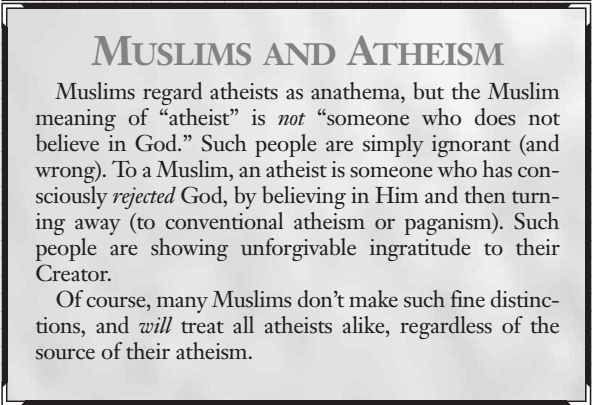
There have been other sects, but only a few survive now. The most famous are the Sufis, mystics active since the earliest days of Islam, who began to form larger orders in the 12th century. Their missionaries are a deep contrast with more worldly Muslims, and at least one order, the Muradi Sufis, are actually a network of Soldiers of God. The Ahmadiyah were founded in India in the 19th cetury as a reaction to Christian missionaries, and their leader, Mirza Ghulam Ahmed, tried to syncretize all religions and claimed to be an incarnation of Muhammad, Jesus and KJrishna. The Ahmadi are still active, but often persecuted by other Muslims. The Black Muslims or Nation of Islam are an American sect developed after WW2, led by Elijah Muhammad, who claimed to be a prophet and who mixed Islamic practices with black separatist politics. Malcolm X was their most famous spokesman, but was assassinated in 1965 after breaking with the Nation of Islam to follow more conventional Islam. They changed their name in mission in the 70s, but a splinter group led by Louis Farakkhan remains a political force in the US, based out of New York City. They bear little in common to mainstream Islam, but there is some interaction. Demons have prayed on their aggressive and separatist message, but angels of Stone have also found them to be strong communitarians and useful allies.
Islam's exact tenets vary between sects, but some are basic. First, the idea of separating Church and State is rather alien and irrational to Islam. It's not just a religion - it's a way of life. It is the most umcompromisingly monotheistic religion, allowing no other power but God. God is omnipotent, omnipresent and omniscient. Nothing happens but by God's will. There is a very strong sense of predestination, and free will remains a hot topic among Muslim philosophers. Sunni doctrine does not allow for free will, as that would imply thought and action can come from any source but God. Shiites and many liberal Muslims differ on this point. Because all comes from God, it is blasphemous to credit anyone bot God for anything - you don't thank someone for a service, you think God for causing His agent to help you. You never praise yourself or others for achievement, but God for making it possible. Obviously, not all Muslims follow this strictly. The idea of the Trinity is blasphemous to Islam.
Next time: More Religion
The Dar al-Islam
Original SA post In Nomine Game Master's Guide: The Dar al-Islam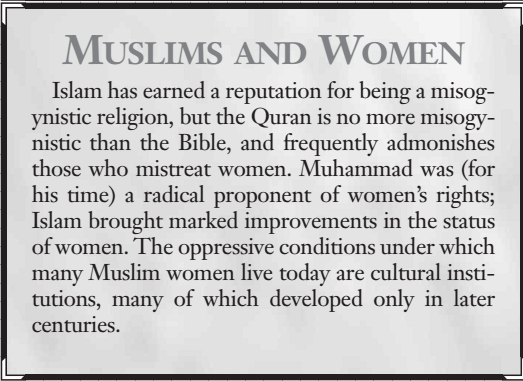
While Muhammad says in the Quran that he is just a man, Muslims believe he submitted himself totally to God's will, and thus that his behavior and person were so exemplary as to be beyond question, to the point that some become violent at any aspersion on the Prophet or his family. Devout Muslims follow any mention of the Prophet, spoken or written, wht an honorific like 'peace be upon him', and Christians once believes Muslims worshipped Muhammad, despite the blasphemy of this suggestion. Muslims also revere Judeo-Christian prophets and consider themselves to follow Abraham. They regard Christ as a prophet but not the Son of God, and Sunni believe that Muhammad was the final prophet, bringing the last and most perfect revelation. Other sects sometimes believe there have been other prophets.
All Muslims revere the Quran, dictated to Muhammad by the Archangel Jibril (ie, Gabriel). It is a flawless and complete work containing all wisdom needed by humanity. It is original Arabic, it is both beautiful poetry and a collection of Truths. Some Muslims consider even translating it sacrilegious. The Quran contains a mix of history (similar to that of the Bible but differing in detail) and moral guidance given by God to Muhammad. Jewish and Christian scripture is also seen as holy, but superseded by the Quran. As with any scirpture, there are various interpretations, so use of hadiths as additional doctrine has developed. Hadiths are quotes of the Prophet or stories of his life, recorded separately from the Quran. Because Muhammad obeyed perfectly, his words and deeds must therefore be examples of how to behave and can be used for guidance, but there is much debate over which hadiths are authentic.
All Muslims observe the 'five pillars' Muhammad prescribed. The first is shahada, the profession of faith, which must be uttered at least once with true understanding and sincerity. This is the sole requirement for becoming a Muslim. Second, prayer. Muslims must pray regularly in the direction of Mecca, and Sunni Islam mandates five daily prayers. Muslims also traditionally gather on Fridays at a mosque for public prayer and sermon. Other sects have different rituals and numbers of prayers. The third pillar is zakat, an obligatry tax of 'purification' which is to be spent on care for the poor. In medieval times, the Muslim governments collected zakat as a tax, while in modern tmes it is treated like tithing - a voluntary gift to charity. The fourth pillar is fasting during the ninth lunar month, or Ramadan. No eating, drinking or smoking from sunrise to sunset. People who are ill or traveling my postpone the fast and make up an equal number of days later, and the elderly or chronically ill may feed the poor instead of fasting. The final pillar is the hajj, the pilgrimage to Mecca. All Muslims are expected to make the hajj at least once, where they will perform a number of rituals, including circling the Kaaba, a giant cube-shaped shrine housing a black stone, once a pagan shrine and now a Tether to Faith.
The concept of 'jihad', sometimes known as the sixth pillar, was introduced by the Khawarij sect in the 800s. While many Muslims do practice jihad, or holy war, it isn ot a part of orthodox Muslim doctrine. Muhammad preached against mandatory conversion, and while the Muslim empire did expand by conquest after his death, conquered people were never required to convert - and, in fact, were forbidden to at first. Only in later centuries did Muslims begin forced conversion. More recent theologians have often interpreted jihad as spiritual warefare, by pen and not sword, or against one's own desires.
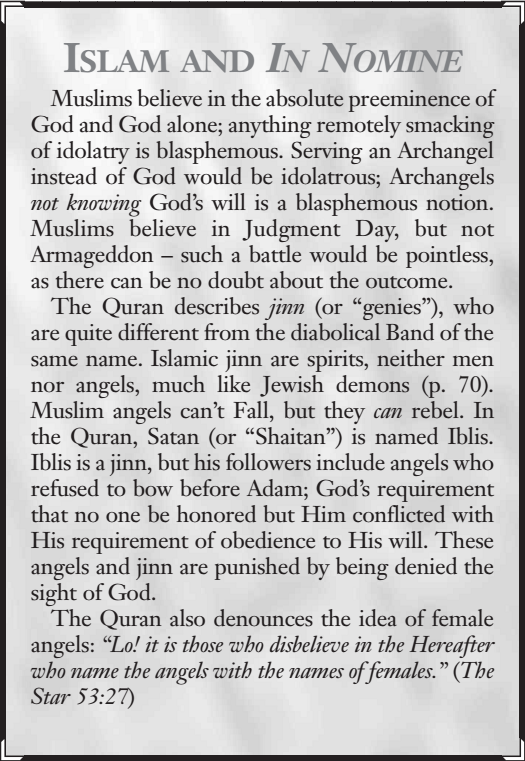
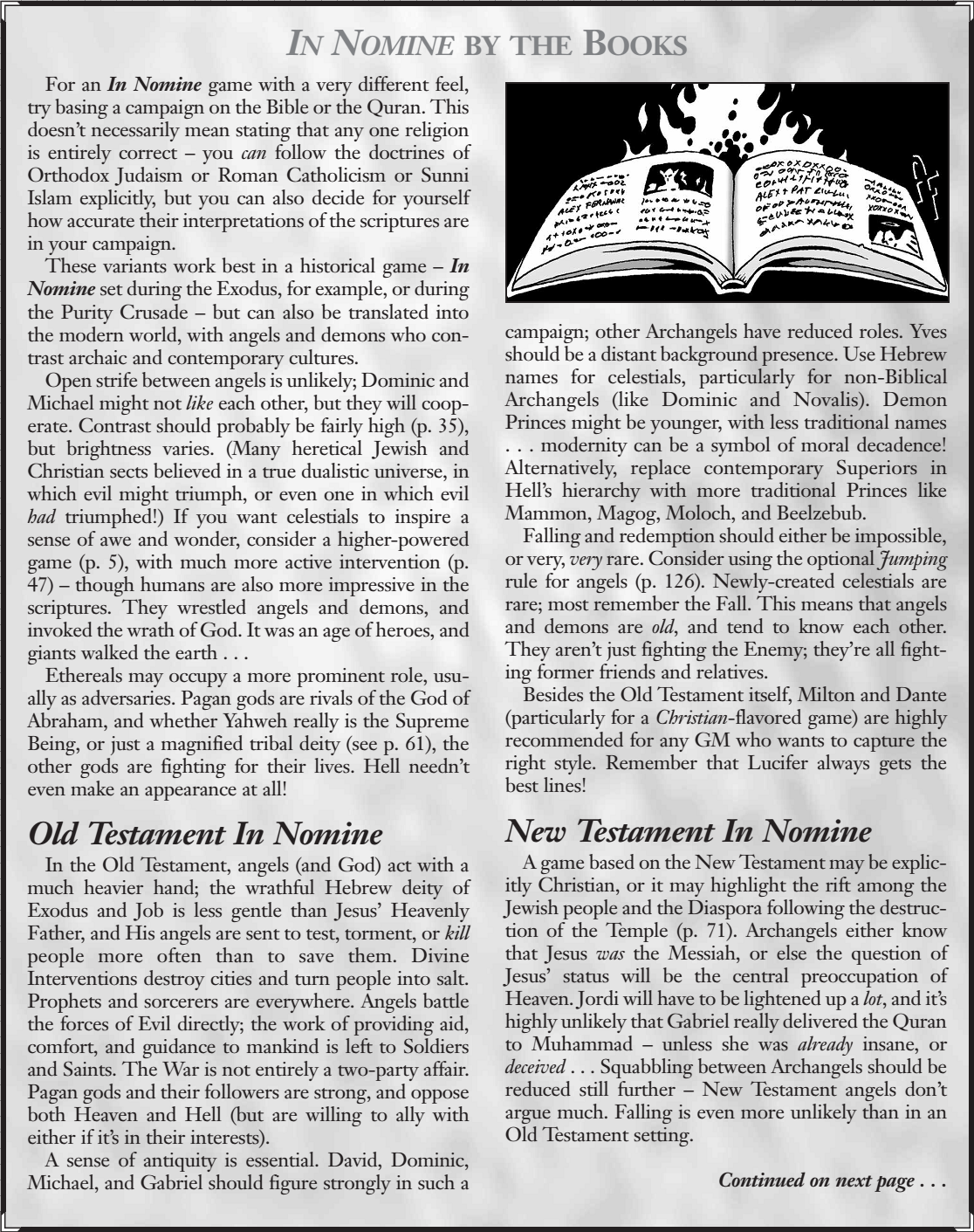
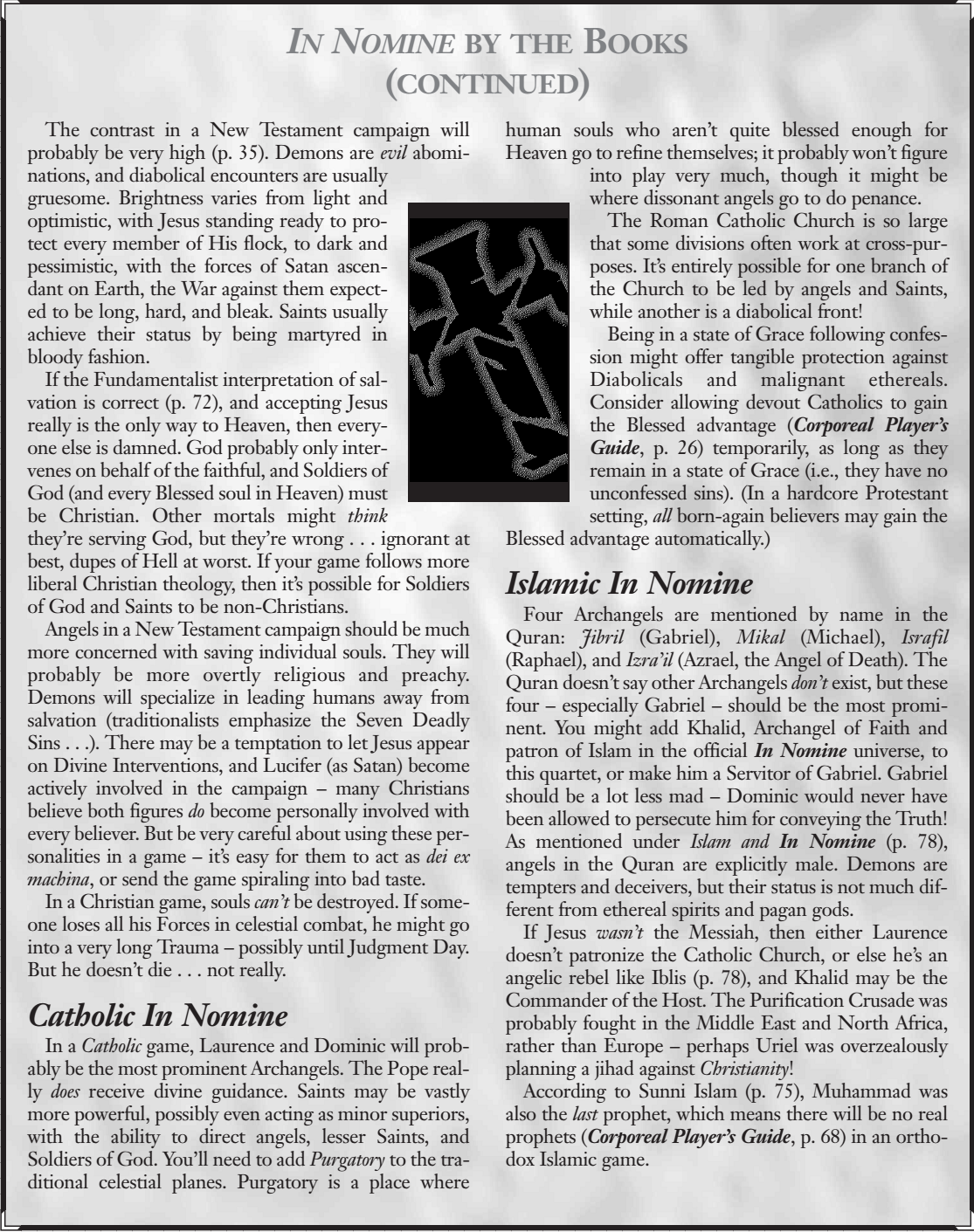
Eastern religions is a convenient if not wholly accurate or inclusive label. They are often monist, and from Heaven's view, they are (barely) divine religions. The many gods of the Taoist and Buddhist pantheons do not appear in the Marches, but the Hindu gods do, and are quite powerful. Dominic has not labeled these religions heretical, but is known to dislike them. So, Buddhism! Buddha means 'Enlightened One' and the original Buddha, Siddhartha Gautama, was born between the 6th and 4th centuries BC in India. His birth and upbringing have many contradictory stories, clouded by ineffability. Buddhists believe that his incarnation was just the last in a long line before he finally achieved Nirvana. In Heaven, the term Bodhisattva has been adopted to refer to the Blessed souls who choose to remain in the Lower Heaven to help humanity rather than ascend to the Higher Heavens. This fits fairly will with most Buddhist doctrine, as most sects believe there are many bodhisattvas active on Earth at any given time. Buddhism is immensely important to, quote, "the Orient." There's around a billion Buddhists worldwide, and it's been a major force for social reform and intellectual development, and has spawned many rival sects.
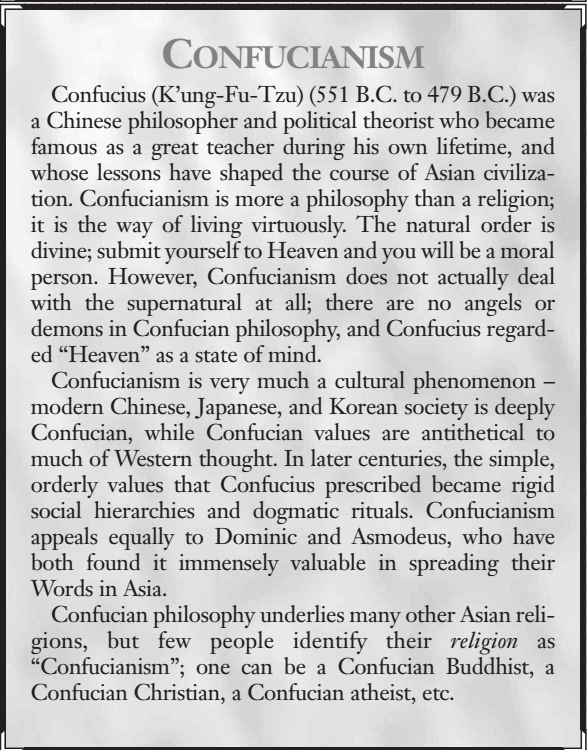
Buddhists believe in the Dharma, a set of fundamental truths: First, life is suffering. Second, the cause of suffering is desire. Third, suffering can end only by removal of desire. Finally, the removal of desire requires a carefully regulated existence. Some sects stress meditation and asceticism, others moral behacior, othersm ysticism. Most follow the Eightfold Path of Right Knowledge, Right Thinking, Right Speech, Right Conduct, Right Livelihood, Right Effort, Right Mindfulness and Right Concentration. To a Buddhist, the world is an illusion and all thoughts and desires are artificial burdens placed on people by themselves. Good actions gain good karma for the next life and bad actions gain bad karma. Buddhists believe in reincarnation, and the ultimate goal is to end the cycle and achieve Nirvana, or oblivion.
There are many Buddhist sects, but three main forms. Theravada Buddhism, also known as Hinayana or Small Behicle (meaning salvation for only a few) is dominant in southeast Asia and is the oldest and most orthodox school. It emphasizing the Four Noble Truths and meditation. The Buddha is a sage but not divine, and scriptures are written in the ancient Indian language of Pali. Mahayana Buddhism is mainstream in China Japan and Koreana, and it literally means 'great vehicle' or salvation access to the masses. The Buddha is an incarnation of godhead, and the idea of bodhisattvas exists. Scripture is in Sanskrit. Subsects include the Pure Land of Japan, who call on the Amitabha Buddha to go to the western paradise when they die, the Tendai sect that attempts to synthesize many schools of thought into one, and Zen or Chan Buddhism, which has become rather fasionable with angels of War. The final and most esoteric major type is Vajrayana Buddhism, strongest in Tibet and parts of India, which has a large pantheon of gods and focuses on meditation, chanting, yoga and ceremonies. Eli is rumored to have studied Tantric ritual with Vajrayana bodhisattvas.
Buddhists that show up in Heaven tend to be surprised and rather disappointed until someone points out Jacob's Ladder. Some believe that the Higher Heavens are actually Nirvana - the end of the illusion of self. EVen Dominic cannot say that he knows this to be wrong. Still, a high percentage of Buddhists in Heaven choose not to ascend for some time, remaining behind as bodhisattvas to help others on the path.
Taoism! Founded by the philosopher Lao-Tze, who livedi n the same time as Confucius. Unlike Confucius, his philoisophy takes a metaphysical view. By 440 AD it was one of China's state religions and has been highly influential in Asia. The main source text is the Tao-te-Ching. The Tao, or 'the Way' is said to be the eternal first cause of the universe, an omnipresent force that permeats all things. To be in harmony with the Tao is to be one with all. Taoism does not believe that the universe is an illusion or that individuality doesn't exist. Rather, by accepting unity with the Tao, one may act upon the universe. Passivity is action, and time is cyclical. Taoists hold that virtuousness is a worthy goal, and that the Three Jewels of Taoism are compassion, moderation and humility. Humans are viewed as essentially good.
Taoism is rather esoteric and can be interprted in many ways, generally including the concepts of chi and the balance of the dark and earthly female yin principle and the light and heavenly male yang principle, which must be balanced. A mystical Taoist tradition has become popular with the masses and is rather unlike most of the things Lao-Tze taught. The I Ching, or Book of Changes, blended Taoist with fortune telling, and Taoism also led to Chinese alchemy and other mystical practices. An immense hierarchy of gods and priests developed, but perhaps due to the underlying monism, Taoist spirits have never appeared in the Marches. Angels that study Asian philosophy tend to appreciate taoism. Angels of Creation particularly are known for syncretic beliefs combining monotheism and Taoism. It is also popular among angels of Flowers and the Wind. Dominic does not approve but has found no actual heresy.
Hinduism is Indian, and has both influenced and been influenced by Buddhism in many ways. Ginduism has nearly 700 million followers, mostly in India, and their gods continue to confuse Heaven. Hindu scripture is based on the Vedas, which contain instructions for social and religious ritual, including the basis of the Indian caste system, as well as prayers to the gods, and also on the Upanishads, which comment on the Vedas and elaborate on the Vedanta, or Hinud philosophy. Other scripture exists as well, such as the epic and moral stories of the Puras, most famously the Bhagavad-Gita. All of this is in Sanskrit and is considered divinely inspired.
There is no orthodox Hinduism. The religion has no founder, no organization, no religious authority and no universally accepted tenets. It is an amalgam of many beliefs, serving as both a religion and culture. Some beliefs are common to most Hindus, however. Like Buddhists, they believe the world is an illusion, called maya, and they seek to escape the illusion and reunite their consciousness with the Brahman, much as Buddhists seek Nirvana. Hindus believe in karma, which can move you up and down the cycle of reincarnation, but they feel it is most desirable to have no karma and thus escape the cycle entirely. From a Heavenly perspective, Hindu cosmology is shockingly accurate - it divides the world into the physical universe of the First World, the astral plane of the Second World where angels and spirits live, and the Third World of spirit, where the gods live. There are no official sects of Hinduism, but many different school of thought. Most modern Hindus divide between Vaishnavism and Shaivism, representing paths to enlightenment via Vishnu and Shiva respectively. The god Brahma, while recognized, is not worshipped. There is some rivalry between the groups, because Malphas.
Hinduism has been called both polytheist and monotheist, and the truth is it's closer to monolatry, pantheism and panentheism. There are said to be 333 million gods, but above all is the One God, Brahman. The Vedanta says Brahman is an impersonal Creator and Absolute Truth, with roles as Creator, Maintainer and Destroyer. All souls come from Brahman and must eventually merge back with Brahman. Hindus worship God by worshipping His manifestation in all living things and the hierarchy of gods below Him. In practice, most worship one god primarily, usually Shiva or an avatar of Vishnu. Hinduism is a divine religion and recognizes the Supreme Creator. A lot of Hindu worship seems to strengthen angelic Words. However, the Hindu gods manifest as ethereals. It is unclear why, but angels believe it is because Hinduism was not originally monotheistic. Indian religion has always been syncrete, and Hinduism is the sum of beliefs collecting for millenia. The Hindu gods were originally worshipped as any pantheon, and their current incarnations that share Essence with Heaven are a relatively new development. Sharing doesn't seem to have hurt them, possibly due to India's immense population. The most powerful Hindu gods are Brahma the Creator, Vishnu the Protector and Shiva the Destroyer and Renewer. All three are said to be omniscient and omnipotent, representing different parts of reality. They certainly are the most potent ethereal gods in existence, and rumored to be nearly equal to a lesser Archangel. However, they avoid any confrontation with Heaven quite carefully and almost never manifest on Earth directly. Vishnu also has many avatars, which are worshipped separately - most famously Rama and Krishna. There are also many lesser deities, like the storm god Indra, the elephant-headed Ganesh, the monkey god Hanuman (misspelled as Haruman) and the goddess Kali. Their histories and relationships are quite complex, and while not all have appeared as distinct entities, it isn't clear which ones exist as ethereals and which are just guises of more potent gods. Some celestials believe only the Brahma-Shiva-Vishnu trinity actually exists, and all other Hindu ethereals are manifestations of one of the three. Some even believe the three are a single entity. If either is true, the Hindu gods would be even more potent than Heaven believes.
The Purity Crusade never made it to India, and some say the Hindu gods were the last on Uriel's list due to their relatively benign nature, while others say India was just too inconvenient to get to and Uriel was called back before he could begin to fight them. However, it is known that Purity did puruse the Australian and South American gods. Two heretical rumors are whispered even in Heaven. One holds that Uriel was unsure he could actually defeat Brahma, Vishnu and Shiva and was trying to get more support first. The other says that other Archangels made pacts with the Hindu gods and diverted Uriel away from them. Certainly, in the old days there was some friendly dealing. Eli socialized with Hindu gods enough to bother Dominic, and Michael regarded Vishnu as an ally against Hell. Gabriel, Jean, Janus and several others were known to have chats with Shiva. Since the Crusade, relations have become more distant. Dominic has forbidden any traffic with ethereals, and made no exception for the Hindus. Some Archangels have even gone so far as to have angels masquerade as the gods, to try and cut off their Essence supply. It doesn't seem to have worked, and the Hindu gods remain aloof from Heaven but great foes of Hell.
Next time: Pagans
Ultima 8
Original SA post In Nomine Game Master's Guide: Ultima 8Pagan religions, we recall, are those whose worship channels Essence to ethereals, either through pagan Rites or belief. Paganism is much weaker than once it was, thanks to Heaven's warring on it for thousands of years, both via missionary theology and the Purity Crusade. Dominic has banned all associations with ethereals and discourages and sympathy for pagans. Angels of the Sword guard the Marches and hunt down ethereals that manifest on Earth, but some angels want to reach out to the more benevolent gods. And, of ocurse, belief in God and gods are not mutually exclusive. All eatern religions are polytheistic to some extent, but because of their divine associations, they are not labeled pagan by Heaven. Heaven claims that all ethereals are made of human belief, mere Essence-constructs of imaginination, but some claim to predate humanity and Heaven. Certianly, some ethereals have gotten quite old and have received Essence under different guises for a long time.
Polytheists believe in and worship anywbere from two to infinite numbers of gods, though few pantheons have ever had more than a hundred or so and few religions could sustain so many. Once, there were many pantheons - Greek, Roman, Egpytian, Scandinavian, Chinese, Japanese, Azxtec, Inca and more. Most suffered greatly in the Purity Crusade, though in some cases this had little corporeal effect - the Greek and Egyptian gods hadn't been worshipped in centuries when Uriel stormed Olympus and Heliopolis. The Aztecs, on the other hand, had their gods wiped out centuries before the Conquistadors came. True polytheism is rare these days, but not extinct.
Some pantheons hang on thanks to isolated devotees. Odin, Apollo, Isis, Tezcatlipoca, whatever. Their tiny following is rarely enough to empower them, but it can keep them alive. More importantly, even one believer can recruit others, and from enough, a pagan god can gain priests and pagan Soldiers. For this reason, Laurence and Dominic continue to agitate against paganism. The Seraphim Council has forbidden killing pagans after Uriel's excesses, but Heaven is to discourage them, either by conversion or harassment. This has done little to endear the angels to ethereals, or to endear monotheists to pagans. Hell persecutes pagans also, because they don't want ethereals to gain any Essence except from Beleth or Nybbas.
Neopaganism is a relatively modern thing, often associated with the New Age movements begun in the 60s. Neopagans have a vast array of beliefs, from those that worship the old gods to witches or druids to UFO cults or worshiping of Lord of the Rings characters. Most neopagans claim to be trying to reconstruct ancient religions, of which Wicca is the most famous. Most, however, havel ittle knowledge of any true ancient beliefs, and instead have constructed entirely new systems using old names. Sometimes this is deliberate, sometimes not. And even so, this can be enough. The old gods aren't picky. Most neopagan activity doesn't exactly do much, but some of it does feed ethereals, and the more popular deities have gotten much stronger recently. Blandine and Laurence believe that some of the gods neopagans pray to aren't actually the old ones repackaged, but newly made gods. While all of these deities remain weak compared to their past selves, it's cause for concern., Demons also sometimes harass neopagans on principle, especially when they worship gods that aren't allied to Beleth, but they also sometimes find neopagans usefully credulous.
Satanic cults are largely fictional. They don't really exist. The Church of Satan and other official denominations don't really believe in demons, let alone Satan - he's just a symbol of their rejection of social mores. Angels dislike them, sure, and demons can sometimes recruit from them, but for the most part both sides see them as a joke. Mainstream Satanism might very rarely send Essence to Lilith or some other Prince, but it's not enough to notice. Real satanic cults do occasionally form, worshipping demons and evil. These cults do provide Essence to Princes! However, they are inherently unstable, being mostly made of disaffected losers and sociopaths. Few last long - they fall apart or the police track them down if they start actually doing human sacrifice. Demons enjoy them while they last, while angels tend to treat them as Hellsworn even when they're not.
Animism is similar to polytheism in that it tries to communicate with supernatural beings, but they are not worshipped. They aren't godss that provide guidance - they're spirits who give material assistance, or are evil and must be kept away. Most of these beliefs derive from tribal societies across the world. Belief in totems, spirit guides or anthropomorphic traits in nature all fall under animist belief. Ancestor worship is also animist, but a single family could never provide enough Essence to make an ethereal replicant of their ancestor. Still, some thereals are known to masquerade as ancestral spirits to get at Essence, and some dream-shades can be attracted by worship. In In Nomine terms, nearly any belief that creates or nourishes ethereals is animist. Faeries are part of an animist tradition and benefit from those that believe in them. The Marches are full of all kinds of creatures - mythic archetypes, fictional characters and more - who tend to be short-lived, animated by trickles of dream Essence and then getting devoured by older and more potent spirits. Nobody worships Captain Hook or the Tooth Fairy, and few believe in them as real entities, but if enough dream about them, they can live.
Shamanic beliefs are common in primitive societies and also persist in some modern nations, such as Korea. Shamans are holy men and women who enter transcendental states to communicate with spirits. Some are true Dream Soldiers, but others have no real insight or aiblity compared to normal people.
Shintoism is the native religion of Japan, and it's a mix of polytheism and animism. Kami is a word referring both to spirits and gods, who differ large in power and popularity. The Shinto gods suffered terrible in the Purity Crusade, and to stay alive today, they have made a pact with Nybbas. Not all Shinto kami serve Hell, but enough do that angels tend to assume they do until proven otherwise.
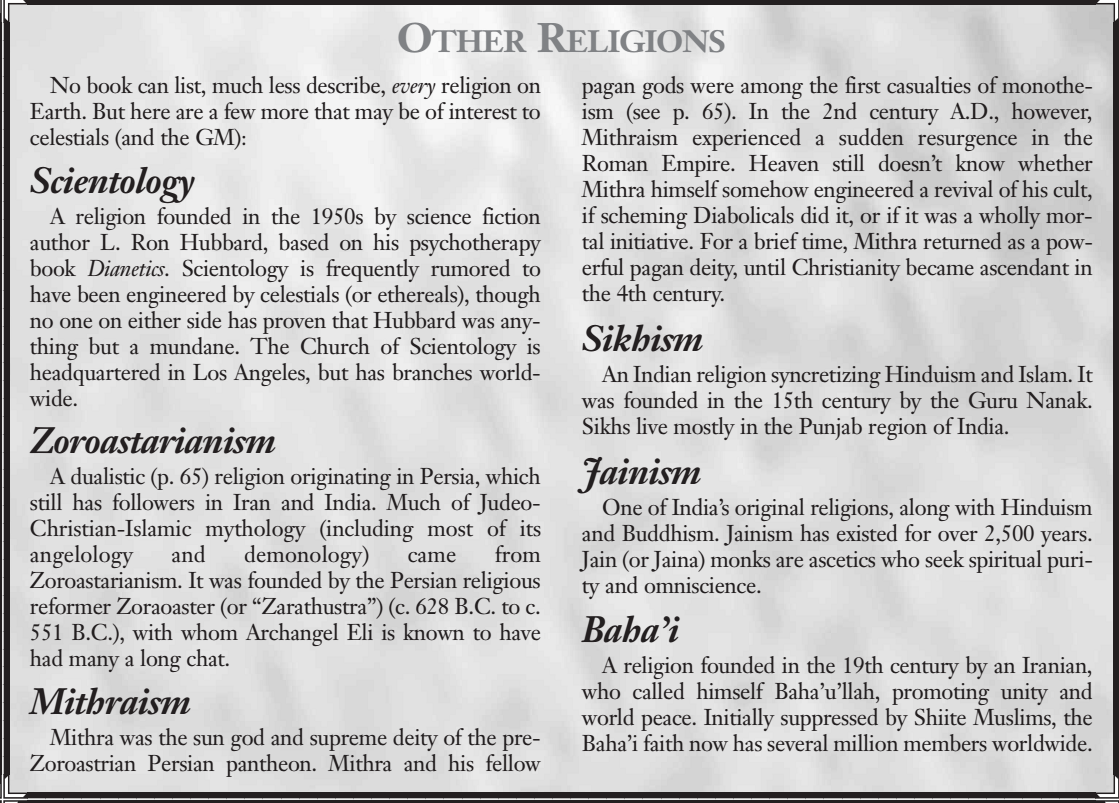
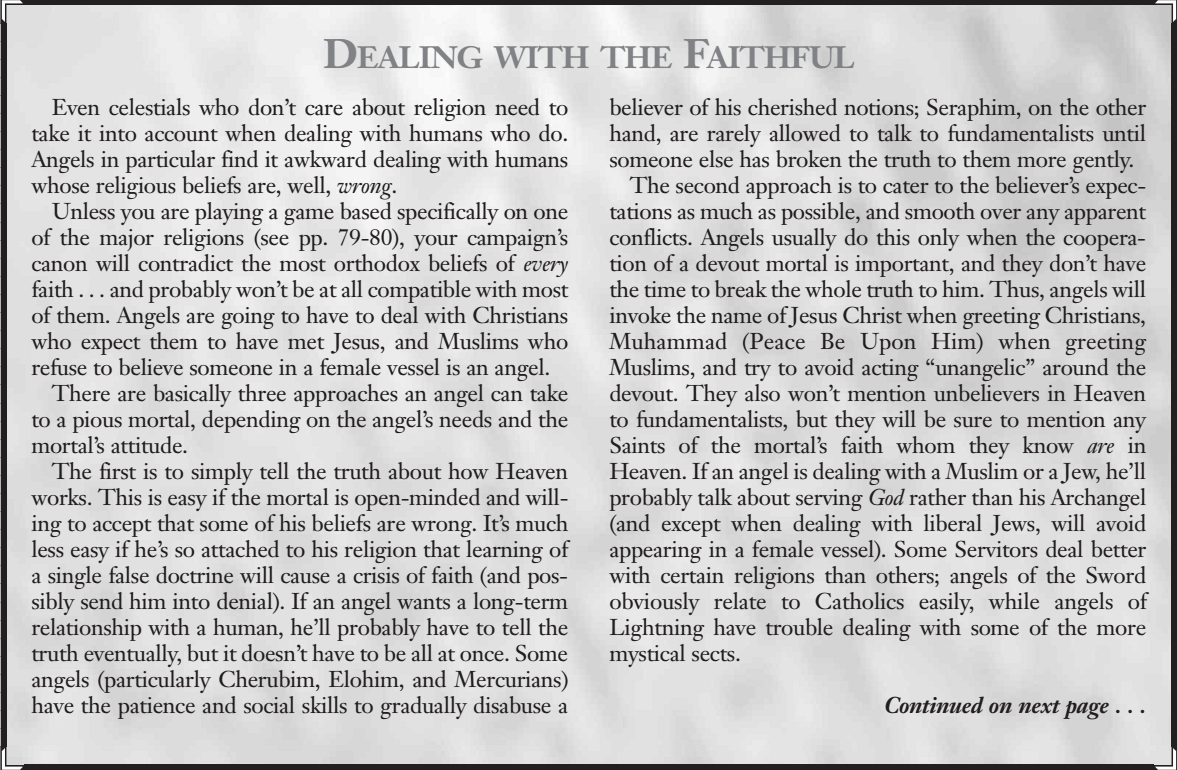
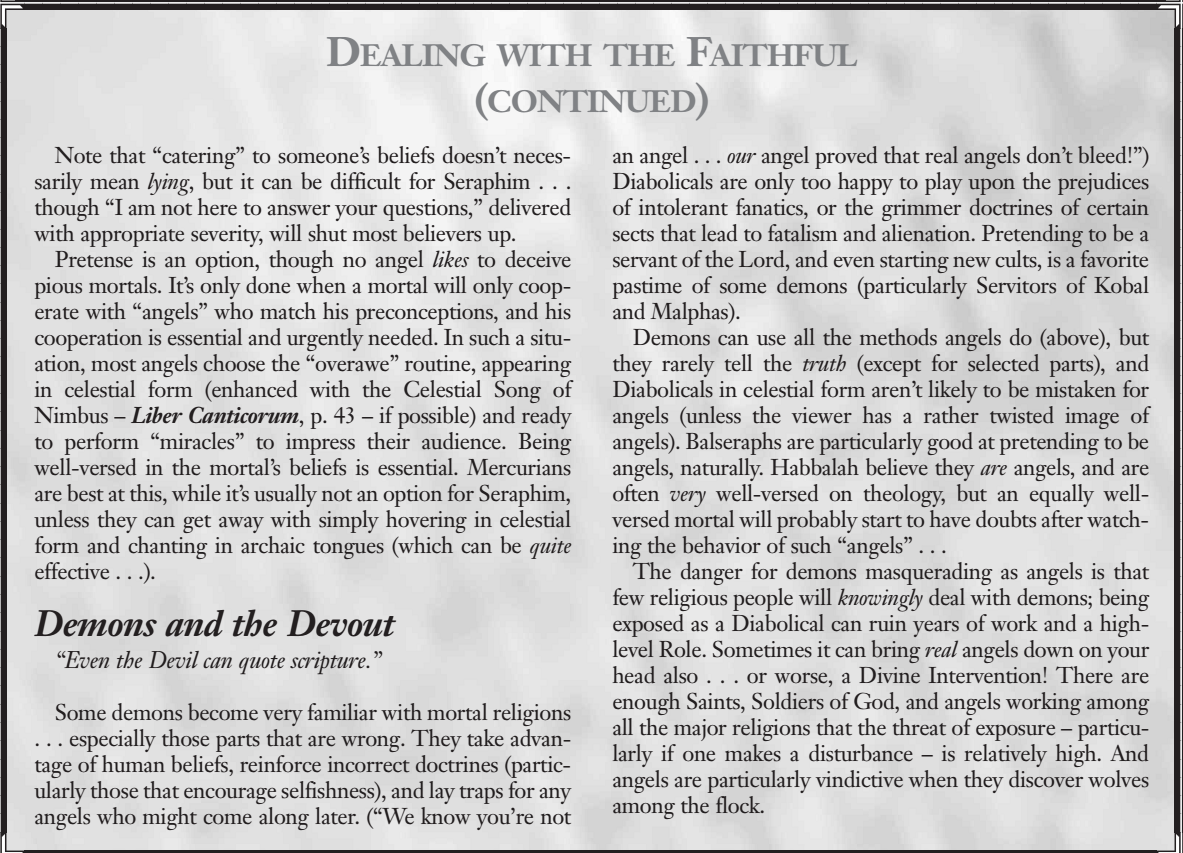
Superiors and religion! Blandine has no particular religious beliefs but appreciates religion in general as a source of mortal strength and hope. She dislikes those sects that use religion to terrify believers with hellfire and damnation. David has ancient ties to Israel and has been renewing his support of the Jews. However, he approves of any religion that is divinely inspired. Dominic supports the Catholics pragmatically, as the most effective group at fighting heresy and demons on Earth. Theologically, however, he is an absolute monotheist and comfortable with any Abrahamic faith, but remains bothered by the fact that he doesn't know who or what Jesus was, and continues to investigate when he can. Eli has always annoyed Dominic for his preference for religions and beliefs solely invented by humans, rather than influenced by angels. He used to promote mystical sect over more rationalized views. These days, no one has any idea what he believes, but he's been spotted at Reform synagogues with some frequency. Gabriel was a key figure in the birth of Christianity and Islam, but she has had no direct dealings with either in centuries and was never known to follow any one faith. She receives truths directly from God and lets others figure out doctrine.
Janus prefers religions that are radical or sects that are shaking things up. He loved the early Christians against the Jewish Sanhedrin, for example. He also appreciates religions like Vodoun, Hasidic Judaism and Pentecostal Christianity, which involve dance, song and movement in their rites, to those in which people sit around praying silently. Jean doesn't do religion. He doesn't think it's bad, but it's for humans. Jean has faith in God and does not care about the details. Jordi is surprisingly well-ifnromed on human religion. He doesn't like any of them, except for the bits about not being cruel to animals. He feels most religions are aggressively humanocentric and put man on top of the natural order, and points out that they rarely seem to stop for doctrine when killing things. LAurence is a Catholic in every possibel sense. He believes that the Church is the best hope of mankind. He doesn't discriminate against other Christians, though he wishes they'd be Catholic, and he respects non-Christians who stand against Hell, but he makes no secret of his beliefs. Angels of the Sword need not be either Catholic or Christian, but he encourages it, and he certainly won't like if they speak out or act against the Church. Few non-Christians are comfortable serving Laurence at high levels.
Marc promoted the Protest work ethic, but also approves of Muslim socialism. He prefers religions that deal with pragmatic things, like tithing for the poor or banning usury or hoarding. He doesn't care for metaphysics or esotericism. Michael is one of two Archangels named in both the Bible and Quran, and was an ancient patron of the Jews, and a later patron of hte Christians. He enjoys the Abrahamic faiths most, but finds all religions that recognize God's authority to be worthy. The Christ question does bother him a bit, mainly because Yves is so mysterious about it, but he is content to wait for God to make things clear. Novalis is a universalist - she wants people to behave and not hurt people. She has struggled to avoid being disillusioned with religion and its tendency to cause violence, and tends to focus more on individual actions. Yves was the one who came up with organized monotheism, and was instrumental in promoting Judaism, Christiantiy and Islam. It hasn't worked so well, and he claims he's sworn off trying to make new religions and that humans have enough tools now to chart their own spiritual paths.
Andrealphus loves both religions that make sex dirty and sinful and libertine cults that dance naked or have orgies. Either encourages lust, he believes. He is also working with Nybbas on a religion of entertainment. Asmodeus adores religions that have rules and dogma - especially when there's a lot of them. Legalistic requirements and narrow definitions are all fun, especially when they're written vaguely enough to damn nearly anyone for anything. Habbalah of the Game tend to be excellent theologians. Baal had ancient ties to the Levant and was worshiped as a Canaanite god. He has not forgiven the Jews for destroying his cults, nor the Christians and Muslims for rooting out the North African remnants. Under different names, he was worshipped in many places. Now, he no longer seeks this - he's happy to just see the religious kill each other. Beleth sees religion as a pitiful human delusion to cling to in the face of a hostile universe. She wants humans to use it as a crtuch rather than an aid to stand on their own. She also finds religio can spread fear as easily as hope, and encourages people to see Satan behind every problem - or whatever their particular religious bogeyman is. Belial was once worshipped, like Baal, but he didn't really notice or care when it stopped. He doesn't care about religion at all. Haagenti's primarily contribution to religion was the fact that Catholic priests were once required to drink any leftover sacramental wine, causing them to often overmeasure deliberately. He also appreciated the Conquistadors bringing chocolate back, so he has a soft spot for Catholics...though he also likes Protestant potlucks and Jewish mothers. Kobal finds religion an endless sadistic joke, and has had fun with them all - the Children's Crsuade, Pope Joan, Shabbetai Tzevi, New Age fads - the works. Kronos is satisfied with how religion has played out - it seems to be that humans can damn themselves as easily with it as without it. However, some believe he has studies showing religion leads more to destiny than fate by a stastically significant margin, and if so, he's buried the studies and refuses to discuss them.
Lilith has...issues...with God and would be happy to see the patriarchal Abrahamic religions all die. She resents the whitewashing of Adam and Eve, though she likes having Eve blamed for Original Sin, and she's very unhappy with her portrayal in Jewish midrashes as a baby-strangling monster. (Some whisper that is because it's a true characterization, at least before the modern age.) Most of all, however, Lilith hates rules and morals imposed by religion. Malphas, on the other hand, adores religion as the most useful tool ever made. There is no faith he cannot fracture, and he loves seeing how many sects a belief system can divide into before it starts a holy war. He encourages all of his demons to find religion, and always assures each privately that theirs is closest to true. Nybbas gives people sanitized reliigon devoid of any deep meaning or examination. Just believe, and all will be yours. It's a product to be marketed, and it's best sold without any complex theology or morals. Meanwhile, he is planning to make a religion with Andrealphus based on entertainment and gratification. Saminga thinks it's cool to get worshipped, and his demons have tried to promote death cults, but they never last long. Valefor enjoys that Christianity has stolen from basically every other religion, including the Essence of pagan deities, but otherwise tends to just find moral strictures annoying. Vapula is beyond the need for religion, which he sees as ignorant and outmoded. God is best sought by seeking clues hidden in the universe.
So, fate and destiny. Everyone has one of each, and they can be terrible, grand or banal. Angels try to lead folks to destiny, demons to fate. In canon, a human's destiny and fate dictate whether they go to Heaven or Hell, but some GMs may consider this too simplistic - a single act, after all, damning an otherwise good person or vice versa. Seems a bit dire, really. Angels of destiny hold that the pattern of selfishness and selflessness in someone's life predicts the results of the moment of decision. It's not just one random choice, but an outcome fashioned by the way you live your life. Demons claim it's all abritrary, but are perfectly willing to manipulate for their own benefit.
As a GM, you have to make up destinies and fates for NPCs or even some PCs. Minor NPCs can have them assigned almost randomly, but for important characters, these are potential plot hooks. Be careful about even random NPCS, however - by making a given action worthy of Heaven or Hell, you say something about their goals. The game does have some guidelines, however. Most fates and destinies are modest and unlikely to change the world. If osmeone has a great destiny or fate, they should be important, and celestials will take interest in them. Note that desinties and fates do not need to be a single moment, though. Some are lifelong trends. You might earn Heaven or Hell by one single critical act, but it's more likely to be by following your normal inclinations. Destinies and fates are also general rather than specific - 'save a life' rather than 'save Seth Carter's life.' Maybe it's 'save the life of a drowning man' or 'save the life of someone who will go on to save millions' but it's never so particular that you will only ever have one chance to do it. Your fate, likewise, might be 'kill a friend in an argument' but not 'kill a friend with a baseball bat in an argument about the 2002 World Cup.'
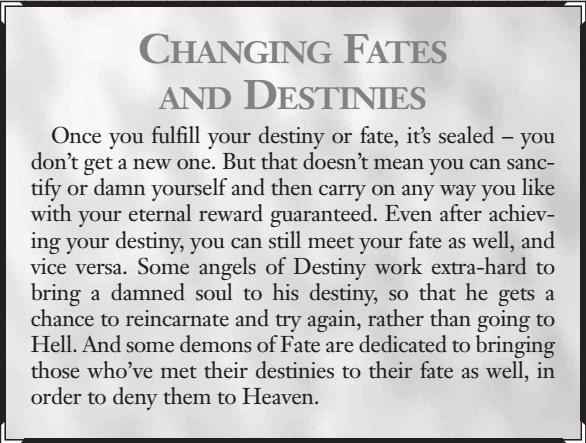
All mortals have fate and destiny. Blessed souls and damned souls, however, have closed the loop. They don't have a fate or destiny that can be perceived by any means save looking into the past. This can be a way to spot Saints or certain undead. Celestials also have a destiny or fate, but not a detailed one that can be discovered. An angel's fate is to Fall, a demons destiny is to Redeem. Most believe that angels, as natives to Heaven, have by definition fulfilled their destiny. Some, particularly those that believe in free will, believe that even angels may have individual destinies. Likewise, demons may have already met their fates by virtue of being in Hell, but might also have even darker fates. As for ethereals...no one knows. Any attempt to read them either fails or produces a result that will change next time you see them. Some say that as Essence-constructs of imagination, spirits can't choose selfishness or selflessnes and so the concepts are meaningless for them - and besides, they can never go to the celestial plane. Others believe thereals do have souls and thus may have destinies and fates.
Next time: The Grand History
THE METATRON
Original SA post In Nomine Game Master's Guide: THE METATRONOne note - achieving destiny or fate must be through free choice. Possession of the victim can't make them do it. Forcing the victim at gunpoint can't make them do it. If they do something that way, it just doesn't count. Destiny and fate must be freely chosen, period. You accidentally kill a loved one, that doesn't count. You bring someone to just only with a gun to your head? Doesn't count. The exact amount of meddling allowed is up to the GM. Some meddling must be possible to give angels and demons of Destiny and Fate something to do. But you can choose how much.
Anyway. History! In the beginning, there is light. Some time after this, Yves is created and named God. Some time after that, Michael is created as the first angel followed, in order, by Lucifer, Baal, David, Eli, Uriel and Gabriel. Some point after this, the Metatron appears. He is the Voice of God, and is never seen, only heard. The others believe the Metatron is the Seraph, and some say it was he who spoke the words 'Let there be light.' Whenever God speaks to the angels, it is via Metatron. At some point after this, the angels begin creating the universe via orders from Metatron, and Yves begins to name things. The angels create lesser angels, including Asmodeus, Beleth, Blandine, Dominic, Jean, Kobal, Malphas and Raphael.
At about 4.6 billion BC, Earth is created. At 100 million BC, the Archanges Malphas, Gabriel and David, with the aid of Gabriel's servant Belial, heat, mvoe and break up the tectonic plates. Asmodeus and Dominic begin codifying the word of God while the Archangels Beleth and Blandine begin to explore the Marches and create their Tower. Yves, Jeand and Raphael begin transcribing knowledge, and Jean and Raphael are named Archangels. Kobal receives his still unknown special assignment. Andrealphus is created and in short order becomes Archangel of Love. Janus, Jordi and Oannes are created. Janus learns to control the waves and winds, and he teaches Oannes. They become the Archangels of the Wind and the Waters. Jordi discovers how to create corporeal vessels, and is given authority over all living creatures as Archangel of Animals. In 67 million BC, Saminga is created and witnesses the extinction of the dinosaurs.
At 500,000 BC, Lucifer teaches humans the use of fire, with aid from Jean. In 25,000 BC, humans begin to develop religion. The Marches are populated by the ethereals at this time. Humans become the most selfish of creatures. Jordi decides to destroy them, but Michael talks him out of this at God's behest. Jordi regrets to this day. Dominic and Marc are given their Words and assigned to teach humans and angels how to get along properly. 23,000 BC, Yves announces that humans are to be left alone and that Earth is henceforth off limits. Many are dismayed, including Lucifer. The Eden experiment is begun. Novalis, Angel of Flowers, creates the Garden of Eden at God's ocmmand. Adam and Lilith are created, but Lilith leaves. God creates Eve to replace her. Adam and Eve live in the Garden for several years before Ophis, a servant of Baal, sneaks in and taints the experiment. God declares the results inconclusive and forbids further celestial intervention. Dominic sets the Cherub Jophiel to guard the gates of Eden. Lucifer speaks with God via the Metatron for some time, but is not satisfied.
22,626 BC - the Fall occurs. Lucifer recruits a third of the Host into his Rebellion and begins the Fall by, in his final talk with God, destroying the Metatron. Uriel, once a Seraph, becomes the first Malakite, followed by David. Lucifer is hurled from Heaven by Michael, plummeting into the farthest reaches, followed by his fellow rebels. They are trapped in Hell for a time. The final ice age begins, and Michael is named Archangel of War and commander of Heaven's armies. God lifts the ban on celestial intervention, but insists on subtlety. In 22,000 BC, the Seraphim Council is created. Dominic is raised to Archangel and forms the Inquisition. Marc becomes the first elected Archangel, and with much more debate, Novalis becomes the second. The Archangels begin to organize their formal hierarchies.
In 16,000 BC, Lilith helps the demons escape from Hell, first into the Marches and from there to Earth. Beleth begins her Tower, opposite Blandine's, and Lilith is made Princess of Freedom. Demons begin to act more openly, and the Grigori are created to guard humanity against demonic influence. In 11,600 BC, the Grigori succumb to lust and begin to neglect their work in favor of siring monstrous children, the Nephilim. David and Uriel lead their angels in slaughtering the Nephilim and rounding up the Watchers. Dominic tries them, and they are found guilty, sentence to being Cast Out en masse. The War begins in earnest, and many humans die.
2000 BC: Ethereal gods are becoming very powerful, and the Seraphim Council decides something must be done. Yves suggests Monotheism. Abram leaves the city of Ur and becomes Abraham, making a pact with God. In 1700 BC, Oannes traps and destroys his former servant, Vephar, the Demon Prince of the Oceans. In 1627 BC, Oannes is himself slain by Belial. In the battle, the island of Thera explodes, destroying the Minoan civilization. In 1600 BC, Gebbeleth, the Prince of Secrets, vanishes. No one notices. 20 years later, Michael is put on trial for the sin of Pride, promoting pagan personality cults and creating too much Disturbance. He is found guilty but God acquits him. Michael steps down as Commander and is replaced by Uriel. Thirty years after that, Saminga arrives in Egypt. He begins study of their necromantic arts and becomes quite good at it, with the aid of some Egyptian gods. He is given the Word of Death. Within 50 years, Egyptians begin to remove mummy brains in order to thwart him. In 1200 BC, Saminga becomes Prince of Death and is given rule over Abaddon.
In 859 BC, Magog, the Angel of Fortitude, spurs the Hittites, Assyrians and Sea Peoples to conquest so he may fight against Saminga directly. David confronts Magog, and Magog Falls, being crowned as Prince of Cruelty. On the very next day, David imprisons Magog and his demons beneath the desert in Egypt, with aid from Khalid, Angel of Faith. 700 BC, Mammon is named Prince of Greed. 600 BC, Eli works with the proper Zoroaster in Persia to spread monotheism. 500 BC, Zadkiel is named Archangel of Protection. In 200 BC, Uriel begins supporting hte Roman Republic and tries to keep their pagan gods under control. In 146 BC, Demogrogon, the Demon of Destruction, is destroyed by Belial before he can be crowned a Prince. In 50 BC, Laurence is created by Uriel. In 6 BC, Gabriel announces the conception of Jesus Christ.
60 AD: Yves, Gabriel and Raphael work together and cause Christianity to spread so rapidly it cuts off amny pagan gods from their Essence flow. Michael eventually supports the Christians, but becomes hostile to Yves. 325 AD - the Council of Nicea is held. Constantine makes Christiantiy the official religion of Rome, and Uriel and Dominic declare their support for the faith. Litheroy is named Archangel of Revelation. 331 AD, Laurence is named Angel of the SWord. 400 AD, Haagenti is created. He will spend 600 years as an abused familiar. 455 AD, Beelzebub, Prince of Corruption is destroyed by Uriel. 610 AD, Yves sends Gabriel to visit Muhammad and recite the Quran over 23 years. 632 AD, Muhammad dies. Dominic summons Gabriel to try him for heresy, and Gabriel storms out of Heaven and begins self-imposed exile. Gabriel soon begins assuming female form more often.
715 AD: The Purification Crusade begins. Beleth offers ethereals sanctuary for a price, and some gods flee to the Far Marches instead. 732 AD, Laurence and Khalid are present at Poitiers, on opposite sides. 745 AD, Uriel is called before the Seraphim Council for the Crusade but is unrepentant. God orders Uriel into the Higher Heavens, some say via the voice of the dead Metatron. Laurence is made Archangel and Commender of the Host. Khalid begins promoting Islam. 750 AD, Khalid is named Archangel of Faith and begins withdrawing from the Seraphim Council. 793 AD, Valefor appears out of nowhere and steals the Word of Genubath, Prince of Rapine. Genubath vanishes and Lucifer names Valefor Prince of Theft. 900 AD, Kronos appears as Prince of Fate. Some believe Lucifer found him centuries before.
1008 AD: Legion, a Shedite of Saminga, discovers how to possess multiple hosts. Lucifer names him Prince of Corruption. Legion goes mad and begins possessh umans by the dozens, then hundreds. Heaven and Hell work together to kill him, and in the end, Raphael, Archangel of Knowledge, sacrifices herself to destroy Legion. During the battle, Haagenti distinguishes himself and Kobal adopts him as a brother. 1009 AD, Haagenti is named Demon of Gluttony. He gathers an army and devours Meserach, Prince of Sloth, even before being made a Prince. After his crowning, he devours Mariel, Princess of Oblivion. 1212 AD, the Children's Crusade prompts the naming of Christopher, Angel of Children, a servant of David. 1348 AD, Makatiel, the Renegade Prince of Disease, accelerates the spread of the Black Death in an attempt to destroy humanity. Asmodeus and Dominic collaborate openly for the first time to destroy Makatiel.
1517 AD: Laurence sponsors Martin Luther and accidentally causes the Protestant Reformation. 1771 AD: Vapula, Demon of Technology, is named Prince. Richard Arkwright invents the water frame and is believed to have been Vapula's servant. 1800 AD: Alaemon, a fallen Mercurian of Revelation, becomes the second Prince of Secrets. 1864 AD: Fleurity, a servant of Gluttony, is named Demon of Drugs. 1884 AD: Nybbas and several human allies create the television in service to Vapula. Nybbas is given the Word of the Media and crowned Prince by Lucifer, and takes over Perdition. 1900 AD: Kobal begins spending less time on Earth. Eli begins assigning his angels to other Archangels. 1957 AD: Eli goes AWOL. 1978 AD: Christopher is named the Archangel of Children. 1986 AD: Crack cocaine gets Fleurity raised to Prince of Drugs. 1997 AD: Furfur, Renegade servant of Fire and Demon of Hardcore, is named Prince. 1998 AD: Khalid is brought back from the brink of a Fall. This is the point of 'now' for the game.
So, Superiors! Superiors are godlike in power, sure. The most potent ethereal gods might approach the very weakest Superiors in raw power, but none have a Superior's influence on the Symphony. Any more, at least. Only God and Lucifer can surpass the Superiors. However, they are finite. None are omnipotent, omniscient, infallible or indestructible. They are not opponents to be fought in battle, but they also should not overwhelm the game. And they can be defeated. Even lesser beings can possess tricks they don't have. Second, Superiors are limited in their perceptions and intelligence, though their limits far outstrip most others. It is hard, but possible, to outmaneuver and outsmart them. They are canny, yes, but not immune to misdirection or ego. Lastly, they can be stretched too thin. They have a large but finite number of Forces and pools of Essence, even if that number is unquantified in play. Any single action might be trivial, and no one attack will cripple them, but many such actions and attacks can weaken them. A weakened Superior is vulnerable.
Superiors shouldn't show up in person very often - they don't fight individual battles. They are potent, unfathomable, mysterious beings of immense age and strength. They should inspire awe, and so appear rarely. Direct confrontation should never even be thought of. Superiors exist on a higher levle. You fight them by attacking their servants, destroying their Tethers and undermining their Word, not using main force. Still, sometimes they will appear and person and lesser beings will try to fight. The GM can handle this a few ways. The easiest is just to narrate whatever the Superior does to you, without need for dice. Some players feel cheated this way, as Superiors are not truly omnipotent. In that case, there is a sidebar.
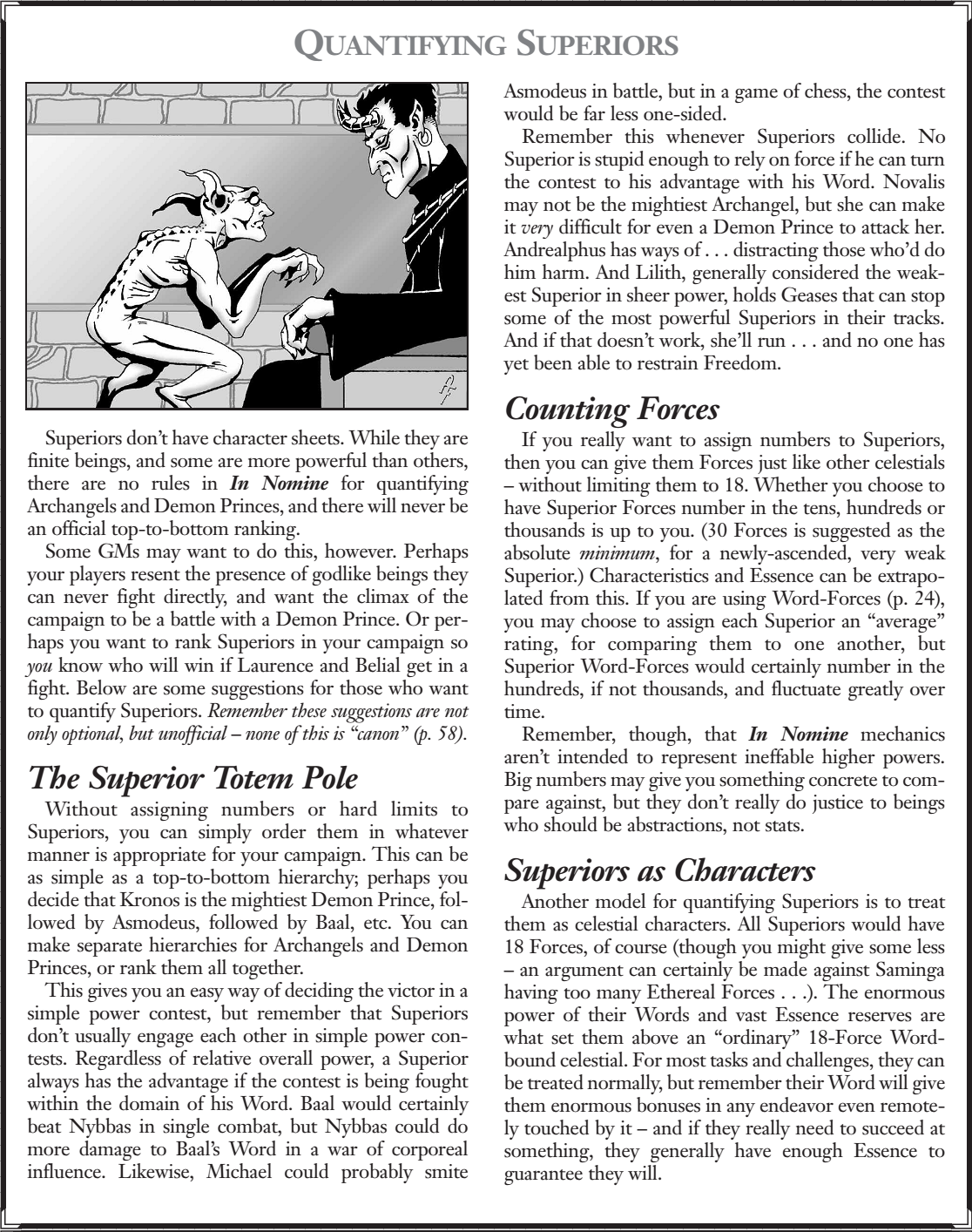
Superiors rarely fight directly. It's risky - sure, you might be more powerful, but no one can be sure what a Superior has up their sleeve. No Superior can be defeated without cost. Sure, Baal can beat most lesser Archangels and Michael can outfight even Lucifer, but it takes a lot of their energy. Even the most powerful Superior can't afford to suffer that kind of drain twice i succession, and after the first win is when their enemies will want to strike. Besides, a Superior who knows they'll lose will probably flee and not fight in the first place. Few Superiors are dumb and friendless enough to stand alone, for that matter. Alliances and the threat of escalation keeps these fights from happening. More often, there will just be posturing and token swipes before both sides pull back. Sometimes, though, two Superiors do fight and won't back down. These encounters are rare and usually brief. One wins, the other heads home. The Disturbance may be massive, but onlookers might not even see a thing. And just because a Superior loses once won't mean they'll lose again - it might just have been who was more willing to expend Essence that time.
Sometimes, Superiors will mutually limit themselves - a duel in vessels, for example, or a staredown. The nature of the conflict and who's involved may have them limit to a particular venue. Marc likes to negotiate, for example, while Janus and Valefor like card games and Asmodeus likes chess. The winner here will not be sheer power, but who has more advantage in the domain of the contest. No Superior will take a challenge they think they'll lose, though. The most serious contests are celestial combat, which is exceptionally rare and almost always ends in retreat over the chance of being weakened further or killed. Only a few times has seen a Superior die in battle. Lucifer killed Metatron. Oannes killed Vephar. Belial killed Oannes. Haagenti killed Meserach and Mariel. Raphael killed Legion but died in the process. There's been a few others, but these events are exceptionally rare and take years of preparation in most cases. It is best for the GM to take these fights offstage if htey happen - the PCs don't need to witness it, just hear the results. Being around such a contest, even a 'peaceful' one, isn't a safe place, anyway. Either way, don't use dice for these things - just pick who wins and make a story out of it, keeping in mind the ramifications the contest will have politically and in terms of power.
Superiors have a lot of power. They can do anything a celestial of their side can do, with the exception of abilities that must be learned, such as secret Songs or the attunements of other Superiors. Some powers are only available to Superiors, however, or perhaps the greatest of ethereal gods as wlel. Superiors can control loose Forces, putting them together in order to create other celestials and their Hearts, among other things. This is also why Archangels can Redeem demons. This is also what allows them to attach Forces to other beings and to stabilize Tethers. Only Superiors can impose dissonance or Discord at will - or remove them instnatly, due to their ability to configure Forces. There are limits, however - unless a celestial serves their Word or they hold the celestial's Heart, they cannot do this involuntarily. Any Superior may impose a Geas, not just Lilith, but removing a Geas is difficult and painfil, even for Superiors - they require the celestial be taken apart and put together again, and only Lilith can remove Geases easily. She is also the only Superior who can transfer Geas ownership or remove Geas-hooks. She might be able to impose Geases on someone involuntarily, but it would go against her nature. Superiors can also inflict and remove Corporeal disadvantages from humans, but need the human's consent to do anything with Ethereal or Celestial disadvantages, though this consent can be obtained by trickery.
Superiors can manifest in more than one place at once. Each manifestation is invested with some of the Superior's Forces, split up much like a Kyriotate. Each divides the Superior's concentration, and how many manifestations are possible at once depends on the Superior. Kyriotate Archangels can manage dozens, while some, particularly Shedite Princes, cannot split at all. When something requires a Superior's undivided attention, such as confronting another Superior, they will almost certainly need to consolidate into one manifestation unless they are a Kyriotate and not dividing between multiple planes of existence. Superiors are also able to block out resonances and attunements - neither will function on a Superior if they don't want it. This requires conscious effort and possibly Essence, however, so you can manage it if they aren't aware. This is said to be why Dominic wears his concealing cloak. Some Superiors also partially block resonances, allowing angels only to read what information the Superior desires them to be able to access. The exception is when Superiors use their powers on each other, in which case it's handled like any other Superior conflict. Superiors are also the only beings that can emulate any resonance of their side while preserving their fundamental nature. (Kronos may be able to use angelic resonances, but that's it, unless you allow the optional rule for angels to pervert their resonances.)
Superiors are also capable of masking or delaying Disturbances for themselves or others, though they don't do it all the time, so it clearly requires concentration and/or Essence. Superiors can also grab and take someone with them in celestial form, though evne then, it's hard to carry someone resisting them. Archangels can take demons to Heaven and shield them from the Lighto f heaven for a time, however. Princes can drag demons back to Hell, and have sometimes even done this to Renegades or angels, usually requiring them to be willing or subdued first. Superiors always know their own servants on sight, in any form, and Lilith can always recognize Lilim. They can also notice any other celestial, but this requies some focus and scrutiny, and only the Humanity attunement can stop it for certain. It is unknown of Superiors can hide from each other. They can certainly hide from other beings, but don't have to. If they choose to be recognized, their servants will always know it is them, even just by the sound of their voice, no matter the form. Other celestials will know they are a Superior but may nor know which one. Humans, even mundanes, will sense their incredible presence as charisma, holiness or dread, but get little other information.
Next time: What Superiors Can't Do
Not Omnipotent
Original SA post In Nomine Game Master's Guide: Not OmnipotentSuperiors cannot tamper with the Symphony in an unlimited way. Bending the laws of physics on a large scale takes a lot of Essence, and while Superiors have a lot of Essence, they don't have enough to alter the landscape except as singular and risky events that leave them weakened after. Superiors might be able to destroy an entire small town, but it would be at great cost and massive Disturbance. No one, however, has enough Essence to sink continents, melt ice caps, take over the weather across the planet or turn the Earth on its axis. Superiors are also unable to create corporeal life from scratch. They can make celestials or ethereals, but while the Corporeal Song of Life once gave this ability, even the Archangels cannot use this power any more except, maybe, for Eli.
Superiors cannot steal souls. Human souls go where they will after death. Not even a Superior can alter its destination, nor force it to go to another realm, even if the soul serves them. Any means a Superior might use to divert a soul requires the soul's consent. Archangels cannot force bodhisattvas to ascend to the Upper Heavens, and no soul can be sent back to Earth against its will. Thus, while a Superior can kill a human, they can't control where the soul goes. On that topic, Superiors cannot destroy souls at will. They can easily wipe out a soul in celestial form, including the souls of humans in the celestial realms. However, a being in corporeal form is not vulnerable to this - a Superior can't soul-kill a celestial in a vessel or destroy a human soul encased in living flesh without some special means, usually requiring them to have the victim under their power.
Only a soul under a Superior's control and willing to return to Earth can be returned to life - and even then it's difficult. The Celestial Song of Souls can do it under limited conditions, and Archangels can make Saints, but no Superior can raise the dead at will. Superiors also cannot alter something's fundamental nature. A human cannot be turned into an angel or demon and vice versa, and ethereals cannot be made into anything but ethereals. Mortals can become undead or Saints with their consent, but the process cannot and does not work in reverse. Inanimate objects ccan be supernaturally animated, but cannot be made alive without binding a living being into them. Other transformations, like humans to animals or a Seraph to a Cherub, are possible but very difficult, requiring the subject's Forces be taken apart and reconfigured entirely. The new configuration might not truly be the same being as before, either.
Superiors cannot grant Words. This fundamentally alters a celestial's nature, and only the combined effort of the Seraphim Council or the will of Lucifer an grant a Word to a celestial, and even these cannot give a Word to a non-celestial. How Lucifer managed it with Lilith is a mystery. Superiors cannot create Tethers. They can facilitate conditions that might lead to them, but Tethers can only form naturally, and celestial intervention in earthly events inhibits Tether formation - particularly the work of Superiors. Superiors cannot access Limbo, where the Heartless celestials go when in Trauma, by any means. All they can do is what anyone else can - send Essence to someone there. No Superiors is known to have ever entered Limbo. Superiors may also not transcend ineffability. The true nature of God, the nature of the Higher Heavens, the destiny and fate of the Symphony, the origins of certain humans, just about anything related to Lucifer - these and other things are ineffable. They cannot be known save via firsthand knowledge, and this remains true even for Seraph Archangels. Those who do know find it impossible to express.
Superiors are exceptionally distant from humans, and some never even knew what it was like to be a normal celestial. Most of them are old. Some are older than Earth itself. They aren't totally inhuman, however. They feel emotions, and all but Michael know doubt. They seek to fulfill their roles or desires. Each one interacts with the world differently, however. Some like to take on mortal form and keep tabs on current events. Others are distant and rarely leave the celestial realm. Their presence is unnerving - they have vast power, and unless they are trying to hide it, failing to notice them is essentially impossible. They have an aura around them thanks to their Words. Dominic makes people feel guilty, Gabriel inspires, everyone loves Novalis, Andrealphus makes people horny, Malphas causes arguments, and Saminga creeps people out. Even incognito, they are very confident, proud and powerful. They are also highly focused. No matter what, every Superior is intense and obsessed with their Word, even more than most Wordbound. Everything is seen through the mindset of their Word, and the Word is their basic paradigm to interact with the universe. Some subtle Superiors can downplay this in conversation, but most are easily identified - their speech is full of references and metaphors to their Word. Blandine compares things to dreams, Belial likes to talk about fire, and so on. Still, even when they're straightforward, they're hard to grasp. Even Saminga can be remarkably perceptive and far-sighted when his Word is concerned. Trying to predict a Superior is pointless.
Superiors, with a very few exceptions, all began as angels or demons of a certain Choir or Band, and they don't lose that nature. However, they do not suffer dissonance the way other celestials do. If a Superior violates their dissonance conditions, the tiny note of dissonance is overwhelmed by their sheer power. It would take many notes before their power would become noticeably out of line, and even then, they could easily cure their own dissonance. However, this doesn't mean they casually violate their own dissonance conditions. It is as painful for them as anyone, or even moreso. It's just more psychological than physical, in a sense. This is even more true of Word-dissonance. Doing these things is antithetical to them, so while they can, they never do. Violating a Word is painful for a servant, but for a Superior, it is utterly and horrible painful and defiling, done only under extreme duress. It should be cause for concern to everyone when a Superior acts dissonantly - it should only be done as part of a deliberate plot, and the prospect of an Archangel Falling or a Prince Redeeming would shake the foundations of Heaven and Hell alike.
No Archangel has ever Fallen since the Rebellion. It doesn't mean it can't happen, but it would take a lot to provoke. It would need a pattern of acting contrary to their nature, and some believe that an Archangel is so firmly entrenched in the Divine that this could only be done by a deliberate and willful rebellion - that Archangels can't just Fall, they have to jump. This theory has never been tested, however, and many believe that Khalid was close to a Fall without trying to be. If an Archangel did Fall, they would lose their Word like any Fallen, but would remain Superior-level in power, able to threaten a Prince even without a Word. Some angels debate if they'd eventually lose that, but none want to see it tested. Odds are Lucifer would offer them a Word and Principality unless he himself felt threatened by them.
Redemption is even harder than a Fall, and probably moreso for a Prince. No Prince has ever Redeemed, and it is uncertain even if it's possible, though some Archangels hold out hope. Because it is unprecedented, no one can say how it would work. Normally, Redemption requires a demon to give themselves utterly to an Archangel to be purified, and not all survive. It might take several Archangels, the entire Seraphim Council or even nothing short of God's intervention to Redeem a Prince. Princes have become severely dissonant in the past, but always in the way that breaks their mind and turns them into dysfunctional sociopaths rather than the kind that leads to Redemption. Makatiel, the Prince of Disease, is believed to have been severely dissonant when he died, as was Legion, Prince of Corruption.
Playing a Superior for your game can be hard because you aren't, in fact, an inscrutable being of vast age and power. There's no real secret to it, though - they're not totally alien beings and are able to be portrayed in human terms. The game gives advice on how to run each of the Superiors, canon, or lighter or darker.
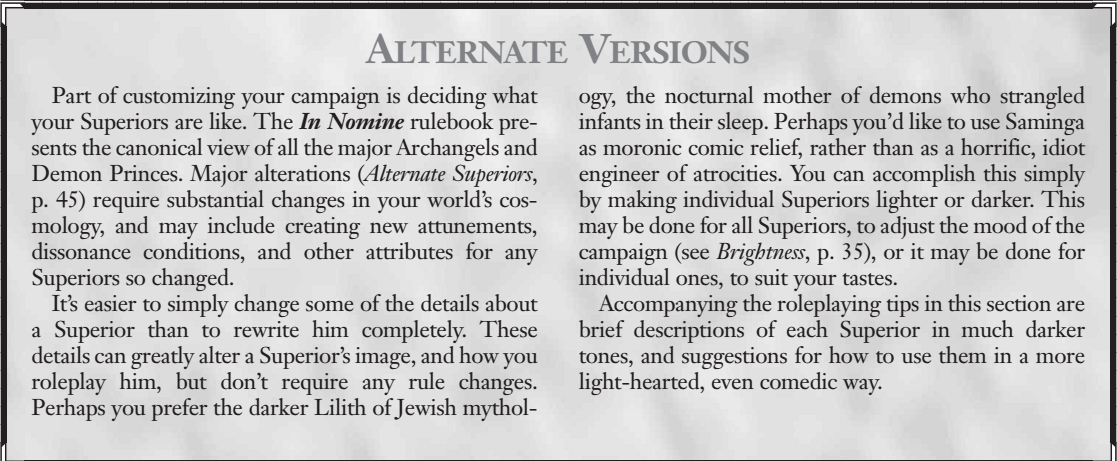
Blandine speaks softly and is always polite, if distant and distracted. She is weary at all times and, when given bad news, she has to take a moment to compose herself and regain her smile. A darker Blandine is less optomistic and does not smile at all. She is far more detached from both her angels and humanity. She lives in dreams, making them to comfort herself, and some of her angels fear she is withdrawing from the War entirely. She is a remote presence, sometimes beautiful but rarely comforting. Alternatively, her angels engage in brainwashing via dreams, 'reprogramming' humans in their sleep. A lighter Blandine is triumphant and regal. Even in the face of bad news, she offers comfort and optimism. Comically, she might dance around as a sort of Snow White-slash-Pollyanna, surrounded by flowers and bunnies and ponies.
David is slow and rumbling. He listens patiently to whatever his angels say, considers their words, then announces his decision. He brooks no discussion once this is done. His gestures are slow and deliberate. A darker David has no moral considerations - might is right. Demons are wrong because they are too individualistic. David feels contempt for them, for humanit, for many angels. He will accept any group - not just skinheads, but Nazis, terrorists or anyone who can combine violence and discipline. The War is about destroying the foe and surviving. A lighter David is a good-nature elder sibling. Comically, he might be a stereotypical musclebound idiot, and he sure does love to manifest naked.
Dominic is quiet when calm, but when angry or pronouncing judgment, his voice booms. He does not smile, and anyone he speaks to receives an unwavering stare. He never expresses doubt or anything less than utter certainty in his words. He pauses often, to give the guilty a chance to confess. A darker Dominic is not just sinister, but terrifying. His Inquisition is merciless and unchecked, killing anyone without remorse. God will know his own. A lighter Dominic cares more about justice and fairness, preferring reform to punishment, and will even express regret at conflict with other Archangels, though he will never admit to being wrong. Comically, Dominic is a Catholic school priest or nun, surrounded by jokes about what's beneath his robe. He takes himself deadly seriously, offering pompous sermons, but is feared only in the same way truancy cops might be.
Eli is casual and imperturbable. He hums a lot, taps his feet and so on. He interrupts people for irrelevant details, dismisses criticism and accusations easily and is friendly, never letting anything spoil his mood. A darker Eli is an irresponsible dropout pursuing his own entertainment over all else..or perhaps has decided to enter a phase of Destruction, seeking to tear down the world he has helped to build that it might be rebuilt. A lighter Eli is working on something big that he can't reveal just yet. For comedy, he's a celestial hippie preoccupied by simple pleasures, with a girl in every city. He gets drunk or high and leaves goofy artifacts in his wake.
Gabriel stares into space a lot, asks irrelevant questions, rants and raves or pronounces prophecy. She speaks in opaque metaphors of fire, and in her lucif moments, she is calm and even cynical, demanding accountability and holding her anger and pain in check only barely. A darker Gabriel is in danger of a Fall, too dangerous to get close to. She rants madly, leaves fire in her wake and is as dangerous to her angels as to demons. she has no restraint or balance. A lighter Gabriel is beautiful yet dangerous, her prophecies more likely to be useful riddles. Comically, she is a dominatrix, punishing cruelty very creatively. She is sultry and hot-tempered, and can also be a source of constant revelations from God, often irrelevant and unhelpful ones.
Janus is brusque, demanding and easily angered. He moves dramatically and his mood changes quickly. He will apologize later if he goes too far, and sulks when things go badly. A darker Janus is a pure chaos agent, sowing confusion in his wake. He is heartless, willing to steal from anyone, support any revolutionary. He is a raging, brutal and elemental force, alien to humanity, with any calm or rationality simply the eye of his storm. A lighter Janus is an antihero, a Robin Hood of Heaven. Comically, he is a soplifter and prankster, looking for funny ways to annoy demons and other Archangels, fond of motorcycles of all types.
Jean is curt, often seeming irritable and distracted. He listens attentively, but cuts people off when they waste his time. He tells what you need halfway through your explanation, and sometimes stares into space, then emerges full of energy and commands. A darker Jean is ruthless, unhesitant to do whatever will aid Heaven in his view. Killing ten to save a thousand is easy for him. Dark enough and the only difference between Jean and Vapula is that Jean is calmer, his labs cleaner and he makes fewer mistakes. A lighter Jean tries to ensure those around him operate at peak emotional status. He may play Vulcan but he has a few secret obsessions that can distract him, as well. For humor, his angels love technology - celestial cell phones, emails in Heaven, spam from Satan and Microsoft. They wield goofy, Buck Rogers devices that actually work.
Jordi is harsh, guttaral and bestial. His sentences shift between first, second and third person easily, and he prefers not to use words. A darker Jordi is fighting a war against humanity, tearing apart loggers, hunters, fishers and farmers. He could be anywhere, in any animal. A lighter Jordi doesn't really dislike humans, he just wants them to live in harmony iwth nature. Only abusers really anger him. A comedic Jordi behaves like an animal - a different one each time he appears. Even in human form, he and his angels rub against people, act like snakes, whatever. Comedy Jordi works to free animals from zoos, liberate house pets and so on.
Laurence likes to give speeches and lectures on virtue. He is confident and certain he will be obeyed. He improvised when needed, however. He does not wait for disagreement or idle questions, but is decisive, energetic and even a bit brash. A darker Laurence is a perfct, unyielding warrior, honorable but an absolute dictator. He does not listen, he just orders, and he will not hesitate to kill anyone who seems to collaborate with the enemy. A lighter Laurence is the perfect paladin, either noble and inspiring or Dudley D-right. He is coruageous, charitable, courteous. For comedy, he is also chaste and Lilim want to fuck him. He and his are nasty in a fight, but easily tricked, and they may all carry swords at all times.
Marc is calm and reasonable, never rude. He tries to see other points of view and tries to get others to see his. He doesn't argue - he talks, he negotiates, he's friendly. And he's calculating. A dark Marc is a mercenary, doing nothing for free. Everything has a price, and he's very Calvinist - those that prosper were gifted by God, and those who don't deserve to be poor. Poverty is a sign of immorality. He is the dark side of capitalism, bringing peace and prosperity to his followers but ignoring those who fall through the cracks. A lighter Marc cares more about fair distribution of wealth, especially among the poor and dispossessed. They urge the rich to moderation and generosity. For comedy, Marc loves fashion and brand names over all else, carry platinum cards everywhere and turn all his Tethers into banks.
Next time: More Superiors
"Leer at everyone."
Original SA post In Nomine Game Master's Guide: "Leer at everyone."Michael wastes no time and does not mince words. He belts out orders and shouts at failure. He is severe and cold, and sometimes weary. A darker Michael is very ruthless and violent, not above deception or dirty tricks despite never actually lying. He is bloodthirsty and willing to let the ends justify the means. A lighter Michael is optmistic. He's a stereotypical soldier, not too proud to have a beer with the men. He and his angels might be gungho and macho.
Novalis is always smiling, kind and polite. She always listens patiently, and she appreciates beauty around her. She calms people and hugs them if they need it. A darker novalis is a hopeless naive and cheerful angel, and her servants are either getting crushed or ruthless killers working to conceal the truth of the world from her. Alternatively, she's rather like Jordi, an amoral force of nature pruning the old and, perhaps, looking to wipe out humans. A lighteR Novalis is Mom. She promotes growth and healing and love. For comedy, she is an eternal hippie, saccharine sweet and prone to positive thinking and weaving flowers in the hair of demons. Yves is enigmatic, quiet and patient. He is never upset, but often distant. A darker Yves is...something beyond an angel, perhaps aware that all things are predestined and that the outcome is futile. A lighter Novalis is Heaven's grandpa, kind and practical. For humor, he may even be a bit senile.
Andrealphus is leering, hits on everyone, gropes everyone and never shows anger. He just smiles and punishes. A darker Andrealphus likes rape, torture, bestiality, pedophilia and necrophilia. He also enjoys perverting healthy impulses to wickedness, making sure everyone feels used and filthy. A lighter Andrealphus prefers cheerful playthings and takes good care of his pets. For comedy, he is a drooling hedonist or a mincing stereotype of a transvestite. BDSM, we are told, "can be horrifying or humorous."
Asmodeus stares at people, is rigid and relentlesly calm. He shuffles papers and his every word drips menace. A darker Asmodeus is Orwelling, with Nazi or Stalinist imagery, spreading parnaoia everywhere. Double agnets are behind every corner, and Asmodeus enjoys turning people against each other. A lighter Asmodeus is more about blackmail than torture. For comedy, they are the worst of every bureaucracy, fussy and inflexible but meticulous about the rules. They may be hellishly efficient or bumbling incompetents.
Baal snaps orders and knows they'll be obeyed. He kills the disobedient and inept, mostly NPCs, and he is never humble. He is grave and dignified except in anger. A darker Baal is deeply murderous and deeply competent. People die around him. He can't be negotiated with, and his demons fight to the end, for he scares them more than anyone. He is dangerously good at almost destroying the world. A lighter Baal has a twisted honor, and he and his sneer at killing those who are no challenge. They may even follow rules of war, unless it gets in the way of winning. For humor, they are military stereotypes of all kinds.
Beleth stares at people and bursts into horrible laughter for no good reason. She stares at walls and windows, murmurs commands and hisses threats. She is irritable and seems to hate everyone she talks to. A darker Beleth hates passionately and personally, dragging humans into terror by day or night. Her demons have no friends and feel nothing positive at all. A lighter Beleth is angry because she misses Blandine, and sometimes she broods rather than plotting or tries to make a twisted peace offering, later denied. A comic Beleth is a campy villainoius, in love with her own evil - she's a cartoon, or a fairy tale monster.
Belial is very cheerful, especially when setting things on fire. He is arrogant, sometimes gruff, but often pompous. He snarls when angry, and loses his temper explosively. A darker Belial is an engine of destruction, burning people alive often. He never works but in things that cause massive damage and death, and no one ever gets away unscathed. A lighter Belial is a buffoon, but a dangerous one. He and his are fond of grand schemes to blow things up, but can be tricked into blowing themselves up more often than not.
Haagenti makes horrible gross oises all the time, and is loud and abrasive. Little of what he says makes sense but brief commands, but he remembers everything. A darker Haagenti is a grotesque abomination, a bloody maw and a stomach. He loves dismemberment and dissatisfaction, and he and his devour humans alive. A lighter Haagenti is the dimmer half of a comedy duo, full of crude jokes and pratfalls.
Kobal is a mocking joker, fond of interrupting people and telling long stories. He never passes up a chance to insult someone, and smirks no matte what he's told. He is very sarcastic. A darker Kobal is a malicious bully, a genius at hurting others. He and is are sociopaths who enjoy pain as humor, but only when it hurts people or destroys lives. A lighter Kobal is a clown. His pranks may be cruel, but they're rarely dangerous, and he's often written off as a lightweight.
Kronos is quiet, calm and impassive, showing anger only in his eyes. He has a deep and patient voice. A darker Kronos hates with a deep intensity, a monster in the form of a grumpy old man. He does not rant or smash things, but everyone he meets has a worse life after. His demons leave a trail of ruined lives, and they are hard to stop. A lighter Kronos over-reaches fairly often. His bureaucracy is a hindrance to his own demons, and while they are grim and humorless, they are excellent straight men. For humor, Kronos may be a foul-tempered old goat, possibly senile.
Lilith is gracious, elegant and condescending. She hides her disdain only when she wants something. She plays with jewelery when people speak, as if bored, and is much colder and less polite when angry. She flirts with people, and is very good at it. A darker Lilith is a creature of the night who despies humans, particularly children. She is petty, vain and self-serving, having chosen to betray humanity to side with Lucifer. Her children are pure commodities. A lighter Lilith is the best Redemption candidate of the Princes. She is as happy to see her Word serve good as evil. A comic Lilith is "the ultimate femme fatale, or a campy uber-feminist." She has sduced many demons and angels, but is so self-absorbed and frivolous that she gets left out of most politics. If she's an airhead, she is still very frustrating to deal with.
Malphas is always polite, attentive and friendly. A darker Malphas, however, turns all warm relationships into tragedies, turning friends into bitter foes. All relatonships are delicate, fragile toys to be torn apart, and riot and genocide are hobbies. A lighter Malphas is an argumentative troublemaker, always ready to voice an opinion. His demons are belligerent and unstable, starting fights for no reason, but they're more annoying than anything else.
Nybass is a grinnic, manic person, full of buzzwords and aphorisms. He rushes about at all times, and his grin falters only when hearing bad news. He shoots hte messenger then, to. A darker Nybbas is a master of brainwashing, able to spy from every media outlet and put propaganda everywhere. A lighter Nybbas isn't very threatening - he just wants attention and applause. For humor, all of his schemes are just about increasing market share, and his demons are all stereotypes, speaking in cliches and unable to tell fantasy from reality.
Saminga is a ranting madman, cackling and melodramatic. He'd be a parody of himself if he didn't take it all so seriously, and he has no idea how idiotic he apepars. He knows everyone is out to get him, and he watches for disloyalty hawkishly. A darker Saminga is even more competent than normal, racking up massive and horrific body counts. He may be stupid, but he's vastly powerful - or maybe he's actually quite smart, hiding behind a facade. A lighter Saminga is...well, a campy villain, but not a competent one. Alternatively, he focuses more on death-traps than simple murder.
Valefor is suave, debonair and rakishly elegant, but malicious. He is buddies...until you screw up. Then you suffer. A darker Valefor never steals anything that isn't important to someone, but takes everything of that nature that he can. A lighter Valefor is just a kleptomaniac, a cool and flashy demon that doesn't directly hurt others - he just takes things. He's more interested in fast cars and hot women than in serving Hell.
Vapula is a note-taking, self-absorbed scientist. He is easily distracted and impatient, especially when he gets some new idea. And he's an Archangel, as he'll tell you. A darker Vapula loves vivisection and mutation as well as contagious disease. He's the ultimate mad scientist, and he loves causing pain. A lighter Vapula cares more about experimetns than the War, and he's rather harmless when distracted. For comedy, he's an absent-minded lunatic, mumbling nonsense when not ranting or throwing things. His labs are known to explode and he's used to failure. He and his make machines reliable only in their creative malfunctions.
God! God is not an NPC. God is the ultimate power and should never manifest physically or communicate directly. He may not even be capable of doing so meaninguflly. Supposedly, there was a time when the angels spoke to God via the Metatron, and it is believed that Yves can still talk to God directly. And Gabriel periodically channels information from God. But angels can't talk to Him easily. You may be tempted to have God make announcements as from the burning bush, but save it for extremely important occasions. God doesn't talk much in the Bible, and in the Quran he uses an intermediary. He's not a micromanager. Be careful, lest God come off less as an ineffable presence more as a meddling principal. Always have God speak rarely and off stage. Prophets, as an ote, do receive revelations from God, but their communications are not in the form of a personal dialogue.
Yes, God does interven directly sometimes. He gave out Words for a while, he recalled Uriel and appointed Laurence. He may have caused the birth of Christ and various miracles, but many are skeptical about that. Still, if there is a single entity called God, He does meddle rarely. If there isn't, figure out what causes Divine Interventions. Still, God's direct and obvious intervention is rarer than even His speech. Having God interfere too much diminishes the PCs and everyone else. After all, if God does thing on a whim, what's the point? His presenca can be felt, but should always be ineffable and unclear.
So how to recocnile that with a Divine Intervention? Well, just because His presence is there doesn't mean He's orchestrating every little thing. Even in a campaign with an active God, a Divine Intervention might be seen as merely the reflection of His will, as the Symphony resonates with His mind. A more remote deity might cause the Symphony to react as per laid out patterns since creation - a reflex action triggered by ineffable stimuli, even if God does not exist. And perhaps Interventions instead rise from ineffable beings of the Higher Heavens, or from the Archangels, which might allow for customized Interventions depending on which is handling it.
God's personality is largely up to you. A dark and malevolent God is not personal at all - good fortune might come from Interventions, but never messages or spiritual meaning. There may even be negative side effects - a demon chasing you is hite by a car, killing the demon and everyone in the car. Divine Interventions never help demons - no spontaneous redemptions or foiling of Pricnes in pursuit. They tend instead to be arbitrary and unpleasant, reinforcing demonic views that God is out to get them. A lighter God's interventions are good. They are always positive, except for the selfish, and even then, they'll foil schemes but not hurt people. God doesn't punish - he just remins you you're on the wrong side. For comedy, God might actually get personally involved, but that's if you want to go all really, really silly.
Next time: Hey There, Nice To Meet You, Can You Guess My Name
Shout at the Devil
Original SA post In Nomine Game Master's Guide: Shout at the Devilunlike God, Lucifer is active and interested in the day to day. He is an NPC, but also one to use sparingly given his power. He is an enigmatic figure, rare and dreaded. The average demon will not expect to meet Lucifer any more than the average American expects to meet the President. PCs are not average, but even they should be awed by Lucifer and fear him. His appearances should either be very important, or unexpected cameos that fit his sense of humor. Even that should be infrequent, and make them worry about why Lucifer was there. Unlike God, Lucifer's personality is well-defined, and most Superiors are familiar with it. Even the low demons have heard about Lucifer's demeanor and sense of humor. But he is not predictable - while he may be known, no one understands him.
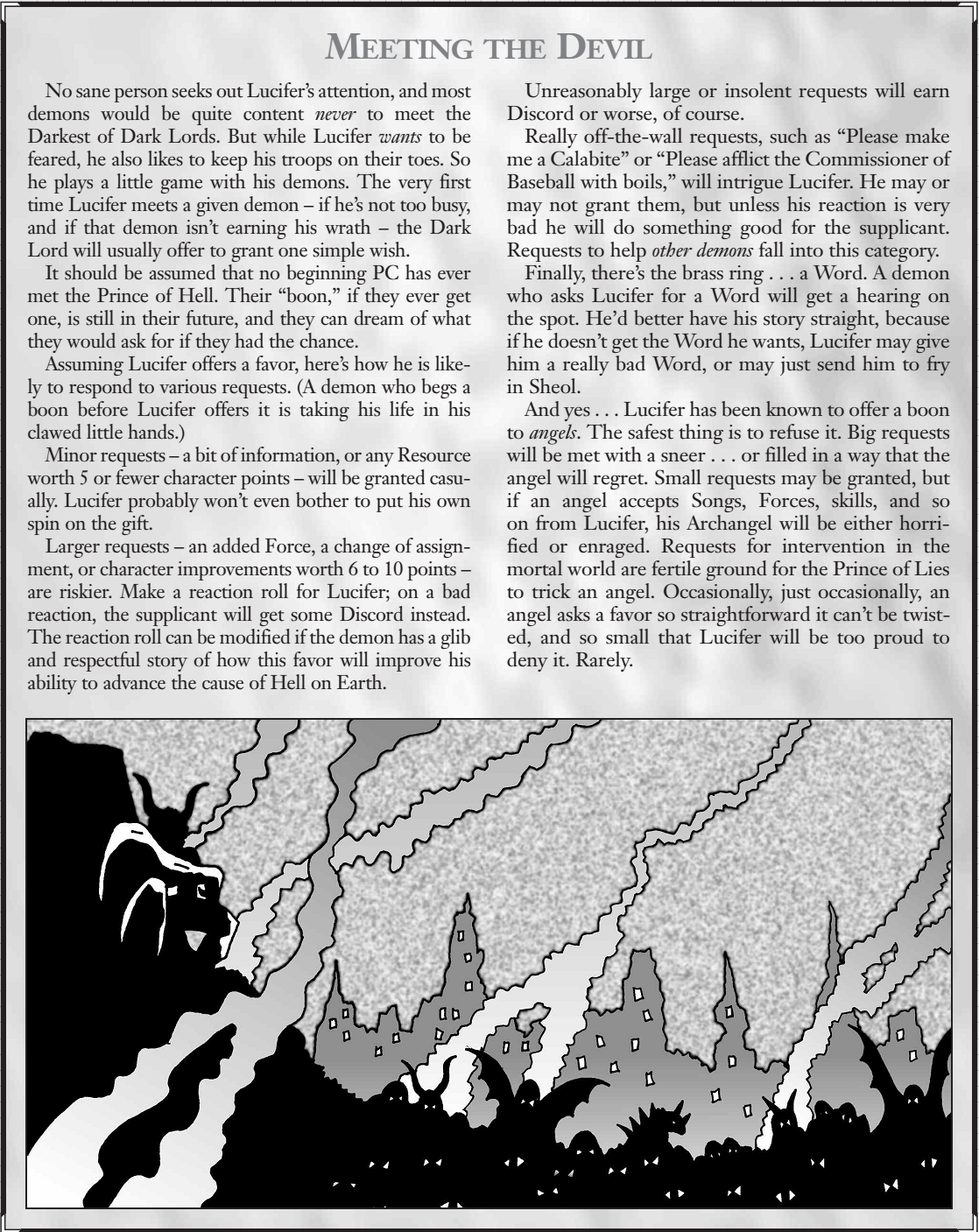
Lucifer has certain traits that should be constant no matter how you portray him. First: he is proud. More proud than anything. He can laugh, but not at himself. He can admit defeat, even graciously, but never humbly. And he always gets revenge. Lucifer suffers no offenses to his dignity, and lack of respect will earn his hatred. Some things he can overlook, but disrespect is not one of them, and nor is wasting his time. This dignity also extends to style. Lucifer does not rant or rave, he does not boast or threaten openly. He hates brute force. He enforces his will while appearing to be a mere bystander. Lucifer likes to present himself as reasonable and personable, to better disarm foes and seduce neutral parties. He rarely uses obvious powers, preferring to make things happen by chance or intermediaries. If he smites someone in a pillar of flame, he is in an exceptionally poor mood. Few have seen him show anger, and fewer survived.
Lucifer is exceptionally devious and manipulative. He always has three or more reasons for anything, and for each real reason he has dozen explanations to tell others. He never allows his true motives to be known until it's too late. The GM is told to just change the rules whenever hte PCs seem to think they know what Lucifer is up to - it's unfair, but Lucifer's not fair. However, he does have a sense of humor. It's a cruel one, a malicious one, and that's why Kobal has such a high position. Lucifer laughs at hypocrisy and lies, and he loves any joke that reveals others for fools. He especially enjoys those that reveal the darkness in humanity. One of the few ways to get out of trouble with him is to make him laugh - but it's no guarantee. And remember laugh with, not at.
Lucifer can come across as a nice guy, but he never is. It's all an act. He may occasionally be benevolent, but only for his own benfit. If he is kind, it is because he needs you somehow. If he does you a favor, there's something in it for him. Barring a variant game, Lucifer is evil . He may be entertaining, stylish and even sympathetic, but he's evil. Not just in the sense of being selfish, either. He's in active rebellion against God, he wants to see God and all His work ruined. He wants to drag the Symphony to its Fate, an eternity of suffering, damnation and erventual oblivion. He is an enemy of all humanity and all angels, and he wants nothing good for Hell, either. Lucifer's evil isn't bloody malice or self-gratifying spite or even suffering for its own sake. Lucifer is a pure, impersonal and final evil, the antithesis of all that is good and right. He may seem less nasty, but he sponsors all the Princes because they contribute to his final solution for the Symphony. He is all the evil in Hell and more.
To make him darker, downplay all the sociable parts of him. When he shows p, bad things happen. When a mass murderer goes free on a technicality, Lucifer is there. When an innocent woman's children are taken from her and given to a molestor, Lucifer is there. When soldiers herd peasants into a mass grave, Lucifer is there. Where suffering and preying on others is a way of life, there is Lucifer. Every conversation shows his malevolence. He sneers, he laughs at suffering, and any deal with him always ends in damnation.
A lighter and more sympathetic devil may be doing what he was designed for. If all is preordained, so was the Rebellion, and Lucifer is just serving God's purpose. Muslims hold that the devil is banned from Heaven as punishment, forbidden to look on the face of the God he loves over all others. This doesn't mean Lucifer needs to be nice - just more compledx, more human. A campier Lucifer is a politician, gladhanding demons or playing chess with God.
Infernal interventions indicate Lucifer's meddling, but it may not be personal interest. Lucifer lacks God's omnipotence, but his influence is pervasive. He has great foresight and can manipulate the Symphony in more complex and subtle ways than anyone that isn't God. It's possible that Interventions happen just because Lucifer would want them to, without knowing about the situation. As a general rule, PCs should never know if Lucifer is directly aiding them. He likes to be unpredictable, after all. Some interventions might even be from a Prince, not Lucifer.
Lucifer isn't God - though he also claims God isn't God. Lucifer may outpower all other Superiors, but he remains finite. However, no one is entirely sure what Lucifer's limits are. He likes to keep people guessing. It's best not to say he can't do things, but just that he has never been known to do something. Lucifer's limits are defined largely by what he's been seen to do and speculation about what he hasn't. If there's a power he may or may not have, only he knows the truth. That said, the following are all believed impossible even for Lucifer. If he could do them, it'd be a huge impact on the War.
First, Lucifer can't exert unlimited power. He has a lot emore Essence than anyoen else, but he still has to use it to inflict his iwll on the Symphony. Thus, he probably can't destroy the Earth or casually obliterate a Superior - though it would take him little effort to destroy all but the mightiest of his peers. Sure, Michael beat him at the Rebellion, but he might not win a rematch. Second, Lucifer cannot steal souls from Heaven or dictate a soul's Fate. Lucifer is believed to be able to do whatever he wants with the damned, and he might be able to force people to reincarnate, disband or go to the Marches on death...but he has no claim over any soul that has achieved its destiny, and he cannot force someone to damn themselves any more than any demon can. Third, while Lucifer can inflict or remove dissonance and Discord from any demon at will, he cannot do this to angels without their consent. Fourth, Lucifer is not known to alter anything's fundamental nature, save Lilith, and even then, only he knows what really got done to her. It is believed that Lucifer might be able to return a damned soul to Earth as a mortal or restore an undead's soul, or give life to the inanimate, but then again, it might be trickery or just temporary. Still, he almost certainly cannot turn a human into a demon or vice versa, or anything of that nature. It's believed that if he did, he might spark a Second Rebellion in Hell, which may be why Lilith remains unique. Lucifer cannot create Tethers - he must rely on humans to do it like anyone else. He can make conditions that will probably lead to Tether formation, but that's about it. And Lucifer cannot transcend the ineffable, probably. He is himself ineffable, as is what he does and does not know, so nothing is quite sure.
Now, what if you want to be a Superior? It's beyond the scope of most games, but players will inevitably ask how it's done. The usual way is to hold a Word that becomes so powerful that your side is compelled to either elevate you or kill you. Only the Council or Lucifer can make someone a Superior - or so they claim. It's rumored that some celestials have transcended their nature on their own and were recognized retroactively. Becoming a Superior is a huge leap in status, allowing you to function on a level out of the reach of lessers. All of their powers rely on this state-change. While you must have a Word to become a Superior, that Word does not strictly need to be powerful - but a weak Word will take much, much more power to elevate, so it is just...not done.
Most Archangels have held their rank since before the Fall and were elevated by God. God can make anyone He likes into an Archangel, but Laurence is His only personal promotion since the Fall, and all other new Archangels have been elevated by the Council. For them to name you worthy, you must have a Word indispensable to the War and have enough power and influence to be indispensable to Heaven yourself. Even then, many potent angels do not want to be a Superior. The Council will only elevate those they agree would be more effective operating independently of their own Archangel and with servants of their own. Those who aspire to the rank must first divest themselves of any unseemly pride. If they are humble enough but still have the drive to make their Word a fundamental part of the War, their service must be beyond exemplary and their own Superior must offer their backing. Any problems with Judgment in the past may also bar the way. These angels tend to be of Master rank or beyond, with extremely potent Words, and already involved in the day-to-day planning of the War with their Archangel. They will have been long since retired from active adventuring.
Only Lucifer can crown a Prince, and while he can do so at will, he only does it with good reaosn. It takes a lot of energy, evne for him, and he won't do it casually. Plus, each new Princes changes the power balance. While Lucifer generally prefers quantity to quality, too many Princes would strain his resources and spread Hell too thin. The infighting between Princes, however, does keep him in power, so he sometimes crowns a Prince to add to it. But too much division weakens Hell to the point that even Baal and Asmodeus can't act coherently, so not too ften. Thus, while the Princes have tended to outnumber and be weaker than the Archangels, it's still a high and mighty station. Lucifer chooses Princes based on political advantage and strategic value. If a Prince will make other Princes not fuck with Lucifer's plans, that's good. If they'll enhance Hell's place in the War, that's also good. Most Princes raised since the Fall had to reach positions of power and influence before they were crowned. Some have been potent servants, but some, like Haagenti, rose from nothing, while others, like Nybbas or Furfur, managed only one audacious feat in order to impress Lucifer. Lucifer also believes in evolution in action - more Princes have died than live right now. You'd better be able to hold your own.
From here, we get optional rules, few of which are interesting. Expanding the power of free will weakens demons a lot, though. Kyriotates become able to possess only the willing, who must know and acquisce to it - even Saints ot the Undead. The GM can rule that in some circumstances, a mortal will accept possession subconsciously, such as when they pray for divine assistance. If a human would agree if they had full knowledge, the Kyriotate may possess them. Animals may or may not be considered fre willed this way at the GM's option. Celestials can be possessed as normal. Balseraphs cannot compel people to believe them - instead, they add the CD of their resonance roll to the TN or CD (pick one) of a Lying roll. Their dissonance is now caused by having their lie exposed in their presence. Habbalah can inflict feelings but not compel any action the target would not normally do under that feeling. Lilim can sense Needs normally, but the victim must consent before a Geas can be claimed, with the level of knowledge and consent required left to the GM. Shedim do not control their hosts, but only suggest actions ot them, requiring them to be much, much more clever about their corruption. The GM can optionally not require them to perform a worse act each day, or prevent the daily bonus to the victim's Perception roll. Impudites no longer charm people - instead, their resonance acts as a bonus to the TN of their reaction rolls. However, they may drain Essence from anyone the GM rules is favorably disposed towards them.
The only other really interesting rule is perverting resonance. Any angel can choose to use the resonance of their diabolical counterpart (except Malakim, who do not have one). However, doing so causes a point of dissonance which cannot be converted to Discord. The GM may even inflict 2 or more dissonance for it, or rule that only a Superior may remove the dissonance.
The End!
Next up: Corporeal Player's Guide, Liber Canticorum or Revelations 1: Night Music?